









We are humbled and blessed to receive this prestigious award. It is such an honor to serve and collaborate with various charitable organizations in Arkansas. Thank you to our employees who volunteered their time to make this possible.




What does it mean to be taken care of? At Arkansas Blue Cross and Blue Shield, it means providing peace of mind. We've been taking care of Arkansans for over 75 years, providing affordable, reliable health insurance … to keep your employees healthy and help them heal. We're investing in your communities to keep this diverse and wonderful state strong. And looking out for your physical, emotional and social health, connecting you with resources, and helping you navigate the healthcare system — so your organization's employees and the ones they love can live their best life, their whole life long. Take good care, Arkansas.



We’re committed to serving our customers across the state with unmatched expertise, innovation and service. Our new office space in northwest Arkansas is helping us do just that. We appreciate you recognizing us as a leader in commercial comfort as we continue our mission of “Creating Customers for Life.”

As a firm built on relationships, our handshake matters. It means a warm greeting, the privilege of doing business together and knowing you can count on us.
Our performance builds relationships with our clients, many of whom have become old friends. It’s why shaking hands with us means just a little bit more.








Commercial prospects are steady in central Arkansas as the northwest corner of the state continues to deal with unprecedented growth.
Kris Upton has taken the reins at Little Rock real estate firm RPM Group. Upton hopes to bring a singular vision to one of the state’s iconic firms.
From the Port of Little Rock to industrial parks from Springdale to West Memphis, cities are in the business of providing available land for manufacturing.

Tornado frequency aside, there is at least one inevitability that every consumer will need to account for sooner or later — the end of life.
Monica Treat is on a mission to help seniors untangle the Gordian Knot of Medicare. As owner of Treat Insurance Agency, Treat tackles the daunting landscape.
In this special section, get to know many of the state’s most admired businesses in a variety of industries, as voted by readers, from banking to steel.
Eric Mateos, the new boss Hog of the trenches in Fayetteville, plans to flip the script when it comes to the Razorbacks’ offensive line in 2024.

Whether a person already occupies the corner office — or is well on their way there — Mercedes-Benz announces one’s presence like no other auto on earth.

Bill Sowell of Sowell Management in North Little Rock grew his firm into one of the nation’s top RIAs by prioritizing fairness and honesty.
PRESIDENT & PUBLISHER
Heather Baker | hbaker@armoneyandpolitics.com
EDITOR-IN-CHIEF
Dwain Hebda | dwain@armoneyandpolitics.com
SENIOR EDITOR
Mark Carter | mcarter@armoneyandpolitics.com
ASSOCIATE EDITORS
Sarah Coleman | scoleman@armoneyandpolitics.com
Mak Millard | mmillard@armoneyandpolitics.com
EDITORIAL COORDINATOR
Darlene Hebda | darlene@armoneyandpolitics.com
STAFF WRITERS
Sarah DeClerk | sdeclerk@armoneyandpolitics.com
Lance Brownfield | lbrownfield@armoneyandpolitics.com
MANAGING DIGITAL EDITOR
Kellie McAnulty | kmcanulty@armoneyandpolitics.com
ONLINE WRITER
Kilee Hall | khall@armoneyandpolitics.com
PRODUCTION MANAGER
Mike Bedgood | mbedgood@armoneyandpolitics.com
GRAPHIC DESIGNERS
Lora Puls | lpuls@armoneyandpolitics.com
Jenna Kelley | jkelley@armoneyandpolitics.com
SENIOR ACCOUNT EXECUTIVE
Greg Churan | gchuran@armoneyandpolitics.com
ACCOUNT EXECUTIVES
Michelle Daugherty | michelle@armoneyandpolitics.com
Mary Funderburg | mary@armoneyandpolitics.com
Karen Holderfield | kholderfield@armoneyandpolitics.com
Jona Parker | jona@armoneyandpolitics.com
Lucie Pathmann | lucie@armoneyandpolitics.com
Dana Rodriguez | dana@armoneyandpolitics.com
EXECUTIVE ASSISTANT
Jessica Everson | jeverson@armoneyandpolitics.com
ADVERTISING COORDINATOR
Allison Runyon | ads@armoneyandpolitics.com
CIRCULATION
circulation@armoneyandpolitics.com
ADMINISTRATION
billing@armoneyandpolitics.com
CEO | Vicki Vowell
TO ADVERTISE call 501-244-9700
email hbaker@ armoneyandpolitics.com
TO SUBSCRIBE armoneyandpolitics.com/subscribe
CONTRIBUTORS
Meredith Mashburn, Hope Wright, Chris Davis, Kenneth Heard, Paul Sage, Steve Wilcox, Randy Zook


The new master plan for downtown Little Rock sets a bold vision for the heart of the capital city. Read more as part of AMP’s real estate focus in this issue.
See story on page 14.
(Cover image courtesy of Downtown Little Rock Partnership)
ASBTDC WELCOMES FUENTES, WILLIAMSON, NORWOOD Congratulations!! So proud of you Adriana Archila!
Eve Geiggar
ANONYMOUS $900K DONATION TO FUND ARKANSAS’ FIRST YOUTH SHELTER
Thank you to the kind and generous person who chose a WONDERFUL organizationmay you be blessed and all of the people at this shelter, too!
Cathy Cahan Alexander
SETTING THE VISION: SARACEN EXECUTIVE CHEF’S GOAL IS TO CREATE THE BEST DINING EXPERIENCE IN THE SOUTH
Wonderful article. Manley is the best!
Cathy Brokate Kincaid
MACK’S PRAIRIE WINGS AND BASS PRO SHOPS UNITE
I’ve always enjoyed going to Mack’s and have spent a lot of money there. It’s been kind of my go to place for hunting equipment and gifts and gift cards for my boys. I live about an hour from there. I’m not knocking Bass Pro, but I hope it keeps the small-town atmosphere. Chuck speaks every time I see him. We are not really acquainted but have been doing business for years! I hope it stays the same.
Jeff Carnathan
ASSOCIATION OF BLACK CARDIOLOGISTS NAMES FLETCHER AS PRESIDENT
Very genuine and kind man.
Eyad Abochale
GENERATIONAL BUSINESSES: FAMILY BEHIND EDWARDS FOOD GIANT STICKS TO SUCCESSFUL FORMULA
Such a great family-owned business with a true heart for the community!
Sarah Snyder Riffle
May 6 — June 2
1 Mack’s Prairie Wings and Bass Pro Shops Unite
2 Lyon College Announces Locations of Vet, Dental Schools
3 Anonymous $900k Donation to Fund Arkansas’ First Youth Shelter
4 Report: Little Rock is No. 1 Move-to City in Arkansas and No. 12 Nationally in 2024 5 ALDI West Little Rock
6 Searcy Makes Top 10 in Fastest Growing Arkansas Cities
7 Wet? Dry? Sunday Sales? A Look at Arkansas’ Disparate Alcohol Laws
8 Arkansas Preps for Noisy Symphony of Cicadas
9 Hot Springs Harnesses Lake Ouachita to Shore Up Water Supply
10 Travelers Announce Sale to Diamond Baseball Holdings

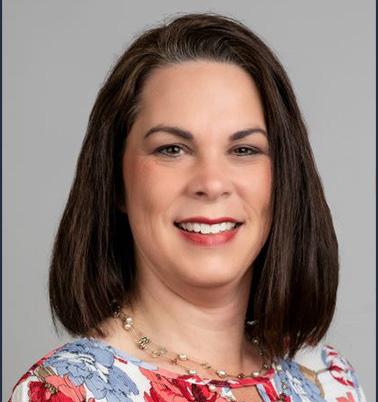
of Arkansas, Oklahoma
Texas
By Mark Carter
When it comes to the NCAA’s cherished veil of amateurism, the horse left the barn a long time ago, long before NIL reared its head. In fact, said horse is out of the pen entirely and across the back 40.
Caps need to be placed on NIL payments and transfer opportunities, obviously, and those things are coming — I think. In fact, by the time this issue of Arkansas Money & Politics hits the streets, the SEC and Big Ten conferences will likely have joined in on the latest NCAA settlement that enables Power 4 schools to directly compensate players.

What intrigues me most about the evolving college sports landscape, though, is not the necessary fixes to NIL and the portal. The possibility — dare I say eventuality — of two super conferences emerging from the current chaos with 24, 28 or maybe even 32 teams in each, that’s what butters my biscuit.
Not only would proposed “super leagues” address the absurdity of schools such as Georgia and Ohio State playing at the same level and for the same prize with, say, Georgia Southern or Bowling Green, but such a scenario would also bring back some geographic sense and restore some of the nostalgia that helps make college football the greatest sport ever played.
In April, The Athletic published a leaked proposal from a group made up of pro sports owners, executives and college administrators that would create a breakaway division in college football made up of the 70 top programs. The group dubbed itself College Sports Tomorrow and includes NFL, NBA and NHL owners, an NFL executive and the chancellor of current ACC member Syracuse.
Real estate and insurance are the industry focuses in the June issue of Arkansas Money & Politics, and they represent two of the most important business sectors that impact our daily lives.
Inside, our staff looks at commercial real estate and where the state’s major areas of growth are located, as well as residential and industrial growth, and as you may have guessed by the cover, we take a look at the new master plan for downtown Little Rock.
Over on the insurance side, there is so much to consider, whether your ownership status entails a business, house or an automobile. Stories this month will consider long-term care and life insurance, what’s covered in a typical residential policy, and even coverage for business owners.
Its proposal would structure the college sport’s top teams into seven geographically based 10-team divisions while adding an eighth 10-team division made up of the best of the rest. A relegation and promotion system like that used in the English Premier League would determine the members of the holdover division. The proposal would address the concerns listed above but also satiate America’s almost unhinged obsession with the underdog by giving each season’s relegation division winner a shot at the big boys in the playoff, which might include division winners only or division winners and a certain number of wildcards.
The proposed divisions would place the Razorbacks in the Southwest Division and make Arkansans of a certain age feel right at home. Joining the Hogs would be the burnt orange horde, the cult of Aggie, Texas Tech, Baylor, Houston, SMU, TCU, and Oklahoma and Okie State. The West Division would revive the old Pac 10 and the remaining divisions would splinter existing SEC, ACC and Big Ten teams into a geographic puzzle board.
The relegation division, determined based on 2023 on-field results, would look like this for 2024: Boise State, James Madison, Liberty, Miami of Ohio, New Mexico State, Toledo, Troy, Tulane, UNLV and UTSA.
Perfect? Of course not, but it’s better than what we have now or what likely lies in wait. The layout could look a lot worse.
In 10 years, the highest level of college football will look something like this or like the NFL with the SEC and Big Ten, each with four divisions of seven or eight teams playing the roles of the AFC and NFC. Bring it on.
Despite being currently mired in the program’s worst-ever run, Razorback football still ranks in the top 20 for revenue produced and attendance. As Hog fans have come to know all too well, however, top 20 nationally usually translates to top 12 in the SEC.
By Heather Baker

Heather Baker
Those topics are all important aspects of our lives and address important subjects.
Also inside, we’ll speak with the newly elected speaker of the Arkansas House, Brian Evans of Cabot, visit some of the state’s top marinas and celebrate our annual “Most Admired Companies” as voted by AMP readers.
Plus, in our monthly “Digs of the Deal” series, the spotlight is on Hot Springs’ Majestic Park and its role in the history of Major League Baseball’s spring training. The legendary Babe Ruth began his journey to becoming the cultural icon known today as “the Babe” in Hot Springs more than 100 years ago.
There’s a lot to absorb and enjoy in the first summer issue. As always, AMP strives to be hot, hot, hot. Thank you for reading. As always, reach out to me with any comments or suggestions at HBaker@armoneyandpolitics.com.
By Hope Wright
Since 2020, real estate prices, mortgage interest rates and competition among buyers have increased, significantly impacting younger homebuyers. As a result, prospective buyers often feel increasingly uncertain in today’s housing landscape.
According to Bank of America’s new Homebuyer Insights report, 57 percent of prospective and current homeowners are unsure whether it’s a good time to buy, compared to 48 percent last year. This trend is even more prevalent among first-time homebuyers, and 62 percent shared that they are unsure whether or not to buy.
Here are some of my most frequently asked questions that can help first-time home buyers feel more prepared and confident.
How does a good credit score help in the home-buying process?
Boosting your credit score before buying a home can help you get a lower interest rate when it’s time to buy. A high credit score indicates lower risk to the lender and reassures lenders that they will be paid back. It’s important to avoid late payments and maintain a low credit utilization ratio to demonstrate responsible credit habits. Your credit score can change every month, and even a slight increase can help when applying for a mortgage.
How much can I comfortably afford? Should I borrow more?
Many buyers begin the process by asking themselves, “How much could I borrow?” Prospective buyers should really be asking themselves, “How much should I borrow?” A general rule of thumb is multiplying your monthly income before taxes by 28 percent. The resulting dollar amount is typically how much a manageable monthly payment might be, including taxes, insurance and private mortgage insurance. I recommend using an online affordability calculator to do the math.
Are there other programs or options available to help me afford to buy?
Yes. Many people overlook first-time homebuyer loan and grant programs when shopping for their first homes, but grants can help make homeownership more affordable.
For example, as part of Bank of America’s Community Homeownership Commitment, qualified buyers can receive up to $7,500 to cover closing costs through America’s Home Grant.
Do you know your actual budget?
It’s important to review your monthly expenses compared to your net monthly income. Are you comfortable with adding a mortgage payment? If you need more room in your budget to save, it’s helpful to separate your expenses into “need-to-have” and “nice-to-have” categories. Keep track of where your money goes each month and balance your budget.

Have you shopped till you dropped?
Finding and trusting the right partners to help you navigate the home-buying process will make a significant difference in your experience and could save you money. Do your research by shopping around for different mortgage rates. This is the most effective way to understand the potential costs associated with a mortgage. If you like one lender, but its offer is missing something you saw in another offer, communicate that. In many cases, lenders are eager to earn your business and may be willing to work with you.
Will renting have a long-term impact on me financially?
Knowing when and how to buy a home in the current market can feel like an insurmountable challenge. Between a new report that found renting is cheaper than buying a home in the 50 largest metros and the long-held belief that building equity through homeownership is important for accumulating wealth, both renting and buying a home can be appealing options, depending on your circumstances. Buying a home is an inherently personal decision. Prospective buyers must weigh their financial situation, current interest rates and the competitiveness of the housing market.
While renting might be the best choice for you right now, if you are interested in buying a home within the next few years, it is important to prepare your finances and put yourself in a stronger position.
What are your top tips for preparing to buy a house?
• Prioritize your credit score. A higher credit score can make it easier to get a loan or borrow at more favorable rates. Consumers are entitled to one free credit report a month, so be sure to check your credit report regularly and promptly correct any inaccuracies.
• Save, save, save. Having cash ready can help you tackle down payments, maintenance costs and any unexpected expenses when buying a home.
• Minimize debt. Target one debt at a time (highest-interest debt first), always make at least the minimum payment on your credit cards and loans and consolidate debts when possible.
While buying a home can be daunting, the most important thing you can do is to start early and familiarize yourself with the process. Taking stock of where you are financially, understanding your budget and getting a sense of what that budget can buy can prepare you to take that next step when the time is right.
Hope Wright is a credit solutions advisor in Bank of America’s consumer and small banking division. Based in Little Rock, she serves households across the region by providing home mortgages and other financial solutions.
At the Arkansas Game and Fish Commission, our mission is to protect and enhance our state’s natural wonders. However, our state is vast, and only 10% of it is public land that we can manage. This is why our partnerships with landowners are key to conservation and wildlife management in Arkansas.
If you’re a landowner, we offer numerous programs to help you get the most out of your land’s unique resources, including ways to:
• Benefit migrating waterfowl
• Provide additional cover and food on your forestland
• Improve your streams
• Provide fishing opportunities for the public
• Control feral hogs and invasive plant species
With your help, we can keep The Natural State, natural. And we want to reward you for your efforts with a payment of up to $10,000.




By Randy Zook
What are the most pressing concerns for businesses? The Arkansas State Chamber of Commerce and the Associated Industries of Arkansas surveyed members last year and asked them to rank their top concerns among 12 pressing issues that affect their ability to do business in Arkansas — issues such as overregulation, housing availability, rising inflation and supply chain challenges.
Unsurprisingly, members ranked workforce availability as their top challenge. That’s no shock, considering employers in every industry in the nation face significant hurdles when filling job vacancies.
Workforce is clearly top of mind for our members, and according to those who participated in the survey, child care is, well, not. When asked about issues that affect their ability to do business in the state, our members collectively ranked child care as the least pressing challenge they face compared to the other issues listed.
Like it or not, though, child care is among the most pressing challenges for their employees.
Almost three-quarters of working parents report that access to childcare is a challenge. According to a 2021 report by the U.S. Chamber of Commerce Foundation, the absence of dependable child care options keeps parents from entering the workforce. Plus, parents who are in the workforce often reduce their working hours or leave the labor force altogether because they cannot find affordable care for their kids. The loss of working parents from the pool of potential employees carries huge implications for the economic well-being of our state, and employers are among those who are most impacted by the loss.
Home Office. To help their employees, Walmart opened Little Squiggles Children’s Enrichment Center, a child care center on the company’s new campus in Bentonville, in May.
That plan is a great solution for Walmart and its team, but it’s not a realistic option for many other employers in the state. Most Arkansas employers aren’t in a position to build child care facilities for their employees, nor should employers feel that they need to personally provide child care in order to get quality labor force offerings.
Although it should not be incumbent on employers to provide child care for their employees, employers should be attentive to and supportive of improving child care availability within their region when they can.

I’ve seen businesses band together to brainstorm solutions within their communities and industry leaders collaborate with nonprofits and public entities to move the needle. Excel by Eight recently formed a business coalition to tackle child care availability. The coalition includes more than 50 businesses, nonprofit organizations and chambers of commerce, including the Arkansas State Chamber of Commerce and Associated Industries of Arkansas. There’s no one-size-fits-all solution. Any good-faith effort to support employees who are parents will not only earn employers the admiration of their communities but will also help them create sustainable models for future growth and success.
According to the report, 34 percent of the working parents surveyed said that they or someone in their household had recently left a job, not taken a job or changed jobs because of problems with child, and 76 percent of the respondents said they had recently missed work due to unreliable child care. That’s not to mention that child care issues cost Arkansas’ economy an estimated $865 million a year — a cost often absorbed by employers.
Some Arkansas employers, such as Walmart, are creating their own solutions. According to Walmart leadership, affordable and accessible child care was the primary request of corporate employees when asked about their preferred additions to the new Walmart
Parents who have suitable child care for their children tend to have higher job satisfaction and increased loyalty to the company. That means higher rates of employee retention, which ultimately saves companies time and resources in recruiting and training new employees.
As the state chamber reviews its member surveys from last year, it strikes me that by giving more attention to their least pressing concerns, businesses may begin to find solutions to their most pressing concerns. Workforce availability and child care accessibility are attached at the hip.
It’s not a quick fix or the end-all and be-all to the many challenges our employers face, but I’d say it’s not a bad place to start.
Randy Zook is the president and chief executive officer of the Arkansas State Chamber of Commerce and the Associated Industries of Arkansas.
By Dwain Hebda and Mark Carter
Downtown Little Rock is set to adopt a bold new vision for the city, one revolving around better transit, a denser downtown population and connectivity via expanded greenspaces. Those are the headliner points put forth by the long-awaited draft Downtown Little Rock Master Plan unveiled last month.
The plan, spearheaded by the Downtown Little Rock Partnership and prepared by global architecture, planning and design firm Sasaki, is the culmination of work that began last fall. Laying out an ambitious agenda for enhancements to the city core, the plan awaits approval by the Little Rock Board of Directors.
As stated in the plan’s executive summary, Little Rock is at a crossroads, having revitalized steadily since the economic downtown of 2008 but at a much slower pace than peer communities. That has caused the city’s core to stagnate even as buildings are built or refurbished, new restaurants open and downtown continues to be a center for events, conventions and entertainment.
are prime sites for new infill development.”
Four focus areas were identified as primary targets for reimagined usage. On the riverfront extending roughly from the Clinton Presidential Center to Robinson Center, underutilized public and private properties and ground would be redeveloped into mixed use. New trails would also be constructed, along with more and better access for water recreation on the Arkansas River.
The plan also calls for extensive greenspace and the redevelopment of underutilized public and private properties and parking lots into mixed-income housing in blocks surrounding the State Capitol. Other features in that zone would include a Marshall Street bridge with enhanced pedestrian and bike facilities and connection to the Arkansas River via Rose Creek greenway and Southwest Trail.
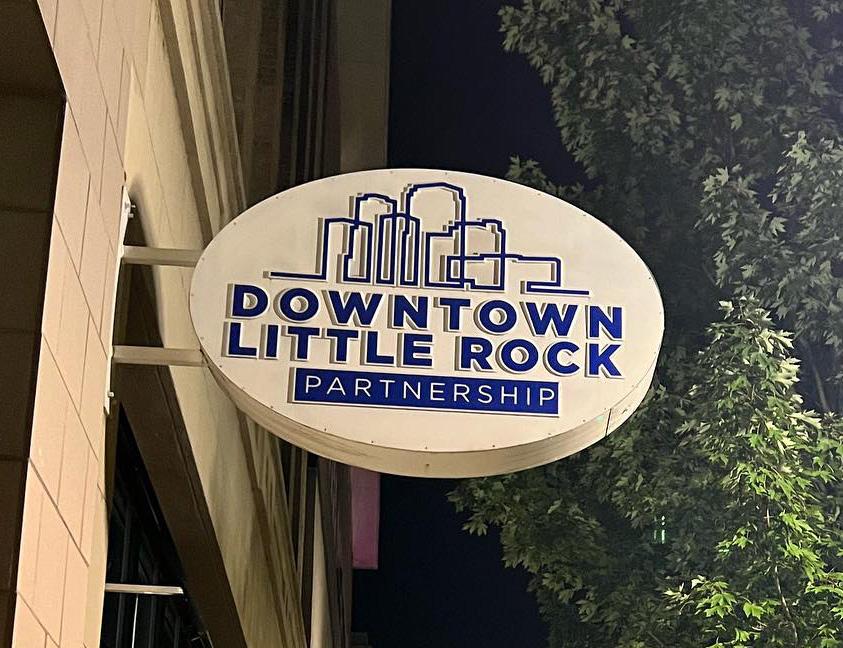
The plan gives particular attention to the Ninth Street corridor and seeks to enhance and celebrate the area’s heritage as Little Rock’s historic Black Main Street. Extensive new greenways, including a deck park over Interstate 30, would bring together assets on both sides of the highway and reconnects the storied street. West Seventh and Chester streets would be reimagined as the heart of the neighborhood.
Fortunately, according to the plan authors, the city is brimful with opportunities to correct the situation thanks to natural amenities and the possibility for bold new public space development.
“Downtown Little Rock has an amazing geographic setting along the Arkansas River and is the center of culture for all of Arkansas. These are huge strengths that cannot be replicated,” the plan states. “There are large amounts of available underutilized land, mostly surface parking lots, which
Arguably the most ambitious element of the four, 30 Crossing Park, is the Downtown Little Rock Partnership’s strongest lobby yet for utilizing land freed up by highway reconfiguration as a sweeping new central park. Featuring a variety of natural and sports amenities, as well as a huge gathering lawn for public events, 30 Crossing Park would bring sweeping changes to the look, function and connectedness of downtown.
According to the plan, the proposals are not just development for development’s sake but feed into the central goals of the plan to increase downtown density. Within its 2.5-squaremile footprint, Little Rock’s downtown has about 4,400 permanent residents, roughly one-tenth of the number of people who work downtown. A key goal in the plan is to double
downtown’s residential population by 2035, and the statistics suggest that with the right housing and amenities, a supply of potential downtown dwellers already exists.
The downtown master plan joins other ambitious public and private projects currently at work or under study for the city’s core, including expansion to Arkansas Children’s Hospital and the Clinton Presidential Center; renovation of the Central Arkansas Library System’s main branch; reimagining River Market Pavilions; and new trail connections joining the Southwest and Southeast trails.
Gabe Holmstrom, executive director of the Downtown Little Rock Partnership, said he believes the plan, the first-ever comprehensive plan for downtown, is the catalyst needed for the area to take the next big step.
“The goal is to create a strategic vision for growth and development to guide a better future for downtown and everyone who lives here or visits,” he said. “The master plan will serve as a road map for future decision making by the city of Little Rock, along with other interested entities, the development community, neighborhoods and individuals.”
Changing the downtown dynamic will have ripple effects across all of Little Rock and even the region, he added.
“This vision includes enhanced connectivity between neigh-
borhoods and the surrounding community, a safe and vibrant public realm, and improved public open spaces, all with the goal of increasing quality of life for residents, workers and visitors.”
The master plan lays out 44 categories across a wide range of topics, but Holmstrom said change should start with a renewed emphasis on the riverfront and growing downtown’s resident population.

“Downtown Little Rock has an amazing geographic setting along the Arkansas River and is the center of culture for all of Arkansas,” he said. “These are huge strengths that cannot be replicated. Downtown residential density is up to four times less than what it should be. A key goal in this master plan is to double downtown’s residential population by 2035.”
Trendy new businesses and downtown murals have boosted the area’s aesthetics, but Holmstrom said the city needs to rethink how it uses space downtown.
“There are large amounts of available, underutilized land, mostly surface parking lots, which are prime sites for

As illustrated by this slide from the master plan, focus areas include the state Capitol, West Ninth Street, the I-30 crossing park and the riverfront. (Images courtesy of DLRP)


new infill development,” he said. “The civic infrastructure in downtown, including City Hall, the Downtown Partnership, other agencies and private development, needs to coalesce around the Downtown Master Plan.”
Holmstom said demand is not the problem for residential development downtown — residential occupancy is at 97 percent.
“There is clearly a desire to live in the area,” he said. “We just don’t have the inventory. Our downtown residential population is far lower than peer downtowns and needs to increase to support the types of amenities we’d all like to enjoy in the heart of our city.”
Holmstrom said more than 20 percent of downtown land is governmen-owned (city, state or federal), and 10 percent of that is underutilized as surface parking lots.
“We just need the right incentives to spur the development of infill residential units,” he said.
From Pinnacle Mountain in the west to the Little Rock Central High School National Historic Site downtown, Little Rock has the stuff to draw visitors and satiate the cultural appetites of tourists and residents alike. For Holmstrom, Little Rock punches above its weight class for a city its size.
“Little Rock is a city with a warm heart and a welcoming spirit, making it a fantastic place to visit,” he said. “From our incredible new Arkansas Museum of Fine Arts to wonderful natural resources like the Arkansas River and challenging hiking trails, and a thriving restaurant and nightlife scene, downtown Little Rock truly has something for everyone.”






By Mark Carter and Sarah Coleman
Call it a good problem to have, but people continue pouring into northwest Arkansas to the tune of 30 people per day on average, and the commercial real estate market reflects as much.
“The commercial real estate market in northwest Arkansas is experiencing unprecedented demand propelled by continued strong job creation, a steady influx of new residents and a number of new development projects across the region,” said Steve Lane, managing director of the Rogers-based northwest Arkansas office of Colliers International.
In the office sector, Lane said he has seen a trend of “flight to quality” in which large commercial tenants move from older Class B office spaces to smaller digs within new Class A buildings. As an example, he cited Nestlé’s recent move to anchor a new office building in the trending Pinnacle Hills submarket of Rogers.
Northwest Arkansas is projected to reach a metro population of 1 million by 2050. According to U.S. Census Bureau data, growth in communities outside the region’s four anchor cities of Fayetteville, Springdale, Rogers and Bentonville is up as much as 15 percent since 2022. The towns seeing the most growth include Siloam Springs, Tontitown, Centerton (which now has a population of almost 24,000), Highfill, Pea Ridge, Prairie Grove and Cave Springs.
“Communities such as these are growing much faster than the big four cities in the area,” Lane said. “Much of the population increase is a result of job creation in the bigger cities, and the smaller cities are essentially taking on a bedroom community feel.”
The regional housing market is strong, but affordable housing is becoming a concern, he added.
“However, several nonprofit groups are working for solutions for affordable housing, notably Groundwork and Excellerate Foundation,” he said. “A more recent phenomenon in
the increase in the population is the movement to northwest Arkansas for quality-of-life reasons. Much of this is attributable to the Walton Family Foundation’s investments in the area, such as the extensive bike trails and art museums.”
Northwest Arkansas indeed offers many strong selling points as a place to live. All these new residents, though, need places to reside. Vacancy rates in all property sectors across the region — Washington and Benton counties — are below 10 percent, according to the latest Skyline Report from the Center for Business & Economic Research at the Sam M. Walton College of Business at the University of Arkansas in Fayetteville.
“However, we are seeing vacancy rates along the main corridors in primary cities much lower, in some submarkets closer to 3 percent due to the desirability and lack of space in these areas,” Lane said.
New construction in the retail sector was slowed due to the combined pressures of higher interest rates and higher construction costs, Lane added, citing the most recent Collierscommissioned data from CoStar.
John David Lindsey, principal broker with Fayetteville-based Lindsey & Associates, said he has seen a shortage of office space in certain price ranges.
“Some of the newer properties are up to $35 per square foot,” he said. “Three-thousand-square-foot-type spaces are very hard to find for more mom-and-pop type tenants. The main challenge owners have had is that loan renewals have rolled over and payments have doubled. Commercial interest rates are now 9 percent to 10 percent. If they are locked into long-term leases, owners might be hurt. Owners like five-year terms, but it might be safer for tenants to do two to three years.”
Suzett Sparks, managing broker of Lindsey’s Rogers office and a 30-year veteran of NWA real estate, noted an influx of restoration in downtown areas.


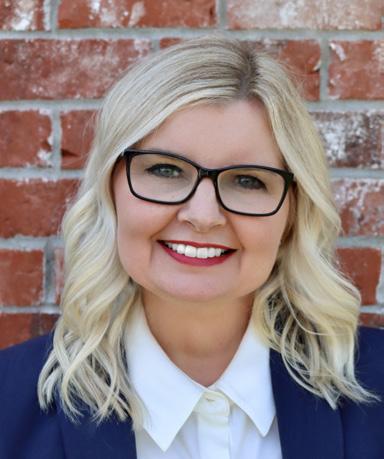


“Springdale on Emma Avenue looks brand new, as well as Rogers and Bentonville,” she said. “With construction costs that seem to have tripled since [the COVID-19 pandemic], it is hard to make numbers work to pay $20-plus per square foot for a property and spend $150-ish per foot for remodeling.”
Sparks said the impact of mixed-use spaces has been good, “especially in downtown areas where condos are up and retail is on the main floor in downtown Bentonville, the Pinnacle Hills area of Rogers and Fayetteville.”
Lane said new construction in the retail sector has been “severely slowed” by the combined pressures of higher interest rates and higher construction costs but added that multi-family and single-family construction remains robust due to the influx of new residents.
“There were multiple 150-plus unit projects delivered in the first two quarters of 2024, which should slow rent growth as they lease up,” he said. “Several housing projects under construction are more diverse than in the past, including some built for rent — single-family homes and duplex/townhomes, mid-rise/mixeduse projects, in addition to traditional garden-style apartments.”
Construction costs and interest rates are thorns in the sides of developers in central Arkansas, as well. Chris Moses, principal, president and CEO of Moses Tucker Partners in Little Rock, said these factors continue to hamper the market.
“We’re just waiting on a rate release and for construction costs to come down,” Moses said. “We need some release in the debt market. Construction materials are starting to drop a little, but nowhere near preCOVID levels.”
Given the environment, Moses said the market is seeing a lot of adaptive reuse, which refers to the process of reusing existing buildings for purposes other than those which they were built or designed for. It is employed to optimize the commercial assets of existing but perhaps outdated buildings.
Overall, Moses said the central Arkansas market is doing well, especially Conway. He noted the positive impact of the Little Rock Technology Park and
other areas of downtown Little Rock but added that the Capitol Avenue corridor needs to be “reactivated” from Main Street to the Arkansas state Capitol. Moses’ firm is developing iconic structures along the corridor — the Tower Building on Center Street and the old M.M. Cohn building on Main Street.
Hank Kelley, CEO, partner and executive broker for Little Rock’s Kelley Commercial Partners, said the central Arkansas market is seeing a return to the workplace in office properties.
“Tenants are recognizing the attractive rental rates when considering the cost of services that landlords provide with a full-service lease,” he said. “Those services include taxes, insurance, maintenance, utilities and security services, which have all increased at rates exceeding inflation while rents have not increased at this pace. While interest rates have increased in the past two years, they have stabilized for now allowing a buyer to consider a purchase at a predictable interest rate. When interest rates increase at a straight-line level and at an accelerated pace, many buyers pause to see if they can find stability in the pricing of loans.”
Kelley said activity has increased in office, retail and industrial with the leveling of interest rates.
“Buyers that are users are more active in our day-to-day activity than investor-related buyers and typically receive a warm welcome from local banks wanting to help businesses find property they use in their business,” he said.
In terms of central Arkansas growth areas, Kelley noted retail and office for Conway, retail for Saline County and Searcy, and a retail uptick in west Little Rock led by the resumed rehabilitation, post-tornado, of the Breckenridge Vil-
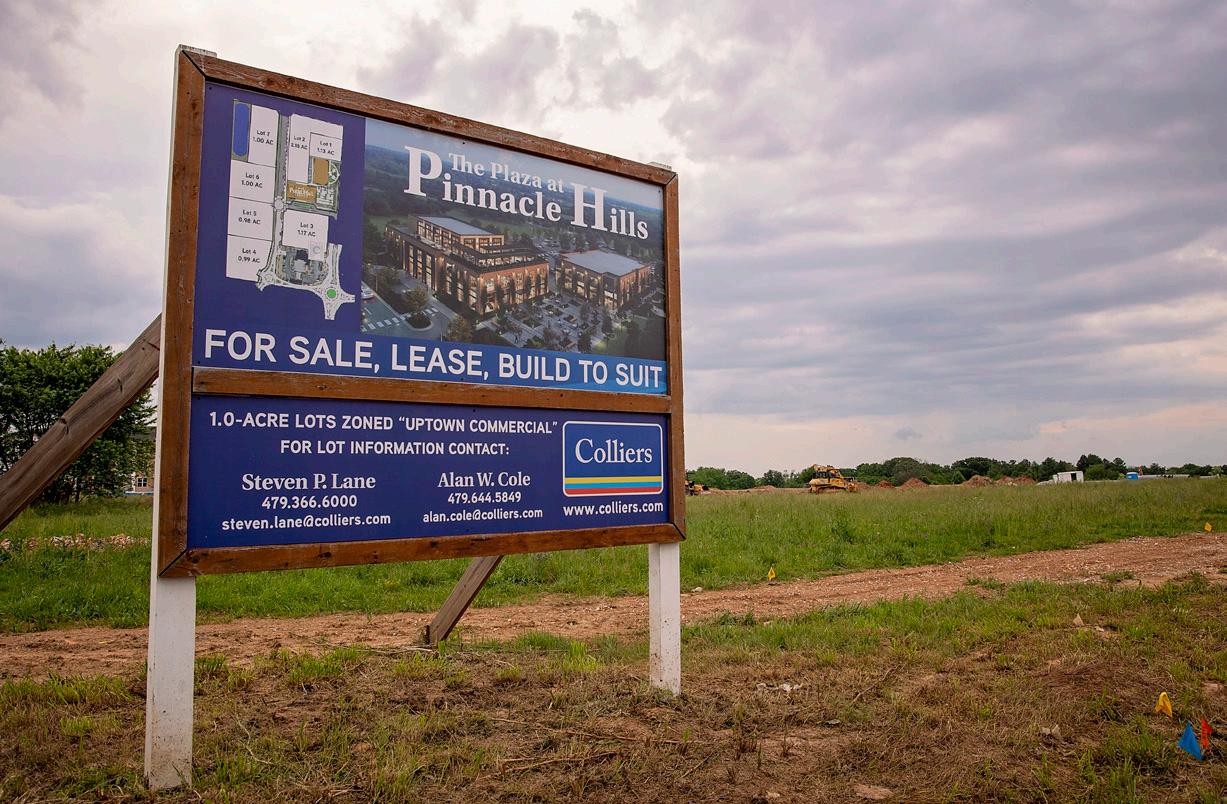
lage shopping center. He also said outparcels around the Costco in west Little Rock are attracting many prospects.
Downtown, Kelley expects to see growth on all fronts, especially with the release of the Downtown Little Rock Partnership’s new downtown master plan.
“We believe we will see an increase in housing and related users that will focus on the ample available land in our downtown areas,” he said. “Those areas include the central business district, South Main, East Village and Argenta. East Village could lead the way with some new development happening on available sites in this area.”
As central Arkansas did in 2023, northwest Arkansas continues to recover from tornado damage. Several storms swept through the area on May 26, including a confirmed EF2 twister that hit parts of Rogers and Bentonville.
“The tornado put a lot of businesses, schools and homes on hold until damaged buildings can be fixed,” Lane said. “Retail districts in both cities were impacted, including arterial road
Walnut Street in Rogers, which finally reopened six days after the storms.”
Lane credited residents, nonprofit groups, representatives of local businesses and the Arkansas National Guard for “coming out in force” to help clear the rubble and “get commerce and mobility quickly jump-started back to the area,” and noted the $2 million in immediate relief fund provided by Walmart, Sam’s Club and the Walmart Foundation.
Communities working together has always been one of the region’s strengths, Lane said.
“As northwest Arkansas continues to thrive, the real estate market shows no signs of slowing down, despite the current impediments of interest rates and construction costs,” he said. “Propelled by forward-thinking regional leaders and an entrepreneurial spirit, the region is poised for sustained growth. As new residents, investors and developers flock to the area, northwest Arkansas will solidify its position as a dynamic and vibrant real estate market.”
Commercialreal estate in Conway County received a boost recently, and Morrilton braced for more campus growth with the groundbreaking for a new $16 million nursing and science center at the University of Arkansas Community College at Morrilton.
The two-story, 36,000-square-foot facility will include seven science labs, 10 nursing labs, multiple classrooms and two student lounges. It is expected to open in fall 2025. Crafton Tull is the project engineer, and Nabholz is the general contractor.
The groundbreaking ceremony drew local and state dignitaries, including Donald Bobbitt, president of the University of Arkansas System, and state Rep. Rick Beck, R-Center Ridge.

The nursing and science center will house new programs such as certified medication assistant, medical office technology assistant and medical clinical assistant and be equipped to accommodate more programs, as well.
According to the U.S. Bureau of Labor Statistics, the demand for nurses is projected to grow significantly to more than 275,000 additional nurses needed by 2030. Employ-
ment opportunities in the field are expected to increase 9 percent faster than all other occupations from 2016 to 2026.
UACCM chancellor Lisa Willenberg said the new programs have the capacity to double the school’s enrollment in nursing and related fields.
— AMP Staff
Northwest Arkansas hogs much of the attention in the state when it comes to commercial real estate, but the state’s other upper corner has experienced its own growth spurt. Jonesboro, the de facto capital of northeast Arkansas, now boasts a population of more than 80,000 residents and a metro count of 135,000-plus.
The cultural center and health care hub of the region, Jonesboro has seen its own commercial growth spurred by the 2016 completion of Interstate 555, the former Arkansas 63, connecting the city to I-55 at West Memphis.
Joshua Brown, principal broker with Haag Brown Commercial Real Estate and Development, said commercial growth has been slow but steady.
“We do not see the highs of other areas, but we are also pretty slow to see the declines,” he said. “In my mind, Jonesboro has a more even ‘pie’ than most cities. We are pretty equal.”
Jonesboro began seeing growth before an interstate-quality freeway was finished and has long provided quick, easy access to the Memphis metro. Brown said the completion of I-555 helped put Jonesboro on the map “both figuratively and physically.” Haag Brown has been there to answer when opportunity knocks.
Since 2010, the firm has helped bring more than 100 national restaurants and retailers to Jonesboro, developed a dozen large-scale projects, including a lifestyle medical campus, a lifestyle office park and the Uptown, a retail redevelopment built on the site of a former mall that now houses former tenants of the tornado-damaged Mall at Turtle Creek. Haag Brown is a part owner in the development.
Brown said new construction is low, however, and pointed to sales-and-use tax revenue receipts since 2022. After a 9 percent jump from $13.3 million in the first quarter of 2022 to $14.5 million in the first quarter of 2023, the city saw just a 0.1 percent increase the first three months of 2024.

“New construction is very low,” Brown said. He pointed to numbers for new commercial construction permits over the past three years — $70.8 million in permits the first quarter of 2022 to $38.9 million in 2023 and $17.1 million in 2024.
“We are the regional epicenter for several counties,” he said. “This means we have a lot of restaurants and retailers for a typical city of our size.”
The industrial sector will remain strong, as well, he added, because two of the city’s major assets, conveyors and food production, perform well in economic downturns. Noting his firm’s new agricultural division, Brown said he believes the city should focus more on its agricultural base.

Last year, Haag Brown announced plans for a lifestyle-focused, master-planned mixed-use development called Steel Creek in Trumann southeast of town on I-555. In 2022, the firm announced a partnership with Jonesboro-based Hytrol Conveyor Co. to open a 150,000-square-foot distribution center in Haag Brown’s new ultra-modern E-Commerce Park.
The move represented an eight-figure investment and helped meet a pressing need for local industry, Brown said.
“It cannot be missed, being at the ‘Welcome to Jonesboro’ sign right on I-555,” he added.
Haag Brown was also behind Amazon’s recent announcement of a 58,000-square-foot last-mile facility in Jonesboro.
Market-wide, Brown said, existing commercial and industrial buildings are in higher demand and therefore more valuable.
“Looking at them like a commodity, the price of the physical things that make up buildings has gone up so much,” he said. “Rent and purchase prices are going to follow suit. Lease rates and leasing activity are extremely high. We are leasing spaces quickly at higher-than-normal rates.”
To realize the city’s full potential, though, Brown said Jonesboro should focus its strategy on workforce recruitment and quality of life.
“We continue to recruit industries by purchasing land and recruiting factories,” he said. “That doesn’t work anymore.”
Brown said the intersection of Caraway Road and Highland Drive is the city’s “epicenter for trade” and will remain so. He expects the Southwest Drive corridor to be the next hot spot for growth, thanks in large part to the new, 175-acre Southern Hills mixed-use development. Other locations ripe for commercial growth are the area north of the interstate and west of the Nestle plant as a potential logistics hub and the Hilltop area on the city’s northeast side between the Arkansas State University campus and Brookland, he added.
“It is experiencing tremendous growth, as well,” Brown said of Hilltop. “Also, distribution and warehousing are booming on Interstate 555 coming into Jonesboro from Memphis.”
Speaking of opportunity, Brown said that while northeast Arkansas is home, Haag Brown is not taking a pass on the rich vein that continues to provide in northwest Arkansas.
“We are headquartered in NEA, but we really have a focus on NWA right now,” Brown said. “What is happening in Bentonville cannot be ignored. It feels like Nashville 20 years ago, but with a better quality of life focused on outdoor activities. So far, the Walton family has made good on doing what they say in making NWA one of the best places to live.”
— Mark Carter
met with elected officials to talk about the International Energy Conservation Code, a standard of codes set forth by the federal government and one of many regulations that have hampered the residential market.
“It’s a well-intended rule, but what this particular one will do is significantly raise the price of homes if it’s adopted across the board,” Peck said. “[The Department of Housing and Urban Development] and the [Department of Agriculture] recently proposed that new rule, so if anyone wants to get an [Federal Housing Administration] or USDA mortgage, the house has to be built to those 2021 international energy codes, and if that happens, that will raise the price of homes within the Arkansas market up to $15,000.”
According to Home Innovation Research Labs’ 2021 IECC Residential Cost Effective Analysis, homes in Arkansas, which is in climate zone, are looking at 20 to 49 years of payback for minimal energy cost savings.
“If it saves $5 on your energy bill, the cost of actually putting these codes into place really doesn’t bring a payback for the homeowner,” Peck said.
Lobbying against new IECC regulations, the National Association of Home Builders called for Congress to put a provision in the 2025 Transportation, Housing and Urban Development, and Related Agencies Appropriations Bill to prevent HUD from using federal funds to implement the mandate.
Peck said she hopes to work with municipalities, states and the federal government to educate them on how regulations impact home prices and affect prospective homeowners’ ability to buy a home. Meanwhile, longtime real estate professionals are dealing with other challenges.
“When I got into the business in 2003, buyer agency was commonplace,” said John Selva, principal broker and real estate advisor at Engel & Völkers in Little Rock. “It evolved probably about 10 years before I got into the business, early 1990s, so before only sellers were represented.”
Selva started with Crye-Leike Real Estate Services right out of college and, after several years, opened his own agency, Pulaski Heights Realty in Little Rock, in 2007, just in time to feel the effects of the housing market bubble bursting. The company nonetheless survived the crash and stayed in operation until 2019.
“I wanted to focus on more of a smaller, service-oriented firm — a few good agents, not a hundred agents,” Selva said.
He said he was approached by many chains
about franchising but turned them down until in 2018, when he was looking to refresh his branding. That’s when E&V came knocking, offering a small-shop concept.
One attractor for E&V to enter the Little Rock market was stability, Selva said. Little Rock’s population has consistently grown, passing the 200,000 mark as of the 2020 census, and has seen only a few years of minor decrease in the city’s history.
“They wanted to bring this high-level service for high-end clients to everyone,” Selva said. “It’s high-end service for anybody — luxury at all price points.”
The company now has two offices in Little Rock: the flagship Kavanaugh office in Hillcrest and one in the Pleasant Ridge Town Center in west Little Rock that opened in 2021. Selva’s wife, Jena, assists with running the business. Its cheapest home on the Little Rock site comes in at $192,000, while the most expensive is just shy of $2 million.
Another recent tremor in the residential real estate market could have far-reaching effects on
The fastestgrowing region in Arkansas for new homes according to the National Association of Home Builders is the FayettevilleSpringdale-Rogers, Arkansas-Missouri Metropolitan Statistical Area, or northwest Arkansas.
Arkansas is in Zone 3
how homes are bought and sold going forward. A settlement following a class action lawsuit against the National Association of Realtors mandated the organization pay $418 million over a span of four years. In the suit, levied against NAR and several national brokerages, the plaintiff argued that NAR forced home sellers to pay higher commissions to be split between their agents and the buyers’ agents. Commissions for home sellers’ agents are kept artificially high by the condition of sharing commissions for access to the Multiple Listing Service, the plaintiff claimed.
As a result, agents will not have access to information about how much commission is being paid for a property, which means they will not be able to give their clients the most accurate picture of fees, Selva said. Another change proposed in the regulation is that buyers’ agents have to have agency agreements signed with their buyers.
Selva said when he started in the industry, Arkansas already required signed agreements between buyers and agents, which may explain why it was one of 12 states not named in the nationwide suit. The settlement will not require payment by the buyer in the agreements but will ensure that if the buyers’ agent is not paid by the seller, an agreed-upon payment will be made by the buyer.
Selva said in a ideal world, buyers would cough up extra to pay their agent’s commission, but most buyers are already saving strenuously to scrape together enough for the down payment, closing costs and other associated fees. He said it makes sense for the seller’s agent to share commissions with the buyer’s agent because the buyer’s agent brings in the buyer.
He said the change could set the industry back and impede transparency, and the “evolving process” has caused uncertainty
about the future. With the proposed changes in place, agents such as Selva will have to call the sellers’ agent and ask if the seller is willing to offer buyer agent compensation. If there is no compensation available, the buyers will have to add the fee from their signed agreements with their agents to the total of their home purchase price.
“Maybe some other business models will come out of this,” Selva said, “but as infrequently as people do these transactions, and it’s the biggest transaction most people make in their lives, I think the majority of people see the value in having someone who knows what they’re doing guide them through that process.”
The new regulatory challenges come at a time when the future of the market is as uncertain as ever. The effects of government assistance programs that injected capital into the market through the CARES Act in an attempt to combat homelessness and housing insecurity during the COVID-19 era have yet to be seen. Peck said the past decade has seen the recovery of the market from the 2007-2008 financial crisis, and housing starts are projected to continue increasing over the next few years, but anything could happen.
According to the Housing Affordability Pyramid compiled by the National Association of Home Builders Housing Policy Department using income data from the U.S. Census Bureau, 40.5 million people around the country can afford a home up to $150,000. Going up from $150,000 to $250,000, that number shrinks to 26.1 million. Another study by the NAHB found that for every $1,000 the price increases, 160,000 people are priced out of a home nationally. In Arkansas, that number is 711 people. The median home value in the state is about $136,000.
The fastest-growing region in Arkansas for new homes according to the NAHB is the FayettevilleSpringdale-Rogers, Arkansas-Missouri Metropolitan Statistical Area, or northwest Arkansas. The area saw 5,700 single-family building permits and 1,400 multi-family permits in 2021. The Little Rock/North Little Rock area saw 2,500 and 1,100, respectively.
“There’s a lot of conversation right now about housing affordability, about housing inventory, and how that ties into not just the economic success of any state or any community, but really, the success of families,” Peck said.
“There’s so many benefits to owning a home, so we’re trying to work with our regulators to make sure that there’s some sound policy in place that enables more homeownership for these families.”





By Sarah Coleman
As the RPM Group approaches its 70th anniversary, the fullservice real estate firm marks a significant milestone. For the first time in its history, the company is led by a sole owner with a single vision for the future.
Kris Upton joined RPM in 2003 and has since served the company in several capacities. His most recent role is that of owner.
“I have immense gratitude and admiration for the founders of RPM and the culture that Mr. William F. Rector created,” he said. “I bought into this company because of the culture; I bought the company because I believe in our mission and our ability to serve central Arkansas for the next 30 years.
“I keep a file on my desk of RPM’s formation documents from 1955 as a reminder that our core values of trust, service, excellence and integrity are as timeless now as they were 70 years ago.”
Over the decades, RPM became known for an emphasis on giving back to the communities that enabled the firm to thrive.
“Mr. Rector started the firm on an enduring foundation of ideals, and I still enjoy a couple of sayings credited to him,” Upton said. “My favorite is found in the original RPM handbook: ‘If you are hired to work here, we expect you to be successful.’”
Upton is quick to credit the firm’s 300-plus employees and sales associates. The firm currently has nine locations spanning a 90-mile radius around its headquarters in the heart of midtown Little Rock.
“I am extremely proud of what our employees and associates have accomplished. We value everyone’s perspective and want our doors to open to a place of opportunity,” he said.
Upton earned his seat at the table by playing a decisive role in some of the most significant events that shaped the firm over the

past 20 years. The confluence of three pivotal events presented an early opportunity for Upton to step in with a key role in leadership to steer the firm’s direction.
In 2008, Upton was promoted to dual roles as chief operating officer and chief financial officer to help guide the firm through the depths of a recession and financial crisis. During that time, the firm had a pre-established mandate to liquidate its $60 million RPM Realty Fund.
“At our core, we value trusting, long-term relationships,” Upton said. “Strong relationships persevere in good or adverse business conditions, and while the timing was monumentally poor to put the fund’s commercial assets on the market in 2010, our investors were patient and allowed us to work hard and tread water long enough to reward them with an outsized return.”
Upton added that the firm was pleased with the win-win achieved in that situation.
He was then promoted to president in 2012 and CEO in 2018 by a consensus of the firm’s partners. Soon after, COVID-19 and a new operating paradigm emerged.
Under Upton’s leadership, RPM implemented a policy to remain open for business while the doors remained closed to the public. In temporarily serving clients and customers remotely, a wave of transactions drove record sales in 2021 and 2022. Upton also set a high mark for the firm when he sold a multi-family portfolio valued at nearly $100 million in the

immediate run-up to higher interest rates.
“Attitudes towards work have in some ways been irreversibly changed by the pandemic and business closures. COVID reinforced that we are first and foremost a service company,” Upton said.
While Upton cheers the milestones RPM has achieved, he remains focused on the current organization and the company’s long-term growth initiatives.
“When I was charged with the CEO position, my immediate aim was to strengthen our organization at the top by recruiting leadership from outside the company,” he said. “COVID delayed my initial timeline, but it also gave me more clarity about areas that could benefit the most from broader and more diverse perspectives.”
Upton’s first move was hiring his wife, Karen Upton, who is now a co-owner of RPM Group. She brought more than 25 years of Fortune 500 company experience in accounting, finance, project management, and mergers and acquisitions.
“In addition to being my closest advisor, her skill sets were ideally suited to help build and integrate a new leadership team and define our long-term growth initiatives,” Upton said.
The company has doubled the size of its commercial brokerage team over the past year and is in the planning phase of investing material capital improvements in its commercial property portfolio. At the same time, new leadership was tapped to head the firm’s residential company, Coldwell Banker RPM Group.
“We are proud to have a franchise relationship with Coldwell Banker, which is the No. 1 national real estate franchise in the country. Their suite of training, marketing and promotional tools are unmatched in our industry, and I felt we could enrich our value proposition to our sales associates by doing a better job of delivering these tools,” Upton said.
Carolyn Cobb, president of Coldwell Banker RPM Group, and
RPM properties include office space, including the Prospect Building in midtown Little Rock. (Photo provided)
Lindsay Hammers, vice president of marketing and development, emerged as the right fit at the right time, he said.
Cobb is a past president of the Arkansas Realtors Association and recent inductee in the National Association of Realtors Hall of Fame. Currently, she chairs the professional standards committee for NAR.
“Carolyn’s credentials merit more than this space will allow, but she is arguably one of the most experienced brokers in the state,” Upton said. “Given the magnitude and complexity of regulatory changes with respect to buyer’s agency representation, her expertise and involvement at the national level combined with our executive broker team’s combined 200 years of experience are a real asset to our sales associates.”
Hammers joined the team after serving multiple roles with RPM Group’s national franchise partner, Coldwell Banker. In her previous role, Hammers led 45 affiliate companies with more than 3,000 combined agents spanning nine states. She also spearheaded promotion of the Coldwell Banker luxury brand that caters to affluent clientele.
“Lindsay’s deep experience in real estate marketing immediately set a course to energize our marketing and promotional efforts and empower our sales agents to manage listings more effectively, reach a broader audience and ultimately close more deals faster,” Upton said.
Amid a stubborn higher-for-longer interest rate environment that continues to weigh on transaction volume, RPM’s team is poised to pursue growth organically in existing markets and inorganically with the anticipation of consolidation in the marketplace, he said.
“With 70 years of know-how and a track record to stand by, the RPM Group is well-positioned to lead the industry on its way to the century mark,” Upton said.

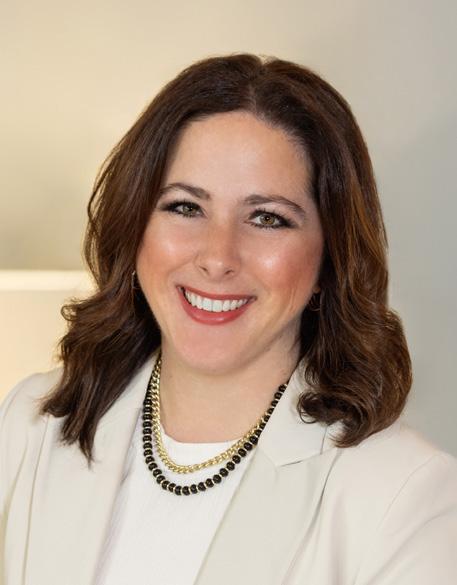



Abundant greenfields, prime locations attract manufacturers to Arkansas
By Sarah DeClerk
Industrial and manufacturing companies can bring jobs, tax dollars and, ultimately, prosperity to the communities where they choose to locate. Just as companies provide commercial goods to consumers, municipalities are in the business of providing land to those companies, said Bryan Day, executive director of the Little Rock Port Authority.
“You can build anything anywhere in the world today,” he said. “It no longer matters, so you want to have a really good piece of real estate that’s usable, ready to be built on, accessible and affordable so that that industry will choose your community.”
Perhaps one of the best-known industrial parks in the state, the 5,000-acre Port of Little Rock is home to 52 companies, including businesses from six foreign countries. Some of the best-known occupants include Amazon, steel producer Lexicon, composite lumber manufacturer Trex and Skippy peanut butter, as well as internationally based companies Welspun, Elopak and Novus.
The port is currently working on a 1,000-acre megasite slated to attract a major manufacturer. The main obstacle at the site has been a federal aviation navigation aid that inhibits construction, Day said, adding that the port has worked with the Federal Aviation Administration to build a new navigation aid. When the new structure replaces the old one in early October, the port can begin marketing the second site, he said.
The port’s main advantages are ample greenfield space and logistical choices that include the Arkansas River, access to various roadways, a short-line railroad and convenience to the Bill and Hillary Clinton National Airport.
“When you’re moving large volumes of commodities or goods, you want to have those choices,” Day said. “Is it better to load on a railroad? Is it better to put it on a barge? Does airfreight make sense? How close are the interstates?”
The port is aggressive when it comes to acquiring land, Day said, adding that it is easier to build on a greenfield that has never been developed than to infill previously used land or rehabilitate an existing building.
The port also works to ensure its land is free from obstacles to construction, such as cultural significance, environmental hazards or endangered species, so that companies can start building right away.
“If a company comes to town, they’re not necessarily looking for reasons to locate there. Obviously, they’ve identified that community as a place they would like to be,” he said. “They’re looking for reasons not to locate there. Is the land not ready? Is it not under control? Have the studies not been done? Are there no utilities to it? If we can provide those cultural studies, those
“I think that you’re going to see a lot of opportunity over the next 10 years, a lot of distribution, a lot of manufacturing in communities like Little Rock, and real estate’s the key to all of that.”
— Bryan Day, executive director of the Little Rock Port Authority
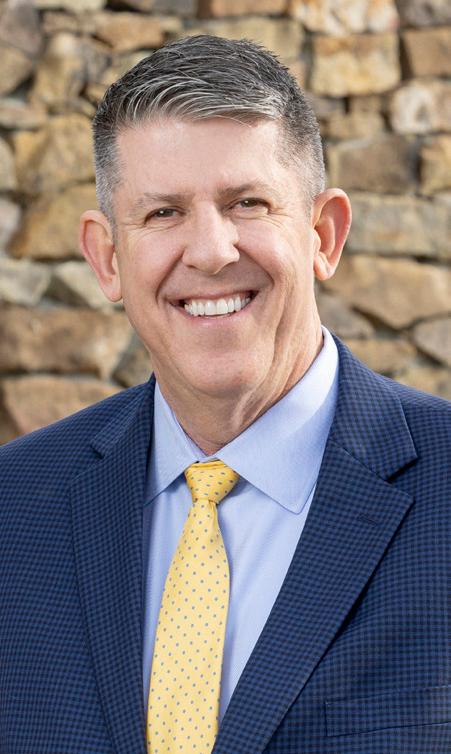
environmental studies, those geo-technical studies to give all that information in a packet to the prospect, then it makes that decision so much easier for them to choose your community.”
Logistics snarls caused by the COVID-19 pandemic illustrated the fragility of the supply chain and the importance of American manufacturing, Day said, adding that he expects a higher demand for industrial real estate in Little Rock and similarly sized cities in coming years.
“I think that you’re going to see a lot of opportunity over the next 10 years, a lot of distribution, a lot of manufacturing in communities like Little Rock, and real estate’s the key to all of that,” he said. “If there’s no real estate, the city has no product. If there’s no product, they’re not even going to look at you. They’re going to go somewhere else. If they go somewhere else, you’re not creating jobs.”

With industrial parks strategically placed near interstates, excellent community amenities and access to one of the busiest metropolitan areas in the South, it is no wonder West Memphis fields plenty of requests from site selectors for manufacturing companies.
“West Memphis being so close to Memphis, you kind of get that small-town living, but you have access to the big-city life,” said Nick Coulter, communications director at the city of West Memphis. “We’re less than five minutes from downtown Memphis. We always like to say that we’re closer to Memphis than Memphis is.”
The city has four industrial parks: MidAmerica Industrial Park, the West Memphis I-40 Megasite, the Rail Port Logistics Park and Hopefield Industrial.
A 500-acre industrial park built on land the city acquired in the 1990s, the Mid-America Industrial Park is home to a Family Dollar Distribution Center, FedEx, Carvana and Sediver, a global manufacturer of insulators for overhead lines. The I-40 Megasite on the western edge of the city is ideal for light manufacturing companies that need easy access to the interstate and has 1,300 acres of shovel-ready land, Coulter said.

Adjacent to the Mississippi River in the south, the Rail Port Logistics Park provides more than 200,000 acres and includes a city-owned port and a city-owned short-line railroad. To the northeast of the Rail Port Logistics Park is Hopefield Industrial, which sits between two Class 1 railroads and provides easy access to both I-40 and I-55.
The city also has a municipal airport and is within easy reach of the Memphis International Airport, he added.
“Ultimately, we’ve got over 3,500 acres of industrial sites or industrial property, all with heavy due diligence at all sites, access to rail, river, road,” he said. “Being so close to I-40 and I-55 really makes us attractive to industrial prospects.”
That due diligence includes completing phase 1 studies so that site consultants do not have to do the legwork, he said. Ensuring adequate utilities is also important, he said, adding that the city is in the process of investing more than $42 million into its water system, which should help attract water-intensive manufacturers such as those that make batteries for electric vehicles.
“There’s a lot of communities, everything is a perfect fit, but then they can’t handle the water and wastewater,” he said. “We’re really trying to take advantage of some of our resources that we have and really put us kind of a step ahead.”
He said one of the city’s biggest strengths is being able to draw from the Memphis workforce. The city also benefits from a close relationship with the Arkansas Economic Development Commission and Entergy Arkansas, he added.
The city’s work to make its industrial parks attractive to companies has paid off in investment. Family Dollar is investing $110 million into its distribution center, he said, and Coca-Cola invested in improvements to its West Memphis facility a few years ago.
Other household names that have a footprint in West Memphis include logistics companies Bosch and Schneider, as well as Marion-based Hino Motors Manufacturing.
“The mayor, [Marco McClendon], is adamant on making sure that we have all the resources we need to attract those jobs,” Coulter said. “As far as impact, anytime you bring new jobs, you have more homes, you have more tax dollars coming to your city. Obviously, that improves our education system with property taxes, so that’s why we’re so vested.”
“Being so close to I-40 and I-55 really makes us attractive to industrial prospects.”
— Nick Coulter, communications director at the city of West Memphis


Springdale is known as the poultry capital of Arkansas, but Bill Rogers, president and CEO of the Springdale Chamber of Commerce, said the city has a diversified economy that includes a range of manufacturing and industrial companies.
“We’ve got a little bit of everything, and I think that’s one reason why our economy is healthy and strong,” he said.
The city has focused on recruiting and retaining manufacturing companies since the 1960s, when it established the Springdale Industrial Commission, now the Springdale Public Facilities Board. Springdale is one of the few cities in Arkansas that has land holdings that, through the public facilities board, the city can use as an incentive to attract companies, Rogers said.
“When you go back to the ‘60s, our city fathers recognized that we had a lot of land and needed more people in our town, needed more jobs, recruited a number of companies,” he said. “It was in that industrial era, the Rockefeller area where companies were looking to leave the North. Conditions were more favorable to business, and Springdale took advantage of it, and we continue to benefit from some of the groundwork that was laid back then.“
In addition to poultry titans Tyson Foods and George’s and food producer Cargill, the city is home to plants for Rockline Industries, Conair, Dayco and American Tubing International. A relative newcomer is NOW Diagnostics, which produces medical devices that provide near-instantaneous diagnoses.
Central States Manufacturing is building a plant to manufacture steel beams that, along with equipment manufacturer Multi-Craft Contractors and Tyson’s research and development facility, could help put Springdale manufacturing on the map when it comes to robotics, Rogers added.
“A number of our manufacturers — as they are across America — have endorsed and are using robotics in ways that make them more efficient,” he said. “It puts a greater emphasis and stress on our training to make sure that their employees and their future employees are of skill so that they can manage those robotic machinery.”
Although Springdale is known for poultry plants, the city benefits from diverse industries seeking real estate in the growing area.
In addition to workforce training programs at the Don Tyson School of Innovation and other facilities of Springdale Public Schools, the city is home to Northwest Technical Institute. Furthermore, the explosive population growth in northwest Arkansas has allowed Springdale to keep up with workforce needs, even amid record unemployment lows, Rogers said.
In addition, low tax rates compared to neighbors Fayetteville and Bentonville make Springdale attractive to manufacturers, he said.
With the Springdale Municipal Airport, the Arkansas & Missouri Railroad and improving roadways, Springdale also makes sense from a logistical perspective, he added. The Arkansas Department of Transportation is currently constructing a bypass set to improve traffic flow throughout the city and provide better access to the industrial part of town, he said. ARDOT is also building a connector that will provide easier access to the Northwest Arkansas National Airport.
“As our population’s grown dramatically, it’s been important to keep up with it as best we can from a road-structure standpoint,” he said.
He added that he expects industrial real estate to become more expensive and harder to find, and it will be a challenge for cities to continue to recruit companies in a way that allows businesses to build in prime locations while remaining profitable.
“A lot of businesses want to be on I-49 and have great visibility and great access, and there’s [only] so much of that real estate that’s available, and honestly, the little amount that is, most industry’s not going to pay that to put a plant there,” he said. “How can we continue to go to our community’s edges, where companies can find affordable land, but still be able to provide them the infrastructure, and that means roads, water and sewer, to make their bottom line work so they’ll choose Arkansas instead of another state?”
“We’ve got a little bit of everything, and I think that’s one reason why our economy is healthy and strong,” he said.
— Bill Rogers, president and CEO of the Springdale Chamber of Commerce

A look at some of the top land deals of 2023 from six prominent land firms doing business in Arkansas
DDK FORESTRY & REAL ESTATE
Name: Rolling Fork timber tract
County: Sevier
Acres: 3,209
Price:$7,412,790
Name: Central Arkansas pine package
County: Jefferson
Acres: 2,110
Price: $4,200,000
Name: Fourche La Fave Farm
County: Perry
Acres: 1,328
Price: $4,118,164
Property: Southern Baptist Farm
County: Craighead
Acres: 2,147
Price: $10,299,209
Property: Kiech Farm
County: Lawrence
Acres: 460
Price: $2,400,000
Property: Campbell McKinney Farm
County: Lee
Acres: 209
Price: $780,345
Property: Firehunt Humphrey Farm
County: Jefferson
Acres: 2,580.59
Price: $18,065,000
Property: E&G Farms
County: Lonoke
Acres: 2,140.59
Price: $12,149,000
Property: Double D
County: Lonoke
Acres: 544.88
Price: $4,500,000
Name: Wayne Farm
County: Pulaski County
Acres: 779
Price: $5,000,000
Name: Birdeye Highway 42 Farm
County: Cross
Acres: 557
Price: $4,200,000
Name: House Farm
County: Cross
Acres: 356
Price: $2,000,000
WELLONS LAND
Property: Investment timberland
County: Lee
Acres: 1,200
Price: $4,255,000
Property: LW Farms
County: Lee
Acres: 915
Price: $2,836,500
Property: Mallard Bayou
County: Prairie
Acres: 386
Price: $2,460,750
WHITETAIL PROPERTIES
Property: Ozark ranch
County: Boone, Carroll, Newton
Acres: 1,435
Price: $4,990,000
Property: Hunting tract
County: Newton
Acres: 900
Price: $2,520,000
Property: Residential County: Washington
Acres: 104.15
Price: $2,400,000
Sources: Agencies

In real estate, a team of professionals with a proven track record can make their clients' dreams a reality. With a mission to connect readers with the best in the business, Arkansas Money & Politics is proud to present the 2024 Real Estate Professionals Showcase, highlighting some of the state's top professionals. In this special sales section, get to know these ireal estate agents, mortgage professionals, insurance experts and title companies who help deliver those dreams.
Sharon Adkins Owner, Executive Broker

Rainwood Road, suite 4 // Little Rock
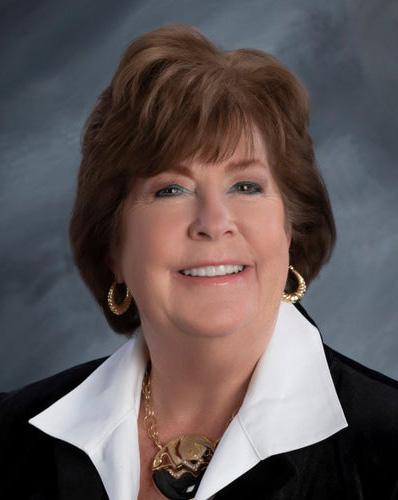
Little Rock native Sharon Adkins began her real estate career in 1983 while raising her five children and was the recipient of multiple million-dollar awards from the Little Rock Realtors Association. In 1988, Adkins’ father, Bob, asked her to join him at his title company, American Abstract, to which she replied, “When can I start?” There, she learned about doing business with honesty and integrity while closing thousands of real estate transactions before eventually becoming president and owner of the company. Adkins retired from the business in 2015 and returned to real estate as a sales agent and executive broker. She is now co-owner of Adkins & Associates Real Estate. Finding success again came naturally, given her years of experience and knack for building long-lasting relationships.

//
// gena.nicholsrealtyexpress@gmail.com

Cadie has been in the real estate game, assisting homeowners with one of the biggest investments of their lives, since 2021. With more than 30 years in client-facing and customer service, being able to connect
with working with first-time homebuyers, investors, land and new construction.


Imagine a REALTOR with the experience, grit and gratitude to deliver luxury results every time. With an agent committed to complete client satisfaction — one driven by integrity, a fierce work ethic and a never-quit attitude — what could be accomplished? Barkley and the entire team at White Stone offer clients the experience necessary to deliver the luxury results they want and need when it matters most. For those looking for someone with the power to attract, negotiate and deliver luxury results, Barkley is the right agent.



Kristi Copeland Executive Broker, MRP

2120 W. Main St., suite 2 // Cabot
501.416.0488 // themagicalagent@gmail.com // themagicalagent.com
BRINGING A LITTLE MAGIC TO THE

Kristi Copeland has spent the last 6 years as central Arkansas’ ‘Magical Agent,’ and she strives to incorporate the world-class service and client engagement of her favorite place, Disney, into her real estate business. She is also a licensed associate broker in Florida and has been a Managing Broker for the last 3. Copeland is committed to delivering exceptional results. From first-time homebuyers to seasoned investors, she understands that everyone has unique needs. She is dedicated to helping her clients navigate the real estate process with confidence and ease.


Hope Hart is a dedicated partner in making homeownership a reality. As a top-producing mortgage loan officer at Centennial Bank, she consistently goes above and beyond to understand her clients’ unique needs and financial goals. With a passion for finding the ideal loan solution for each individual, Hart navigates the complexities of the mortgage process with ease, ensuring a smooth and stress-free experience. Whether clients are first-time homebuyers, seeking construction loans for their dream homes or looking to refinance, Hart’s expertise and personalized approach make her the ideal partner in the home-buying journey. Clients can trust Hart to make their homeownership dreams come true.


Chase Rackley and the Rackley Team have a huge heart of gratitude for all the incredible clients they credit for continuing to refer them great business, helping them secure their spot in the top one percent of Realtors in all of Arkansas since 2019. Rackley often praises the power of their team-effort approach, offering a diverse background of uniquely excellent, naturally gifted, beautifully disciplined, servant-hearted, top class Realtors. Tag @ChaseRackley in a shoutout picture of this spotlight for a free coffee gift!


Cantrell Road, suite 120 // Little Rock
// adover@cbrpm.com // cbrpm.com

Anna Kaye Dover is a dedicated and results-driven realtor with more than 20 years of experience in the industry. By staying current with market trends and leveraging innovative marketing strategies, she ensures properties get maximum exposure and the best possible outcomes are secured. Her commitment to providing top-level customer service and her solid track record of exceeding clients’ expectations have earned her a reputation for being trustworthy and reliable. Dover strives to make the buying or selling process as smooth as possible for her clients by guiding them every step of the way with professionalism and integrity.


David Hall is the principal broker of the Goff Group Real Estate Co. in Hot Springs. A native Arkansan born and raised in Spa City, Hall attended Lakeside High School. After graduating from the University of Arkansas in Fayetteville, Hall entered the corporate world by working for Walmart. His hometown roots brought him back to Hot Springs and a career in real estate, which allows Hall to directly impact his community in positive ways. His passion for the work is evident — he relishes the opportunity to build relationships with his clients and work together to make their dreams a reality.


Life insurance and long-term care options affected by broader insurance trends

By Mak Millard
Insurance professionals are often in the business of predicting the unpredictable and planning around uncertainty — accidents, natural disasters and the like. Economic and real-world anxieties translate into the numbers one sees in deductibles and premiums, and current trends only point upward for all the metrics — and prices — concerned.
“We tell our clients, when they say, ‘Why are the premiums going up?’ to watch The Today Show or Good Morning America on any day, take your pick, Monday through Saturday,” said Andrew Meadors, CEO of Arkansas for Sunstar Insurance Group. “There have been 400 tornadoes around the central United States this year, which is more than double the average historically. We know that America is suffering with higher premiums and also much higher deductibles and higher self-insured retentions, so it’s really difficult on everybody.”
Tornado frequency aside, there is at least one inevitability that everyone will need to account for sooner or later — the end of life. Much remains to be seen regarding the long-term effects of the COVID-19 pandemic as insurance companies continue to assimilate data and spot maturing health and social trends. Some impacts on the life insurance industry could be felt nearly immediately, however, and they continue to affect what kind of people seek coverage and when.
“Younger families seem to be more interested in life insurance,” Meadors said. “America has been through a lot of angst and anxiety during the COVID era. Now that that’s mostly behind us, there does seem to be more focus on risk management and being prudent to protect individuals’ or families’ futures.”
Life insurance plays a crucial part in one’s overall financial picture. As with the other pieces of the wealth-building and wealth-protection puzzle, the sooner one starts planning alongside a team of experts, including financial advisors, insurance professionals, lawyers and accountants, the better the chances of securing long-term stability.
“Let me be clear, I am not a financial planner. However, life insurance is a versatile and essential component of a well-rounded financial plan,” said David Todd, chief operating officer and president of benefits at Sunstar. “It provides financial security, facilitates wealth transfer, supports business continuity, and can even offer liquidity and supplemental income. Properly integrated, life insurance helps ensure financial resilience and peace of mind for individuals and their families.”
Life insurance is designed to replace lost income,
Meadors said. That means for a young surgeon, engineer, attorney or other well-to-do professional, people can be surprised at how much coverage might be needed in case tragedy strikes at an early age.
“Getting going with the program is important when you’re young because you protect your insurability going forward,” he added. “If you’re young and healthy, you can lock in a good rate on a 20- or 30-year term. Even though you may need to buy higher limits later as you go through life, it’s a good time to go ahead and get your insurance program started while you are fully insurable.”
More than just making arrangements for a funeral and the passing on of assets, however, families must also take into account what to do when an aging loved one can no longer live independently or when the level of care they need is more than family members can provide on their own. Considerations about assisted living and other professional care can be a huge pitfall for the underprepared, especially as a growing senior population couples with advances in health care to potentially extend those later years.
Citing a 2022 Department of Health and Human Services study, special interest group AARP stated that “about 49 percent of men and 64 percent of women reaching age 65 today will need significant long-term care during their remaining years.” Nearly half of those will need paid assistance to cover what family members cannot, the group found, and about 14 percent need more than two years of paid care.
“As people live longer, insurers are adjusting their pricing models. Longer lifespans mean that insurers have to account for extended benefit payout periods,” Todd said. “This has led to higher premiums for both life insurance and long-term care insurance to mitigate the financial risk associated with longer life expectancies.”
In November 2023, a survey from nonprofit KFF found that “fewer than half of adults say they have ever had a serious conversation with a loved one about who will take care of them if they need help with daily activities in the future (43 percent) or how the cost of such care would be paid for (39 percent).” If they think about it at all, many people are also surprised to find out just what Medicare and life insurance alone do and do not cover. Per the KFF survey, 45 percent of respondents 65 and older mistakenly assumed that Medicare would foot the bill for time in a nursing home if they


or a loved one had a long-term illness or disability.
“Unfortunately, most people think that Medicare or regular health and life insurance will take care of longterm care,” Todd said. “They are shocked when they discover that it does not, and then an even bigger shock when they find out the actual cost of long-term care.”
Long-term care insurance can be a useful way to bridge the gap between one’s ability to pay for necessary future care and other coverage sources, such as disability insurance. While disability coverage ensures income continuation, long-term care insurance prevents financial strain from long-term care expenses by ensuring those costs are covered. Integrating life, disability and long-term care insurance into a broader financial plan ensures that each policy complements the others to provide seamless coverage across different life stages, Todd said.
Given the inherently uncertain nature of one’s final years — from what kind of care might be needed to how long one will need it, if at all — those in the market for long-term care insurance might be concerned about paying premiums and never actually using the benefits. That worry, combined with rising costs across the board, has led more people to search for coverage that combines life insurance with long-term care benefits. Such “hybrid policies” allow policyholders to use the benefits for long-term care if needed or as a death benefit if not.
“There’s a noticeable shift towards policies that offer flexibility and multiuse benefits. Consumers are more interested in products that offer value in multiple scenarios, such as living benefits, terminal illness riders and critical illness riders,” Todd said. “The flexibility, predictability and comprehensive coverage offered by hybrid policies make them an appealing option for individuals looking to manage both potential long-term care needs and wealth transfer to beneficiaries.”
Another reason for the growing interest comes not from the insured parties themselves, but from their families. Children thinking ahead to their parents’ elder care have spurred more conversations around what kind of coverage to get. That is due to a combination of personal experiences, financial planning considerations, societal trends, and the desire to ensure quality care for aging parents without overwhelming
financial or caregiving burdens, Todd said.
There is good reason to contemplate those scenarios, too, given the exorbitant costs associated with senior care. The aforementioned Health and Human Services report pinned the average cost of “long-term services and supports” for someone turning 65 today at about $120,900.
“In Arkansas, the cost of care varies but is in the range of $5,000 to $8,000 per month, depending on facility,” Todd said. “Long-term care policies will pay for care in the home, in assisted living and in a nursing facility. Long-term care policyholders have the option of choosing where they receive care. It’s the best gift they can give their kids — they can supervise their care but are not required to provide the day-to-day care.”
Naturally, insurance costs vary significantly based on age, health and other factors, but the annual cost of a long-term care policy is less than the annual cost of a health insurance policy for a 60-year-old, Todd said. Couples who apply and are both approved can also receive a couple’s discount, he said, because they tend to take care of each other and go longer without going on claim. In that case, the average annual cost for both is about the cost of care for one person for one month.
“Long-term care should be an integral part of any solid financial plan,” Todd said. “While the optimal age to start thinking about and purchasing long-term care insurance is generally in your 50s, some individuals may benefit from considering it in their 40s, especially if they have a family history of health issues or are focused on comprehensive early financial planning. Waiting until your 60s can result in significantly higher premiums and potential health-related disqualification.”
Given its utility, Todd called it a “prudent step in financial planning” to at least consider long-term care insurance. That is particularly true when factoring in the costs associated with such care and the risk of needing it as one ages. As is the case with other kinds of insurance, long-term care coverage is about providing financial protection to both the policyholders and their families.
“It helps preserve retirement savings, provides more choices in care options and offers peace of mind,” Todd said. “With the availability of flexible and hybrid policies, long-term care insurance can be tailored to fit individual needs and financial situations, making it a valuable component of a comprehensive financial plan.”


Rock: 10800 Financial Centre Pkwy, Suite 300 (501) 225-3454
(Farris
4706 S. Thompson Street (479) 756-6330

Sunstar has added vast experience to our already stellar team of insurance professionals. Covering more of the Natural State than any other independent insurance group, we’re one of the fastest growing insurance agencies in the region. That’s the power of local. That’s the power of Sunstar. Learn more at sunstarinsuranceofarkansas.com

(Campbell & Co.) 221 W. Washington St. (870) 836-5724
By Sarah DeClerk
Home insurance rates are on the rise, and homebuyers are feeling the effects, said Dennis Adkins, owner of Adkins & Associates Real Estate in Little Rock.
“The rates have gone up drastically on single-family residences. They’ve gone up on the condos that we sell,” he said. “We’re seeing big increases.”
Insurance companies are also becoming more stringent, he said, adding that homebuyers might be denied coverage due to outdated wiring or an old roof, and some companies ask that trees be trimmed or removed before a home can be insured.
Nonetheless, home insurance is a necessity most every homeowner must consider.
“The mortgage companies will not make you a loan if you don’t have the home insured … and then if you did have a buyer that was paying cash, they would be a fool not to have insurance,” Adkins said. “You could ask some of the people that were in Walnut Valley [in Little Rock] that had their homes paid for, didn’t have insurance, and then they lost everything when the tornado hit last year.”
Severe weather events such as the March 2023 tornados are partly to blame for increased rates.
“One of the problems that we as Arkansans are experiencing over the past couple of years — and it’s not getting any better — is insurance on our homes and our business operations because of the storms, the tornadoes, high straight-line winds and the hail,” said Matt Cashion, president of the Cashion Co. Insurance and Bonds in Little Rock. “There’s just no telling how many millions and millions of dollars the insurance companies are paying out for building damage, roof damage. It’s just going to get worse before it gets better for the consumers.”
However, severe weather is not the only reason rates have increased, said Eric Hodson, a State Farm agent in North Little Rock, who noted that of the top 20 homeowners insurance providers in the country, 18 lost money last year.
“Now people are like, ‘Hey, last year, it was a lot of storms. I paid premiums for years and years, so insurance companies having a loss year, that’s going to happen,’” he said, “but unfortunately, it was the fourth straight year for most carriers to have some type of loss.”
Inflation is a major reason for those losses, he said, adding that the cost of goods and labor needed to repair homes has skyrocketed since 2019. Accounting for those price increases and the costs of future storms sent rates up as insurers worked to price their
products adequately.
“I think the average increase this year in the state of Arkansas’ been around 20 percent,” he said. “That’s a pretty big increase for everyone, especially when in the past, a double-digit rate increase, the max you’d ever hear was, like, 10 percent, so a lot of companies are even going over that 20 percent just to kind of get rate adequate.”
Cashion said national brands may not see the incentive to continue operating in the state, where they have likely paid out more than they have received in recent years due to weather claims.
“Our insurance commissioner, Alan McClain, has done, I think, a very good job trying to make sure that the insurance companies don’t leave our state,” Cashion said. “While our insurance is going up and it’s costing more than it ever has, at least it’s available.”
He added that insurance companies now depreciate the value of older parts of a home and give less of a payout, in addition to adding exclusions for cosmetic damage.
“They’re finding creative ways to stay in the marketplace and hopefully turn it around,” he said.
Underwriting has become more strict, Hodson said, adding that because roof repairs and replacements are the most common claims, insurance companies may ask for trees to be trimmed.
Claim history is another factor, and Hodson said insurers often look at claim activity as far back as three to five years. Claims made after storms are put in a separate category when looking at an applicant’s rating, he added.
“It can affect eligibility to even get insurance at a particular company but also can definitely affect the rate,” he said. “Sometimes, as underwriting gets more sophisticated with satellite imaging and drones, we can see the property and what needs to be addressed in order for us to be on the risk.”
Deductibles have increased, as well. Hodson said that when he joined the insurance industry in 2005, his company had a $250 homeowners deductible. The lowest is now $1,000.
“Percentage deductibles have gotten real popular in the last two years,” he added. “Just a simple example: I think an average house around here’s around $300,000, so if you had a 1 percent deductible, your deductible would be $3,000. It’d be 1 percent of your dwelling coverage, so anything below that would be uninsured, and anything beyond that would be a claim that you could file on your policy.”
Some policies may have a percentage deductible only for certain claims. For example, a policy could have a $1,000 deductible
for most claims but a 1 percent deductible for wind and hail damage, the most common claim, Hodson said.
He added that he expects deductibles to continue increasing as a way of keeping insurance affordable in the future.
“I’m sure there are ways to carve out different coverages and different things like that, but I think the higher deductible to really take care of the smaller claims as a homeowners and really just rely on big-event insurance — that’s kind of what I think’s going to maybe happen down the road,” he said. “I wouldn’t be surprised if some of the minimum deductibles are maybe $5,000, $10,000 in the near future.”
A basic home insurance policy is a named-peril policy, mean ing it insures homes against specific perils. The original peril was fire, Hodson said, but as the years passed, policies grew to include theft, wind and hail, riots or civil commotion, and the weight of snow and ice.
In addition to insuring the structure itself, home insurance policies also insure personal belongings, provide liability protec tion to homeowners and insure against loss of use so that home owners have a place to stay, if needed, while their homes are be ing repaired, he said. He added that policies limit insurance on certain items, including jewelry and firearms, and it may be best to insure such items separately.
Policyholders can add an ever-increasing number of en dorsements to their policies, he said, adding that one of the newest offerings is cyber event, identity restoration and fraudloss coverage, which helps victims of identity fraud reclaim their identities and restore their credit ratings, in addition to helping victims of cyber events.
An add-on that insures against the backup of sewers and drains is another popular endorsement, he said, and many homeowners are opting for additional roof coverage because insurers no longer replace entire roofs as frequently as they once did.
One item not typically included in a home insurance policy that often surprises first-time homebuyers is flood insurance, Hodson said.
He added that most flood insurance is written through a pro gram backed by the Federal Emergency Management Agency, which helps take the risk off home insurance companies so that plans remain affordable.
Another type of coverage not typically included in home insur ance policies that is growing in popularity is earthquake coverage. Hodson said rates tend to be fairly affordable in Pulaski County and increase in the northeast toward the New Madrid fault line, where there is an increased risk of earthquakes.
There are plenty of ways to strip down a home insurance policy or reduce premiums by raising the deductible, Hodson said, and while that may be attractive to homebuyers looking to buy the best and largest house they can afford, it can also cause headaches come claim time.
“I would shop, but cheaper isn’t necessarily better because of deductibles and coverages and things like that, so understand

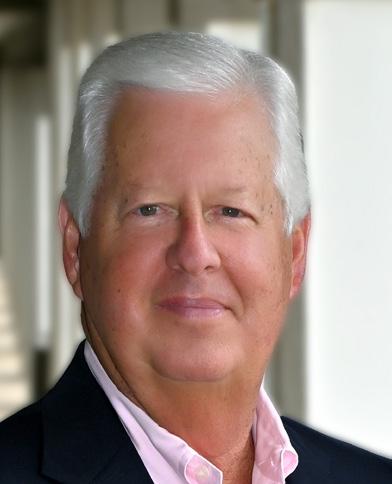

“It is an endorsement. There’s really, really high deductibles, but it is designed for quote-unquote ‘the big one’ — you know, a truly devastational event,” he said.
Adkins said he has earthquake insurance on all the rental properties he manages, as well as his personal home.
“We’re in an area that, with the fault along the Mississippi River, something could happen,” he said. “It’s just a good way to be covered, and it’s not very expensive.”
adequately covered and determine if any new endorsements might be a good fit for them.
“I think people don’t think that it’s going to happen to them, you know, and statistically, it probably won’t, but when something like a major hail storm or a tornado or even a flood happens, it’s usually worse than what they envision, and a lot of times, they just hadn’t planned mentally for an event like that,” Hodson said. “I mean, you don’t want to go around like Chicken Little, thinking the sky’s falling every time there’s clouds in the sky, but it always seems to be worse than people realize.”

By Lance Brownfield
Navigating the insurance marketplace as a consumer or business owner can be difficult, but there are challenges facing Arkansas-based insurance companies that many may not be aware of.
“Insurance is weird,” said Matt Cashion, president of the Cashion Co. Insurance and Bonds in Little Rock. “This particular sector, on the surety bonds, has been extremely profitable over the past 15 years.”
That has created an environment in which companies have saturated the market, making it very easy for contractors to obtain surety bonds.
Cashion said in 1935, the Miller Act passed, protecting tax dollars from contractor failure and ensuring that those working on a project or supplying the project with resources get paid. The act fills a legal loophole created by the fact that individuals cannot file a lien against themselves. That means that a subcontractor cannot file a lien against a government institution such as a post office or a school because that entity, as a taxpayer, is the owner.
“All the public construction that cities do, counties do, school districts do, states do, the federal government
does are all using our tax dollars,” Cashion said.
Payment bonds are designed so everyone who contributes materials or labor for a project gets paid for their services, which acts in place of their lien right.
Cashion said in the case of contractor failure, consumers can instead turn to the bonding company, which is oftentimes an insurance company. The insurance company is then responsible for having the project completed per the original contract. Since 1935, most states have come up with language that mirrors the Miller Act, he added.

“It’s important for having a federal deficit,” Cashion said. “I mean, it’s all we hear about anymore. Deficit, taxes are going to have to go up. If we don’t have enough money to pay for something once, we sure don’t have enough money to pay for it twice.”
The laws essentially serve as a credit function, a guarantee. Guarantees have not really changed over the years, he said, but how public owners go about procuring services has changed as laws, rules and regulations have changed.
Having taken over the company his father founded in 1975, Cashion deals mostly with local and state taxing authorities and provides property and casualty insurance for contractors, as well as surety bonds. He has a few clients that deal with the federal government through projects at the Little Rock Air Force Base in Jacksonville, at the Ebbing Air National Guard Base in Fort Smith and with other federal organizations.
“With the work that’s going on up there right now, there’s going to be close to $700 million worth of new federal construction projects in the Fort Smith area within the next 24 to 36 months,” he said.
Last year, Ebbing was chosen by the Air Force as the site for the federal Foreign Military Sales Program Pilot Training Center. Eleven NATO countries will send their pilots to the base to be trained to fly F-35 and F-16 fighter jets.
That means infrastructure projects to support the influx of soldiers and their families.
“That’s a lot of work, and so every bit of it has to have a bond on it to protect our tax dollars,” Cashion said. “Whether we can afford it, I don’t know, but the federal government is spending a lot of money on infrastructure. Whether it’s water and sewer, bridges, defense work, things of that nature, they’ve kind of turned the fire hose on in releasing a lot of federal dollars that the construction community is trying to absorb.”
While the center will further contribute to growth in the Fort Smith region, the rapid growth of northwest Arkansas in general has led to rising rates, one industry leader said. Marty Clark, president of BHC Insurance, which is headquartered in Fort Smith and has an office in Lowell, said northwest Arkansas has become the “biggest growth engine” for the firm.
Clark said BHC is the second-largest privately held insurance agency in the state, and its work is made up of roughly 65 percent commercial property and casualty and about 35 percent employee benefits for companies ranging from 25 to 500-plus employees. Those companies often fall in the space of manufacturing, construction, distribution and service industries.
With 30 years in the industry, Clark said the biggest change he has seen is technology.
“Insurance outlets now use tools that once were unavailable to evaluate risk, assessing the litigation environment across states, weather patterns and more,” he said.
Seemingly no industry can escape the societal upheaval caused by artificial intelligence. Currently, insurance companies can use AI to get rid of large volumes of clerical work, improve day-to-day processes, complete repetitive tasks and fulfill other time-consuming aspects of the job. As AI tools become more advanced and new applications are discovered, insurance companies can expect to use AI to predict risk more accurately using past data and figures.
Clark said BHC does not need a bot for those functions since the company acts as a broker. BHC is on the other end of the transaction and represents clients in front of carriers to get the best rates. It does, however, use technology to prove clients are safety-oriented, resulting in lower rates.
“If one of our companies that has a fleet of 100 trucks is using telematics to evaluate their drivers’ behavior and to be able to correct driver error in real time with the use of telematics, that’s a client who cares about themselves, and we sell that to the insurance marketplace to get them the best price we can,” he said.
Clark said GPS can help track a driver’s speed and course, allowing a safety manager elsewhere to see if the driver is speeding, braking hard or marking sudden sharp turns and to make corrections. When companies use tools like that, they become more attractive to
providers, he said.
Other uses include analyzing weather risks. According to the Federal Emergency Management Agency, several counties in Arkansas are ranked a “relatively moderate” risk for hail, and Pulaski and Washington counties are listed as “relatively high” risk. That translates to higher rates for property insurance and more restrictive terms, as well as limited availability in the marketplace.
“I think that, clearly, in the last five years, the biggest change by far in Arkansas has been the property market,” Clark said.

Insurance, of course, entails taking the good with the bad. Clark said policies for cyber liability and cyberattacks are becoming more important as digital threats continue to evolve.
With the changing digital landscape, companies must adjust, and BHC has seen many changes since it was founded in 1915. Clark and his partner, Shannon Schmidly, bought back the company from First National Bank Holdings in 2023 after 20 years as a subsidiary.
“To make an insurance agency successful, to make an insurance agency be able to perpetuate generationally, you’ve got to have young equity holders within your organization,” Clark said.
Clark, who sat on the bank’s board for the entirety of the 20-year relationship, said the “unprecedented move” came at a time when other insurance companies are selling to private equity. One of the motivations behind the decision was to lay a groundwork for his son, Paxton, to have an opportunity at ownership. The previous arrangement made it hard to attract and retain young workers and stay independent, he said.
Paxton is the third generation of Clarks at the company, which was formerly named Brown-Hiller-Clark & Associates Insurance. Marty Clark’s late father, Larry, joined in the early 1970s, followed by Marty’s brother in 1990 and Marty himself in 1993. Schmidly’s son, Graves, has also joined the team.
“When Paxton came in, there was not any potential ownership in his future because of the way we were structured with the bank,” Clark said. “Within a year and a half or so of him being here, I realized that he could be really good with this and I just couldn’t have a situation where he didn’t have ownership opportunities like I had ownership within the bank.”
The company now has 15 shareholders. Coming on in 2020, Larry Clark was able to see the family legacy continue because Larry knew Paxton was about to take a job at BHC before Larry died. Paxton started in the role a month later.
During a video chat ahead of the firm’s centennial anniversary in 2014, Larry was asked if his grandchildren might carry on the family business, and he responded, “there’s always possibilities.”
“Frankly, I thought the chances of having one son in the business was pretty remote,” he said, “so yeah, it’s been real rewarding, and I hope it goes another hundred years, you know, personally.”
The company plans to double in size in the next 10 years to manage more than 150 employees and become the dominant locally owned agency in the state and a market leader in the areas it serves. Its current footprint includes a 120-mile radius around Fort Smith that extends into northwest Arkansas, and there are plans to expand to Little Rock.
“In our business, everything is relationships, and it’s very critical that you build those personal relationships in the insurance business,” Clark said.
By Sarah DeClerk
Arobust benefits package is a key component of a company’s recruitment and retention strategy. Although Forbes reported in April that median cash prices are often less expensive than those hospitals negotiate with insurance when it comes to medical services and prescription drugs, health insurance is still part of the gold standard for employee benefits packages and helps provide financial security and peace of mind to employees.
Tracy Matson, director of sales at QualChoice, a commercial health insurance provider in Little Rock, said a study conducted by Glassdoor about 10 years ago found that health insurance was the most important benefit employees receive.
“It was ranked higher than vacation, [paid time off] or pension plans,” he said. “Needless to say, offering a quality health insurance plan is a very important tool in the toolbox for not only recruiting employees, but retaining them, as well.”
Life insurance and disability policies are also attractive benefits, he added.
“Both of these can add peace of mind to the employee about their family being taken care of if something happens to them,” he said. “Almost one third of U.S. households have had a main wage earner experience an illness or injury that has forced them to miss a month or more of work in the last 10 years. These are policies that should be considered.”
that your company is very happy with.”
Although business owners may be tempted to select the least expensive plan, doing so can sacrifice plan quality, he added.
“My advice is to think of health insurance as less of a cost and more of an investment in your business — an investment that will result in higher quality employees,” he said.
Forbes reported last year that Generation Z, who were born between 1997 and 2012, have surpassed baby boomers in the workforce, and as those upand-coming workers age out of their parents’ health insurance plans, they will likely seek out employer-provided insurance.
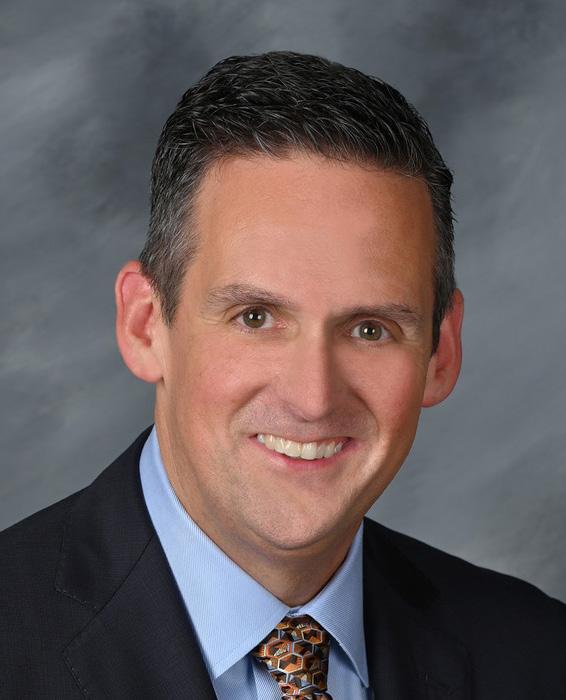
Tracy Matson
Businesses can use insurance brokers or contact insurance providers directly to select a plan, he said, adding that it is important to keep employees in mind and solicit feedback during the process.
“I think overlooking employee preferences is a common mistake that can lead to purchasing a plan that isn’t well received with your team,” he said. “Engaging your employees during the selection process can go a long way towards selection of a plan
“More and more Gen Zers will be in need of health insurance moving forward,” he said. “Carriers and brokers are probably going to be adjusting their sales strategies to align with this generation’s wants and needs.”
One trend he said he expects to grow in coming years is a focus on mental wellness.
“I believe there’s a growing recognition of the importance of mental health alongside physical health,” he said. “I believe employers will look more towards comprehensive health plans to support their employees’ overall health.”
Behavioral health has become a major focus for employers and insurers across the country, said Max Greenwood, vice president of government and media relations at Arkansas Blue Cross and Blue Shield.
“A focus on whole-person health, particularly when it comes to behavioral health, will continue to be on the rise,” she said. “Employers and health insurers will look at new, innovative ways to address depression, anxiety and substance use disorder as a way of improving total health outcomes and controlling costs.”
In addition, millennials and Gen Z have helped change the delivery of care and overall workplace health, she said, adding that digital tools and telemedicine became integral to the health care field during the COVID-19 pandemic. Insurance companies have had to adapt to the shifts, along with providers.
“Today’s health care consumers learned to appreciate multidimensional care models that balance in-person visits with digital care,” she said. “Consumers appreciate being able to see providers from the comfort of their homes on a smart device.”
Although it is difficult to predict the future of health insurance or insurance markets, she said, it is clear that health care costs are rising faster than inflation, and pharmacy is one of the fastest and least transparent cost drivers, which creates concerns about the affordability of medication and medical services.
“More one-off health solutions will continue to flood the market, vying for a slice of total health care spend,” she said. “Sifting through the noise to find real solutions that work will be important as health insurers and employers look to improve care, increase access and control costs.”
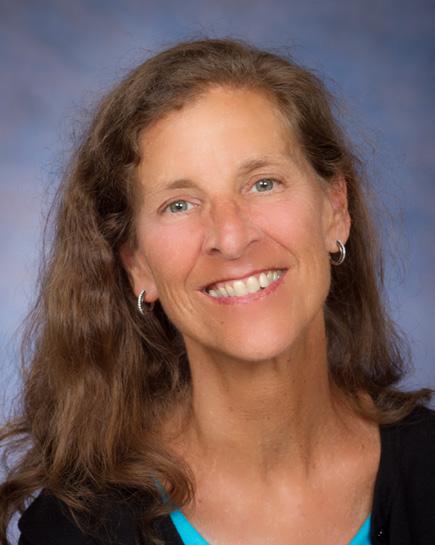

improve the employees’ oral and overall health.”
He added that a recent report by the Centers for Disease Control and Prevention found that untreated dental disease causes a productivity loss of more than $45 billion each year.
“A comprehensive group dental plan provides access for employees and their families to the care they need, resulting in a healthier, more productive workforce,” he said.
ALTHOUGH IT IS DIFFICULT TO PREDICT
THE FUTURE OF HEALTH INSURANCE OR
INSURANCE MARKETS, IT IS CLEAR THAT HEALTH CARE COSTS ARE RISING FASTER THAN INFLATION.
Health insurance is just one component of a wellrounded benefits package, and dental insurance is another offering employees might expect when they join a company.
“Dental insurance is the second-most requested employee benefit behind medical insurance,” said Jeb Steen, director of sales and account management at Delta Dental of Arkansas in Sherwood. “Having a comprehensive dental plan in the benefits lineup can help attract and retain employees. More importantly, it can
Although 90 percent of clients use an insurance broker, he said, companies can also contact Delta Dental directly.
While business owners may be tempted to only pay attention to monthly premium rates when selecting plans, it is also important to consider the size of the network, discounts on dental procedures and customer service, he said.
For example, Delta Dental offers a range of programs geared toward improving participants’ oral health, including the Right Start 4 Kids program, which allows dependents 12 and younger to have services completely paid with no deductible when seeing an in-network dentist, and the Evidence-Based Dentistry program, which provides additional cleanings for members that have medical conditions such as pregnancy, heart disease, diabetes and periodontal disease.
In addition, Delta Dental allows some members to carry part of their unused claims dollars for a year into the next year. To qualify, members must see a dentist at least once during the year and have less than half of their
annual maximum paid out. Qualifying members can carry over 20 percent of their annual maximum until the annual maximum doubles, Steen said.
“This is a significant incentive to offer employees for getting preventive treatments and a reward that can be really helpful if a member ever needs major services,” he said.
He added that subscribers often do not fully take advantage of their dental coverage, especially preventative care, which can prevent the need for costly treatments and help manage chronic conditions such as diabetes, heart disease and periodontal disease.
“Our clients are focused on wellness and looking for ways to use their insurance plans to drive outcomes,” he said. “In many cases, the goal is to provide access to care and educate employees about using their benefits, which removes barriers that prevent patients from getting the care they need.”
The company employs technology to increase access to care and recently began offering virtual visits through teledentistry.com, which Steen said can be a good option for after-hours and emergency care. In addition, Delta Dental is working to add a chat feature to its website, he said.
“The dental landscape is always evolving, and Delta Dental continuously looks for ways to improve the member experience,” he said. “We explore ways to expand access to quality care and build upon the role that dental plays in improving overall health. We are committed to providing world-class service, which means utilizing all resources and technology available to administer benefits more efficiently, communicate more effectively and provide members with every opportunity to improve their overall health.”
There are plenty of other kinds of insurance that employees can find in their onboarding packets, and providing options for employees seeking insurance makes an impact not only on workers, but on businesses, said Greg Poulakos, executive vice president of market solutions at USAble Life in Little Rock, which offers life, disability, dental and supplemental insurance, including accident, critical illness and hospital indemnity.
“Business owners should recognize that these insurance products play an important role in safeguarding both their employees and their business,” he said. “Life insurance ensures families are financially secure in the case of the untimely death of a key breadwinner. Disability and supplemental products can provide stability in challenging times, allowing families to focus on recovery and avoid financial stress.”
benefits that enhance employees’ benefits packages at no cost to employers, he said, adding that supplemental benefits such as accident, critical illness and hospital indemnity are now considered as essential as life and disability coverage when it comes to retaining employees and protecting their financial security.
“Particularly with the rise in high-deductible medical plans, these supplemental benefits can help defray increased out-of-pocket costs for employees without adding complexity and cost for the employer,” he said.
In addition, more companies have begun offering paid family or parental leave alongside disability coverage to help employees balance family and work responsibilities, he said, adding that state mandates and expanding private insurance programs have increased that interest.
“Over the past several years, in the absence of federally funded paid-leave programs, we’ve observed the proliferation of state-paid leave programs that are either state-run or offered and supported by private insurers that are evolving their product portfolios to meet the demand,” he said. “The brokerage community has also stepped in to help employers navigate the ever-evolving landscape.”
He added that his agency has seen more employers looking to bundle nonmedical employee benefits with a single carrier to increase efficiency and cost-effectiveness.

Insurance is not just for corporations, either; even small businesses can attract and retain employees by providing robust benefits packages that are flexible, customized to each employee and foster financial stability for employees, in addition to providing medical coverage, he said.
“For solo entrepreneurs or small business owners with few employees, it’s vital to prioritize insurance coverage tailored to their specific needs while caring for their greatest asset — their employees,” he added.
There is increased interest in offering voluntary, employee-paid
“The service experience for the employer and employee is becoming a primary consideration in the selection process,” he said. “More and more employers are considering factors beyond plan design and price to include service aspects such as online servicing, ease of billing, multiple payment choices, and streamlined and integrated claims service.”
Technology has also made an impact on the way insurance companies do business, and Poulakos said companies are racing to incorporate artificial intelligence into their operations to streamline mundane and repetitive tasks and enhance customer experiences.
“In the future, insurance is likely to become more personalized and data-driven with the increasing use of technology such as AI and big data analytics to assess risk more accurately,” he said. “We may see the rise of usage-based insurance models where premiums are based on individual behavior tracked through devices or apps. Overall, the future of insurance will likely involve greater customization, efficiency and adaptability to emerging risks.”
By Sarah DeClerk
Health insurance has been a hotly debated topic since former President Barack Obama helped pass the Affordable Care Act in 2010, and while universal coverage is an oft-suggested cure for America’s health care woes, some evidence suggests that the cash prices for medical services are often less expensive than the prices negotiated by insurance companies.
“In many cases, cash price is often cheaper than commercially negotiating the price for both shoppable services and some non-shoppable services — shoppable meaning you can shop around for the service,” said Ge Bai, professor of accounting at Johns Hopkins Carey Business School.
Bai, who discussed her findings in two recent Forbes articles, “Why are Cash Prices Lower Than Health Insurance Negotiated Prices?” and “Expensive Health Insurance Premiums by Design.” She and her team began to study medical prices after former President Donald Trump signed the Executive Order on Improving Price and Quality Transparency in American Healthcare in 2019. The order, which was renewed by President Joe Biden, made prices for all Medicare-certified hospitals available to the public.
“That gave my team a good opportunity to research on this question,” she said. “Otherwise, we did not even have this transparency before.”
to have very lean or skinny health insurance only covering major, major things, the essential things. That will drag down insurance premiums significantly. Then you pay less for the insurance premium. Then you have a chunk of money in your savings account, and then you’ll use that to pay cash price for nonmajor services. That actually is a great savings opportunity.”
She added that she would advise anyone with a highdeductible plan to ask about the cash price when receiving a medical service. While companies such as Cost Plus Drugs and Costco have helped make paying cash for prescription drugs a part of the public ethos, that phenomenon has yet to take effect with other medical services, she said.

Although she found that insurance-negotiated prices were routinely more expensive for both shoppable and nonshoppable services, as well as prescription drugs — Arkansas in particular was a frontrunner in the gap between prices for trauma activation — Bai does not recommend doing without health insurance.
“I don’t think that’s a good idea,” she said. “They want
“I think people already can get an idea that the cash price can be a good option for buying drugs, but I think in terms of medical care, medical services, we need more public awareness,” she said.
The current system encourages spending and does not do much to incentivize healthy habits and shopping for low-cost providers, she added. By paying cash for most services and reserving insurance for financially devastating events, people from all walks of life can save money, and the marketplace will benefit, as well, she said.
“We are spending a lot of hidden money on purchasing health insurance,” she said. “A better approach might be we control our own health care dollars in some type of savings account and then use that to buy services — that is, nonmajor services, non-catastrophic — and then let the insurance only cover major, expensive services. That will actually generate a lot of savings and promote competition and innovation in the market.”
By Paul Sage
Monica Treat is on a mission to help seniors untangle the Gordian Knot of Medicare. As owner of Treat Insurance Agency, an independent provider of consultation and coverage for those on Medicare, Monica’s work is never simple. After 16 years of owning and managing her company, Treat Insurance Agency in North Little Rock, Treat and her staff of five help make the daunting landscape of Medicare options palatable.
“I try to never forget how confused I was when I first started selling Medicare,” Treat said. “It is like speaking Russian. Everything has an acronym — the OEP, the AEP. There’s a PDP and IRMAA.”
OEP is the open enrollment period during the first quarter of the calendar year, when beneficiaries are allowed to make limited plan revisions. AEP is the annual enrollment period Oct. 15 to Dec. 7, when beneficiaries can make multiple changes.
“AEP is the equivalent of our tax season. We’re just slammed,” Treat said.
mine exists. You can leverage someone like us to go over [Medicare], make it simple and give you simplistic options. We can handle all of it for you.
“Our heart’s desire is that when customers walk out of our office, they can have complete confidence in the plan that we put them on and peace of mind on a very daunting decision. I think that’s what sets us apart. We’re not selling insurance. We are selling peace of mind.”
As people approach age 65, they must make the major shift from standard medical insurance to Medicare. Treat said she advises an initial meeting “about three months before you turn 65.”
“Our business is very referral-driven. We get walk-ins, but I would say 95 percent of our business is from referrals of clients and financial advisers.”
PDP is the prescription drug plan, also known as Medicare Part D. IRMAA stands for income-related monthly adjustment amount, the income-based fee paid for Medicare Part B coverage for doctor and outpatient services. The popular Medicare Advantage Plans include Parts B and D, as well as Part A, which covers hospitalization.
There is so much to decipher. Treat said the number of plan options is vast and can be a challenge for anyone.
“I have bank presidents, very intelligent people that come to me, and they’re just like, ‘Oh my gosh, like I’ve tried to figure this out, but I just don’t want to,’” she said. “The No. 1 thing is knowing that an agency like
“That’s an ideal time for us to sit down and visit with you and go over the options,” she said. “If somebody comes and sees us two weeks before, we can still work it out, but ideally [earlier] would be perfect.”
Treat Insurance is an independent agency that sells a wide array of policies from multiple insurance providers.
“I would say that we easily offer between 80 and 90 plans,” Treat said. “If you call [a single-brand] insurance company, they’re only going to offer you their products. You’re likely going to talk to somebody that hasn’t been in the business for 16 years and doesn’t have our knowledge about IRMAA and all the intricacies, and so they’re going to push their [own] product. The benefit that we bring to the table is that we can be unbiased and tell you the pros and cons of those companies and their plans.
“You don’t have to be pigeonholed into one carrier because a lot of times these carriers are strong in one segment of Medicare, but then maybe their
prescription drug plans aren’t strong at all, and if you go directly to that carrier, they’re going to try to sell you on [all their plans]. You probably aren’t getting the biggest bang for your buck doing it that way.”
Crafting a Medicare insurance portfolio for a customer requires a lot of work and individualized attention, she said.
“There are more plans than ever, more companies offering plans. We feel like we’re consultants,” she said. “If somebody comes into our office, we are truly unbiased. If they ask, ‘Monica, which one do you think is the best?’ I don’t have an answer until I dive into their situation, their medical history. Do they go [to the doctor] a lot? Are they getting ready for a big surgery? Do they have a lot of injections at the pain doctor? We get a list of their doctors, we have them bring in their medications, and we put all this into our system to make sure we’re putting them on the best plan with the best company.”
Treat said her business thrives with almost no marketing investment.
“The biggest compliment in business is when people refer their loved ones, friends and family,” she said. “Our business is very referral-driven. We get walkins, but I would say 95 percent of our business is from referrals of clients and financial advisers. They’re a great referral source because they’re sitting down with their clients at Medicare time. They refer us a lot of business. We do very little advertising.”

auction, and she would be right next to all these powerful men, and she would be bidding against them to buy the car.
Treat attributed her tenacity and work ethic to the influence of her mother.
“My mom passed away about two years ago. She was my inspiration, my role model. She was a single mom. She was very, very strong, she was fierce, she was business smart, and she raised me to be independent,” she said. “My husband has a wonderful, booming business, but I’ve always wanted to be independent whenever it came to business and always be able to take care of myself.
“[My mother] instilled that in me at a young age, and so my heart’s desire was to always work hard. I watched her be a woman in a man’s business. She was one of the first women in central Arkansas that became a car dealer. She was a wholesaler, so she would go to the
“She was very well-respected because she was smart, and she took her business seriously. She taught me to hold my own, to persevere through hard times. She never gave up. I was inspired by watching her. There’s no way I would be who I am today had I not watched her life.”
Treat’s roots are deep in the soil of Sherwood. She is an alumna of Sylvan Hills High School and is a candidate for the Ward 4 seat on the Sherwood city council.
“My husband and I are high school sweethearts. We’ve been together since we were 16,” she said. “We still live in Sherwood. It is our hometown. I want to advocate for my alma mater, Sylvan Hills, to get its own school district. I’m also passionate about bringing more economic development to our city through new restaurants and entertainment.”



JOINT REPLACEMENT? WE’RE

We’re helping all Arkansans manage their Joint Replacement journeys through our guidance, knowledge and support. Comprehensive care means fellowshiptrained physicians work hand in hand with a dedicated team to provide care worthy of our patients and those that love them.
O R THO F OR ALL Arkansans.

The landscape of entrepreneurship is ever evolving, and tech startups play a pivotal role in driving innovation and economic growth. Among the many initiatives designed to foster this growth, the Fuel Accelerator, a program of Startup Junkie Foundation, stands out with a high-water mark of success. This 10-week enterprise-ready accelerator has not only propelled numerous startups toward success but is also having a palpable impact on the Arkansas economy.
The Fuel Accelerator is designed to match seed- and growthstage tech startups with key enterprise partners. With three specialized tracks — health tech, cyber security, and artificial intelligence and machine learning — Fuel puts a spotlight on operational value training, making the accelerator a unique offering in the startup ecosystem. The program accepts eight to 10 high-growth startups per cohort and provides participants with unparalleled access to enterprises, funding opportunities and mentorship-driven programming.
Fuel’s targeted approach ensures that participating startups receive tailored support and resources that align with their specific industry needs. The in-person nature of the program fosters a collaborative environment in which startups can engage directly with mentors, enterprise partners and peers, driving mutual growth and learning.
Since its inception in 2019, the Fuel Accelerator Program has demonstrated an impressive growth trajectory. Starting with a single cohort of eight companies, the program expanded to two cohorts and 14 companies in 2023. This year, Fuel will host nearly 30 companies across three cohorts. This growth is a testament to the program’s effectiveness and the high demand for its unique approach to startup acceleration.
To date, more than 60 companies from across the country and around the globe have been served by the Fuel Accelerator. One of the most recent success stories from the program is Path Fertility, a Salt Lake City-based company that addresses significant gaps in reproductive health diagnostics. Path Fertility was a member of this spring’s Fuel Health cohort and made the decision to relocate to Arkansas by the end of the program, further cementing Fuel’s impact on the state’s business landscape.
Path Fertility follows 2023 participants Smart Eye Technology (Atlanta), CLIPr (Kirkland, Washington) and Youthful Savings (New York City) in relocating their growing companies to the Natural State. Other out-of-state Fuel alumni that now call Arkansas home base include Ox (2019), Ship.com (2019), Fr8relay (2020), Junction AI (2021) and Simporter (2021).
An additional 22 companies have opened offices in Arkansas. That influx of innovative companies has brought fresh energy and dynamism to the Arkansas business environment.

The Fuel Accelerator’s influence extends beyond the success of individual startups. The program’s impact on the Arkansas economy is becoming palpable as Fuel drives capital inflow and attracts attention from investors and enterprises from well outside the region.
Over the past two years, the program has gone from zero to more than 20 actively engaged venture capital firms. That influx of venture capital interest attracts even more investment into the state, creating a virtuous cycle of growth and innovation.
Companies that have relocated to or opened offices in Arkansas as part of the Fuel Accelerator have collectively raised over $100 million in capital, and millions more is expected to be injected into the state through the ongoing efforts of these companies in the coming weeks and months. This financial boost also creates job opportunities and contributes to the overall economic vitality of the state — all of which serves as a return on investment for program funders at the Arkansas Economic Development Commission and the Walton Family Foundation.
Startup Junkie’s Fuel Accelerator has become a lighthouse for seed- and growth-stage startups looking to succeed in Arkansas. However the program has not only propelled numerous companies towards success but has fostered measurable economic activity set to spur positive outcomes in the Natural State for years to come.
As Fuel continues to grow, it promises to bring more innovative, high-growth potential companies to Arkansas, driving economic growth and helping reinforce the state’s emerging reputation as a hub for tech innovation.
For more information and to stay up to date on the latest cohorts, visit FuelAccelerator.com.



Business success is measured in many ways.
This year, Arkansas Money & Politics again asked readers to say which were their most admired companies in the Natural State. Using financial soundness, bold innovation, brand awareness, quality of product, outstanding people and social responsibility as the criteria, they did just that in the categories that follow.
We hold all businesses in high esteem, especially after the roller coaster ride of the early 2020s, and we tip our hat to those owners who managed to adapt, navigate and survive. This year, readers told us which companies they admired most. Enjoy the 2024 list of AMP’s “Most Admired Companies,” which follows feature stories on two of this year’s inductees.
By AMP Staff
It is not hard to see why Pettus Office Supplies/Pettus Interiors in Little Rock is an institution beloved by customers and employees alike.
Established in 1989 by Amanda and Lynn Pettus, the company begins each day with a goal to create a family-run business that offers quality products, exceptional value and remarkable customer service.
Thirty-five years later, that strategy seems to be working. The company has grown into the largest independent office supply dealer in Arkansas and provides professional sales and furniture design teams that offer custom-tailored furniture sets for the office that are functional yet aesthetically pleasing.
“We believe that a welldesigned office environment can enhance productivity, inspire creativity and create a positive work culture,” said Ashley Vaden, a project manager in the Pettus distribution center in southwest Little Rock.
Vaden lauded the company’s ability to provide great service at competitive prices and noted its appeal as a place to work.
“It’s family-oriented,” she said. “Mr. Pettus comes in every day to see us. His wife is in accounting, and he has a nephew working here. His son, Josh, is involved too.”
Since its inception, Pettus Office Products has strived for excellent customer service. It’s done that, Vaden said, while becoming one of the largest office furniture dealers in the South. In addition to its Little Rock base, Pettus has two north Louisiana locations in Bossier City and Monroe.

The company maintains the core principles on which it was founded. The one at the top of the list says once customers buy from Pettus, they will never have to try another office supply company.
Pettus’ membership in the TriMega office products purchasing network helps enable the company to meet its own high standards. TriMega membership affords Pettus more than $10 billion in buying power, allowing it to source bargains directly from major manufacturers and suppliers and serve all sizes of businesses.
“We have a lot of company outings,” Vaden said. “We’ll have picnics, and we’ll go to [Arkansas] Travelers baseball games. It’s a great place to be. Everyone is treated just like family.”
Among the Pettus office furniture options are desks, chairs, filing cabinets, storage solutions, conference table and more, including design services and recycling and disposal services for old or unwanted furniture.
“We understand the importance of creating an office environment that is comfortable, productive and reflective of a company’s brand and culture,” Vaden said. “We take pride in our commitment to exceptional customer service, and we believe in providing personalized solutions that are tailored to clients’ specific needs. Whether they need help designing an office space, selecting the perfect furniture pieces, or arranging delivery and installation, our team is always available to offer guidance and support.”




§ Relevant, high-wage career and technical programs
§ Associate degrees that comprise the first two years of a bachelor’s degree
§ Short-term, customized workforce training classes


§ A robust concurrent student program that allows high school students to earn college credits or fast track into a career
State-of-the art equipment, technology, and labs
Tuition rate that provides an excellent value

From the way your parents handled money to your plans for retirement—many factors impact the way you view your wealth. We take the time to understand who you are, your vision of your future, and what you need from your financial partner. From there, we develop solutions that are as unique as you are. We make it easy to work with us so your life is less complicated and you can enjoy what you value most.


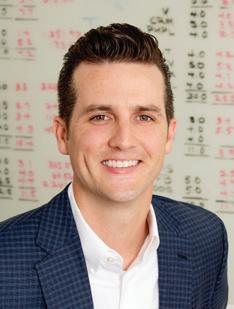


Conway Regional has been the community’s hospital for more than 100 years, providing high-quality, compassionate care. As our communities grow, we are growing alongside you to ensure all of your healthcare needs are met right here in Conway. When your family needs medical care, you can trust our team to provide you with the comprehensive care you deserve when you need it most.


By Lance Brownfield
For almost four decades, Gary Houston Electric Co. has provided central Arkansas with commercial and residential electrical contracting services. The company offers a variety of services, from whole-home generator installs and preventative maintenance to USB-C outlet installation, landscape lighting and more. The company has even built charging stations for electric vehicles.
The company is named for its founder, Gary Houston, who followed in the footsteps of his late father by becoming an electrician and started the company in 1975. Since then, the team of one has grown to about 60 employees, all in the Little Rock area. President Keith Weeks has been with the company for more than 30 years and worked his way up
from apprentice to his current position.
“Our biggest accomplishment is our team as a whole here at Gary Houston Electric,” Weeks said. “Their growth and accomplishments have been nothing short of amazing to watch over the years, and I can say without hesitation that they are what I’m most proud of.”
Weeks joined the company at age 22, earning his journeyman’s license four years later. He then earned a master electrician license before moving into the office as an estimator. He held the position of vice president and now is the owner and president of the business alongside vice president and business partner Mitchell Shelby.
His style of leadership is built on adaptability and staying
up to date on the changes in the marketplace. He said the electricians on the frontlines bring policies to life and praised his team, saying, “I could not do it without them, but they could all do it without me.”
According to Alicia Bardo, client relations manager, hiring a professional for projects that involve commercial, residential, new construction and custom lighting is important for a number of reasons. Among them is enjoying the peace of mind that comes with hiring people with the expertise and knowledge to deliver quality workmanship and customization and design efficiently and cost-effectively.
“Overall, opting for a professional for lighting projects can save time, reduce stress, and ensure that the end result is of high quality and meets the client’s expectations,” Bardo said.
She added what sets Gary Houston apart is personalized service, an experienced team, competitive pricing and attention to customer service.
“By combining these features, Gary Houston Electric sets itself apart from other electrical companies in the industry,” she said.
Those are just some of the reasons customers keep coming back to the team at Gary Houston, and the team is just getting started. The company is looking to expand services and invest in employee development in the coming years to further improve customer satisfaction.
“The majority of our work comes from repeat customers, whose relationships we strive daily to build and maintain,” Weeks said. “We’ve never lost sight of the fact that our customers are the ones that have made all of our accomplishments possible, and we want to serve them in a way that reflects that.”
It is not easy putting together a crack team given the shortage of skilled laborers in the electrical field. That has made it difficult to find qualified workers, Weeks said.
“Supply chain disruptions have been another huge challenge,” he said during a previous interview with Arkansas Money & Politics. “We’ve faced material shortages and price fluctuations that impacted project timelines and costs, but we are proactively addressing these challenges and adapting to changing industry trends.”
Through the years, there have been many ups and downs that have followed numerous changes to the industry, but Gary Houston Electric Co. has stood firm. Through it all, the company remains a provider of choice as it provides power solutions

to central Arkansas residents and businesses, adapting as needed and learning from past leadership.
“If I needed to, I could call [Houston] today, and he would give me some wonderful advice,” Weeks said. “I would not be anywhere without him. Gary taught me to overprepare, and I have used that several times since. It always seems to work out.”
While looking to the future, it is important to remember the past, Weeks said, drawing on the lessons he learned from Houston to strengthen the business. Many of those lessons were about communication — presenting information to customers in a pleasant way using body language and gestures while taking note of nonverbal cues to give customers the best experience possible.
Even though it has nothing to do with wiring, amps and ohms, that consideration helps the company stand apart from others in the industry. Today, Weeks tries to impart this wisdom to the younger generation every time he gets a chance.
“The most important thing that Gary Houston Electric does is provide essential electrical services that contribute to the safety, comfort and functionality of homes, businesses and communities throughout the state,” Weeks said.

HCJ CPAs & Advisors in Little Rock is more than a typical accounting firm. While others may see the accounting industry in black and white, HCJ sees it in color. There is no standard solution for all clients, and HCJ does not just check the box and move on. The company’s individualized recommendations are as unique as its diverse staff members. For more than three decades, HCJ has provided high-quality accounting, tax and audit services to a varied group of clients within and beyond the borders of Arkansas. The company rests on a solid foundation of client service and prides itself on core values of integrity, trust, professionalism, independence and service to clients and the community.

Hot Springs’ SixtyOne Celsius, a leader in Arkansas’ creative communications industry, is known for its creative work in website design, marketing, video production, social media management and public relations. Since 2016, the Hot Springs-based advertising agency has helped to secure $75 million in community improvement projects for Hot Springs and Garland County ranging from infrastructure to expanded museum facilities and a state-of-the-art baseball complex. The agency’s partnerships with organizations such as Stone Bank, the Mid-America Science Museum and Levi Hospital are a testament to its consistent, high-quality service.

Wayne-Sanderson Farms was formed from two leading poultry companies with humble roots in farm supply and feed manufacturing and boasts more than a century’s worth of industry expertise and excellence in operation. Based in North Carolina, the company operates a fresh processing plant,
hatchery and feed mill in Danville. As the nation’s third-largest poultry producer, more than 26,000 team members and 2,000 family farmers make up the company, which is dedicated to delivering high-quality, affordable poultry products to consumers around the world. A strong operating culture and industry-leading teams help Wayne-Sanderson Farms do what is best for its stakeholders made up of team members, growers, customers, communities and shareholders.

WDD Architects, an architectural firm based in North Little Rock, was founded in 1919 with the goal of providing clients with creative design solutions for a variety of project types. Now in its 105th year of continuous business, the organization continues to serve Arkansas through its founding principles of creating signature design solutions for all clients. WDD has designed many significant projects, including Little Rock Central High School, the Statehouse Convention Center in Little Rock, the American Taekwondo Association World Headquarters in Little Rock, the Mid-America Science Museum Hot Springs, Springdale High School, Maumelle High School, the Stephens Building in Little Rock and Donald W. Reynolds Razorback Stadium in Fayetteville.

Wilson Real Estate Auctioneers specializes in the marketing and advertising of all types of real estate, including luxury homes, lake homes, row-crop farms, recreational farms and commercial property. The company has sold in every county of Arkansas and conducts more than 100 auctions live and online every year. Wilson has averaged more than $30 million in real estate sales the past five years in a row. A third-generation family business, Wilson has brokers and agents with more than 100 years of combined real estate experience and with backgrounds in banking, titles and engineering. Wilson agents are located in Little Rock, Pine Bluff, Conway and Hot Springs.

The service never stops at Mercedes-Benz of Little Rock. Offering a wide selection of new and pre-owned vehicles at 8 Colonel Glenn Plaza in Little Rock, the dealership proudly serves drivers from all across the state. Mercedes-Benz of Little Rock brings class, sophistication and elegance to customers’ driveways. The staff works to create customers for life.

Founded in 1986 by some of the nation’s leading political, business and philanthropic leaders, Arkadelphia-based Southern Bancorp is a unique financial institution that was created to help strengthen underserved communities through financial access and investment. By combining traditional banking and lending services with financial development tools such as Department of Housing and Urban Development-certified housing counseling, credit assistance and small-business support, Southern Bancorp helps families and communities grow financially stronger — regardless of ZIP code, income level or starting point.

The BIG Agency in Little Rock is a consulting firm that is all about helping clients make moves and create real change. It knows how to identify the right markets, build brands that speak to and engage people, and tell stories that inspire. The BIG Agency uses creativity, innovation and strategic thinking to tackle today’s challenges and build a bigger and brighter future. The firm’s philosophy is "1 percent better every day."
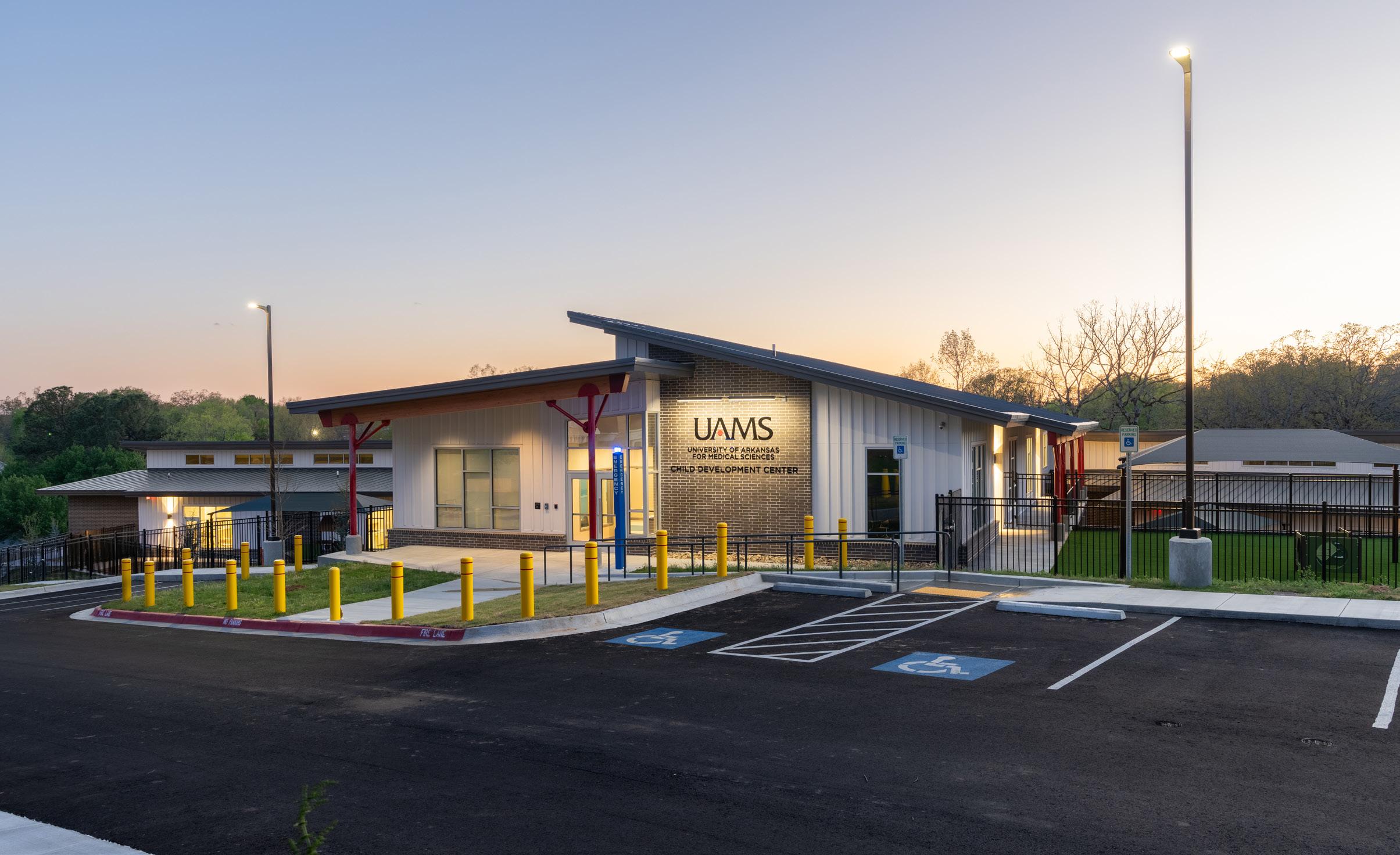


Founded in 2006 in Fayetteville, C.R. Crawford Construction is a full-service construction company that specializes in client satisfaction through project planning, construction management, general contracting and design-build services. Founder Cody Crawford established the company on the core belief that by listening to client needs, understanding the uniqueness of each project, and honestly communicating with architects and clients, strong relationships and successful projects would follow. As one of the largest and most trusted designbuild, general contracting and construction-management companies in the state, the company has completed more than 800 projects across the United States.

Founded in 1904 and located in Hot Springs, Oaklawn Racing Casino Resort is one of the premiere thoroughbred racetracks in the country. The casino features slots, live table games and sports betting year-round. Live racing takes place from December to May, and simulcast racing is available throughout the year. Guests can visit the Forbes Travel Guide-recommended Oaklawn Hotel, the multipurpose event center, Arkansas’ only Forbes four-star spa — the Astral Spa — and several dining options. The resort is also moments away from Hot Springs National Park, historic Bathhouse Row and two of the state’s most scenic lakes, which makes Oaklawn a hub for those looking to explore the Hot Springs area.

RX CATERING
Rx Catering is a professional catering company that has served the Little Rock area
for more than two decades by providing delicious meals for meetings, conferences and more. The creators and owners of Rx Catering have more than 60 years of catering experience, and the company prides itself on professionalism, punctuality and service. Rx Catering can cater events of any size in Little Rock and the surrounding areas. Originally focused on the medical field, Rx Catering has branched out to provide services to a broad range of customers, from corporations to private individuals. Rx Catering specializes in catering at hospital facilities, private and office parties, professional and corporate functions, and weddings and receptions.
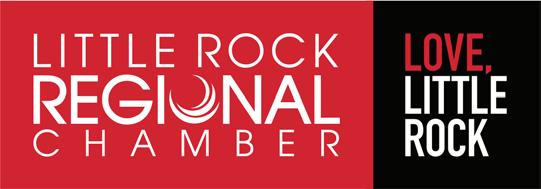
The Little Rock Regional Chamber is the principal business-driven leadership organization responsible for fostering the economic growth and development in the Little Rock region to ensure that business and industry can operate profitably and enhance the earning opportunities and quality of life for every citizen. The chamber embraces the challenge of providing personal service and direct value for all members while at the same time providing community leadership and vision. The chamber’s goal is an inclusive, thriving and vibrant Little Rock region that is meaningful to each business and resident. Founded in 1866, the chamber is the oldest association in Arkansas.

New Life Church is committed to working alongside others to bring the hope of Jesus Christ to Little Rock and Arkansas and to see the community changed forever. New Life Church began as a gathering in Pastor Rick and Michelle Bezet’s home, where they built relationships and started the first NLC life group. In 2001, New Life held its first service in an old car dealership in downtown Conway, and it now has 17 locations across the state. New Life Church is dedicated to loving and meeting the practical needs in its communities while also focusing on evan-
gelism, church planting and training on a worldwide scale. With the Great Commission at the forefront, NLC strives to bring the hope of Jesus to others — from neighborhoods to nations and to all circumstances, socioeconomic statuses and lifestyles.

The University of Arkansas Community College at Morrilton is a two-year college within the University of Arkansas System that offers a comprehensive curriculum of university-transfer and career-specific training programs, as well as adult education, concurrent education and training, and noncredit workforce training programs. The college has served west-central Arkansas since 1963 and has an enrollment of approximately 2,000 credit students per semester. UACCM’s skilled training programs offer certificate of proficiency, technical certificate and associate degree options to accommodate students with a variety of career goals. The Associate of Arts and Associate of Science degree programs allow students to complete the first two years of a bachelor’s degree before transferring to a four-year university.
For more than 135 years, Ouachita Baptist University in Arkadelphia has been committed to encouraging a love of God and a love of learning. As a leading liberal arts university, Ouachita has earned a strong academic reputation. That, combined with a close-knit campus community, creates a setting where students can thrive academically, spiritually and personally. Ouachita has been ranked among the nation’s top colleges by publications such as U.S. News & World Report and Forbes. Students also earn state and national recognition for accomplishments ranging from scientific research and business competitions to student publications and musical performances.







Sunstar Insurance of Arkansas started 10 years ago and has grown to be one of the largest groups in Arkansas. It is based in Little Rock and soon will have 14 locations across the state and 120 dedicated insurance professionals. The Sunstar model is working — nine different agency partners have come into SIOA since it came to Arkansas. SIOA features an impressive array of agency leaders with vast experience, which is key to draw on during today’s very uncertain insurance and weather-pattern times. Sunstar is a trusted advisor for clients around the state and acts as a tour guide through the world of insurance.

The Winthrop Rockefeller Institute is a nonprofit conference and retreat center located atop Petit Jean Mountain and has a mission to continue forger Gov. Winthrop Rockefeller’s collaborative approach to transformational change. The center engages its resources and Winthrop Rockefeller’s values to convene purposeful gatherings at his historic cattle ranch. The center does that work by employing the “Rockefeller Ethic,” which represents the belief that diversity of opinion, engaging in respectful dialogue and practicing collaborative problem-solving combine to create transformational change. The productive energy of the mountaintop location coupled with the highest levels of hospitality ensures all who convene can do their best work. The center helps groups have impactful meetings by offering professional development workshops, culinary team building, and professional facilitation and meeting design services.

Founded by William Clark in 2009, Clark Contractors provides full-service general contracting and construction management. Headquartered in Little Rock, the company also has had offices in Dallas-Fort Worth since 2010 and in northwest Arkansas since 2015. Clark Contractors has a proven history of successful commercial, corporate, cultural, educational, health care, hospitality, midand high-rise condominiums, industrial and retail construction projects. Clark Contractors looks for ways that technology can be implemented, such as with drone and building information modeling projects. In addition to its technical expertise and craftsmanship, Clark Contractors is proud of the family-like bond it has created and the camaraderie that is reflected by an average tenure of 22 years in its management team, and many workers have worked with each other longer that the company has existed.

As North Little Rock’s destination marketing organization, North Little Rock Tourism strives to ensure positive experiences for visitors for activities ranging from family vacations to corporate meetings and sports programs to special events. North Little Rock Tourism develops, markets and advocates to drive tourism and, in doing so, creates and promotes an inclusive environment for people to make vibrant memories in North Little Rock.

Dr. Suzanne Yee is one of Little Rock’s leading cosmetic surgeons. With passion and artistic sensibilities, Yee has been leading the industry of cosmetic surgery for more than 20 years as a triple-board certified cosmetic surgeon. With years of extensive study in medicine and continued education, Yee founded her practice on the principles of artistry and innovation, offering
full-body surgical and nonsurgical procedures. Yee performs treatments ranging from advanced laser therapy to comprehensive “mommy makeovers,” priding herself and her practice on the ability to help patients feel comfortable in their decision to undergo any procedure. Yee offers a variety of options such as Botox, dermal fillers, and laser treatments, as well as surgical options for facial and body rejuvenation. As the first surgeon in Arkansas to offer Renuvion Skin Tightening, BTL Emsella and NeoGraft Hair Restoration, Yee has long been an innovative force in Little Rock’s cosmetic surgery community.

Arkansas Federal Credit Union has made a difference in the lives of employees, members and the communities it serves since 1956. With more than $1.5 billion in total assets and more than 300 employees, Arkansas Federal is the largest credit union in Arkansas. As a not-for-profit financial institution, Arkansas Federal invests profits back into benefits for members through higher dividends and lower loan rates. Both consumers and businesses entrust the credit union to get competitive rates and reduced fees for accounts and loans. Founded in Jacksonville and now based in Little Rock, Federal has branches throughout Arkansas that serve more than 120,000 members.

Pinnacle IT has been a leading technology solution provider in central Arkansas and surrounding areas for more than 30 years. Under the leadership of CEO Chris Bates, Pinnacle IT excels in addressing the cyber and data security challenges that all companies face and has a particular focus on helping health care organizations maintain privacy law compliance. Based in Little Rock, Pinnacle IT employs nearly 50 information technology professionals and has offices throughout the Natural State that provide 24/7 help desk support and system health monitoring. The company’s service



area spans all of Arkansas. Pinnacle IT offers a range of services, including IT management, email spam protection, cybersecurity, data backup and recovery, cloud services and server support.
Metro Disaster Specialists is a proven leader in all disaster situations and has a long history of professional approach and practical knowledge applied as an essential source for both property owners and insurance professionals. Based in North Little Rock, Metro Disaster Specialists is a licensed disaster general contractor that provides 24-hour emergency service response to clients. Metro specializes in providing rapid and reliable services, handling virtually any circumstance to secure clients’ property and contents against further damage. Metro has a proven portfolio of more than 30,000 completed projects and 280 years of combined restoration and reconstruction experience. Metro continues to constantly invest in its team by striving to uphold the industry’s top certifications and training. With two certified restorers on staff, Metro is qualified to handle losses of any size. As a proud member of the Restoration Industry Association, Metro is an advocate for best industry practices.

As a family-owned distributor of quality cleaning products, Myers Supply in Hot Springs appreciates the challenges its customers face daily. The company constantly adds innovative product systems supported by a professional sales team and outstanding training materials to ensure customers’ success. The experienced chemical and technical staff at Myers Supply works to find new ways to make cleaning and sanitation easier and safer. With vast resources and facilities in Hot Springs and Little Rock, Myers Supply is able to supply central Arkansas with the finest facility products at competitive prices. Since 1955, the success of Myers Supply has been the direct result of its phi-
losophy of developing and nurturing longterm business partnerships.

For more than 35 years, Gary Houston Electric Co. has served Little Rock and central Arkansas by providing affordable, quality and timely commercial and residential electrical contracting services with a strong emphasis on customer service. Constantly looking for opportunities to serve new customers, the company’s areas of expertise include homes, retail spaces, restaurants, offices and warehouses, among others. The company services both new construction and existing structures that need electrical repair or are being remodeled. Most work comes from repeat customers, relationships with whom the company strives to build and maintain. In addition to commercial and residential electrical services, Gary Houston offers facility maintenance and emergency electrical services.

Founded in 1999 in North Little Rock, Travel Nurse Across America was put in motion by people who believed they could change the health care traveler industry for the better. With a culture of honesty, transparency and customer service, TNAA has continued to grow in its four values: owning one’s relationships, simplifying the process, obsessing over the experience and defending the culture. TNAA is one of the fastest-growing health care staffing firms in the country and has partnered with hospitals across the United States to provide the most qualified nursing and allied talent. Focused on procuring and placing skilled travelers has created tangible results for partners, including lower readmits, better assessment scores and more. TNAA has a 70 percent retention rate, which translates to greater continuity of care.

Garver is an employee-owned, multidisciplined engineering, planning and environmental services firm with more than 1,200 employees across the United States. Since 1919, Garver has been on the ground floor of the highways, bridges, airport runways and water treatment plants that communities need to grow and prosper. What started as a one-person engineering firm with a short list of projects has since evolved into a leading engineering and consulting firm that works in communities across the country. Offering a wide range of services focused on aviation, buildings, construction, enterprise solutions, federal, survey, transportation, water and wastewater, Garver sits in the top 100 of the Engineering News-Record’s prestigious “Top 500 Design Firms” list and is consistently recognized as a best firm to work for. For more than a century, Garver has prioritized good stewardship in the community and now does so through its award-winning philanthropic arm, GarverGives.

North Little Rock’s Snyder Environmental has the qualified workforce, equipment and programs necessary to manage asbestos, lead-based paint and mold removal projects in extensive commercial, industrial, federal and military settings. Whether it is one large facility or multiple small projects, Snyder has the experience to complete the most complex projects on time and within budget. Snyder’s extensive abatement footprint serves Arkansas, Tennessee, Mississippi, Missouri and Oklahoma. Snyder Environmental has completed more than 5,000 abatement, remediation and decontamination projects across various business sectors and structures. In addition to abatement services, Snyder Environmental provides duct cleaning, select interior demolition and decontamination services. With Snyder, clients receive more than quality






R K A N S A S ’ D I A M O N D , B R I D A L & F I N E J E W E L E R






work and attentive service; they gain the peace of mind that their environments are clean, safe and compliant.

Most people, even those who are financially accomplished, can find it difficult to put the pieces of their financial puzzle together. That is because there are so many facets of wealth — investments, estate plan, tax planning, insurance and more — that must work in tandem to achieve one’s greater goals. The question is how? Meridian provides evolving advice and sophisticated solutions that address clients’ needs throughout their lifetimes. The Little Rock firm approaches every client’s concerns differently, tailoring advice and offerings based on clients’ needs today and goals for tomorrow.

Based in Little Rock, Smiley Technologies is a core and digital provider for community banks. The firm was founded in 2002 to serve a need for better software and superior service. Smiley’s mission is to be a trusted provider of security, innovative banking solutions and exceptional customer service to its valued partner banks. Smiley’s core banking platform is a vertically integrated solution, allowing bankers better access to information, simple business processes and a more secure product. With hightouch customer service and continuous innovation, the Smiley team understands core banking and how to provide value to community banks.

The Athletic Clubs consist of the Little Rock Athletic Club, the Little Rock Racquet Club, the North Little Rock Athletic Club and the Downtown Athletic Club in Little Rock. Since its founding, the group of fitness centers has
been devoted to coupling the greatest people with the greatest resources. Each of the Athletic Clubs’ locations continually invests in improving its facilities, and each is maintained and staffed by fun, friendly people. The Athletic Clubs aim to provide members with the greatest number of options, the highest quality equipment and the most knowledgeable staff in central Arkansas.

Since 1886, Tipton & Hurst has been committed to fulfilling its promise of “guaranteed satisfaction” with every flower, plant, event and gift it delivers. Founded by Joseph B. Hurst and David Tipton in Little Rock, the company is now run by Joseph’s grandson, Howard, who assumed the role of president from his father, Joe, in 1984. Consistently voted Arkansas’ best florist, this family-owned and -operated business has blossomed from a floral shop in downtown Little Rock to a full-scale, specialty retailer that boasts an award-winning team and vast resources, including a wholesale warehouse and a network of premier suppliers around the world. Tipton & Hurst continues to lead the market and has locations in Little Rock, North Little Rock, Conway and Pine Bluff.

Roller Funeral Homes, under the leadership of Renata Jenkins Byler, the thirdgeneration owner, continues to build on a legacy of trust and respect. She carries on the vision of her grandfather, Denver Roller, and her parents, Lynn and Sue Roller Jenkins. The family-owned business prides itself on providing personalized and dignified services to every family it serves. Jenkins Byler’s dedication has been instrumental to fostering a culture of empathy and professionalism, making Roller Funeral Homes a beloved and trusted name in the community. The team of compassionate and skilled funeral directors at Roller Funeral Homes is committed to serving each family with the highest level of care and respect.

For more than 20 years, Impact Management Group has excelled at being responsive and thoughtful while building relationships that are important for clients in government relations, public affairs, public relations, public opinion, digital advocacy and political consulting. Impact listens to clients, partnering with them to develop real solutions. Based in Little Rock, its mission is to expand good ideas into broad strategies that shape public opinion, build consensus, strengthen relationships and enhance decision making.

Headquartered in North Little Rock, Powers serves as the largest privately held building heating, ventilating and air conditioning controls and service company in the state. With about 300 employees, including more than 200 installation and service technicians, Powers offers a wide range of building HVAC systems technologies. With offices in North Little Rock and Springdale and satellites in Jonesboro and Fordyce, Powers has staff members throughout the state who cover every county. Powers also has regional offices in Oklahoma, Mississippi and Louisiana. Serving more than 500 customers, Powers provides HVAC services to K-12 education facilities, higher education facilities, hospitals, medical facilities, government buildings, commercial buildings, critical environments, and manufacturing and industry. Powers has more than 10,000 projects installed and operating.

As Arkansas’ oldest and largest health insurer, Arkansas Blue Cross and Blue Shield has helped improve the health, financial security and peace of mind of the people of Arkansas for more than 75 years.









The company and its family of affiliates are leaders in health insurance innovation and provide a full spectrum of health- and dental-coverage plans for individuals and groups. Based in Little Rock, the company employs more than 3,300 people, the majority of whom are located throughout the state. The company serves nearly 800,000 people in Arkansas and another 1.2 million through national accounts. As a private, not-for-profit, mutual health insurance company, Arkansas Blue Cross is owned by its policyholders.

From humble beginnings more than 100 years ago, Baptist Health’s purpose has remained the same — to create a healthier community through Christian compassion and innovative services. Based in Little Rock, Baptist Health is Arkansas’ most comprehensive health care organization and has more than 250 points of access, including 12 hospitals, various urgent care centers, a senior living community, more than 100 primary and specialty care clinics, a college with studies in nursing and allied health, a graduate residency program and access to virtual care anytime, anywhere. It is also the largest private notfor-profit health care organization based in Arkansas and provides care through the support of approximately 11,000 employees, as well as groundbreaking treatments, renowned physicians and community outreach programs.

Conway Regional Health System demonstrates the value that it places on the community by empowering a medical staff of more than 200 physicians and an employee staff of 1,500 in crucial decision-making that impacts patients every day. These crucial stakeholders are energized through an accountable clinical management model for physicians and a patient care governing congress for the staff. As a result, Conway Regional’s patient experience and employee and physician engagement scores in the Press Ganey survey soared into the 95th percentile in 2020.
An icon of central Arkansas, the Capital Hotel has been considered the “front porch” of Little Rock for more than 145 years. Since its debut in 1876, the Capital Hotel has served as the business and political hub for the metropolitan city, attracting politicians, CEOs and celebrities alike. A series of renovations and restoration projects completed in 2007 allowed the Capital Hotel to maintain its historic charm without compromising luxury. The hotel has earned a reputation as one of the South’s most elegant hotels. The staff is dedicated to paying personal attention to guests and conveying the Southern charm and hospitality of the capital city.

Since 1999, the staff at Elder Independence Home Care in Bryant has been committed to the dignity of the elderly. Elder Independence provides high-quality, client-centered and affordable home care services to clients so they can live dignified and independent lives in the comfort and safety of their own homes. Clients’ individual needs are carefully assessed, understood and met through the selective assignment of qualified, trustworthy and compassionate caregivers. One of the greatest strengths of Elder Independence is that it is not a franchise company. Elder Independence works to provide client-centered and affordable home care throughout Arkansas. Respect, integrity and compassion are the core values of Elder Independence.

Brown & Brown is the fifth-largest independent insurance brokerage in the nation and provides risk management solutions to help protect what customers value most. Brown
& Brown’s four business segments — retail, national programs, wholesale brokerage and services — offer insurance products and services to businesses, corporations, governmental institutions, professional organizations, trade associations, families and individuals. The Brown & Brown culture is built on integrity, innovation, superior capabilities and discipline. Its team members look at insurance differently and use their experience, carrier relationships and principled customer focus to deliver superior service and solutions. With more than 80 years of proven success, Brown & Brown is one of the industry’s most powerful and influential leaders. Founded in Florida in 1939, Brown & Brown is a true success story and a testament to its vision and core values. Brown & Brown has locations in Little Rock and northwest Arkansas.

Encore Technology Solutions, which is based in North Little Rock, specializes in the installation and service of integrated systems, including structured cabling, fire alarm systems, access control, video surveillance, intrusion detection, intercom, paging, nurse call systems and much more. Its customers rely on Encore’s dedicated team of industry experts to make sure that both the design and implementation of its systems are successful.

A Sharper Image in Little Rock is committed to creating a clean, safe and welcoming environment for every client. As a leading provider of commercial facility services, the company offers comprehensive solutions tailored to meet customers’ needs. From janitorial services to facility maintenance, staff members have the expertise and resources to keep facilities running smoothly. The company’s goal is to “improve your business operations, create predictable business outcomes, and help create a clean and hygienic


facility.” A Sharper Image has pioneered facility management, property maintenance services and commercial cleaning for many years. At the core of its operation is a community-minded culture driven by dedicated teammates who satisfy clients’ requests.

Little Rock’s Jones & Son has provided the best value in jewelry to its customers since 1986. The company’s formula is “simple and established in the 21st century, yet a throwback to days when businesses cared about their customers and tried to mold their business to the wants and demands of the market.” Jones & Son has always been excited about providing the most up-to-date shopping experiences and has remained flexible to the changes their customers wish to see.

For decades, Wilson & Associates has built a reputation in the areas of real estate and mortgage banking law. Founded in 1978 by Robert M. “Robby” Wilson Jr., Wilson & Associates has continued to evolve alongside the mortgage and banking industry, becoming trusted legal counsel for local, regional and national lenders, banks, landlords and creditors of all sizes. Over the course of the firm’s history, the firm has expanded into a multi-state law firm with practices throughout Arkansas, Tennessee and Mississippi and is now a second-generation business. Wilson & Associates is a woman-owned company and an affiliate of the Wilson Law Group.

ARMI Manufacturing in Fayetteville stands at the forefront of industrial manufacturing, specializing in high-quality stainlesssteel equipment for the food, dairy and beverage industries. With cutting-edge
engineering software, ARMI engineers transform concepts into precise 3D models, ensuring optimal customer review and approval. ARMI’s state-of-the-art computer numerical control machinery, including a 50,000-pound automated inventory sheet tower and a 150-ton CNC press brake, enables efficient and precise manufacturing processes. Skilled master fabricators deliver exceptional craftsmanship while the meticulous weld passivation process ensures the highest sanitary standards.

OrthoArkansas provides specialized care for specific orthopedic needs and serves as a primary orthopedic care provider. Offering expert care across the state for all orthopedic injuries, aches and pains, OrthoArkansas currently has 10 locations in Little Rock, North Little Rock, Arkadelphia, Bryant, Conway, Camden, Clinton, Heber Springs, Hot Springs and Monticello. Offering fellowship-trained physicians, OrthoArkansas has a team that uses the latest advances in medicine, rehabilitation, and surgical and nonsurgical options. No matter what stage of injury or recovery, OrthoArkansas has its patients covered and offers urgent care in both Little Rock and North Little Rock.

Founded in 1983 in North Little Rock, the BridgeWay is a freestanding psychiatric hospital in Arkansas that has provided programs for acute mental health, serious mental health and substance use disorder treatment for adults, as well as behavioral health care for adolescents and children, for more than 40 years. The BridgeWay’s team of mental health professionals includes board-certified psychiatrists, master’s-degree-level clinical therapists and nurses, and mental health associates. The BridgeWay’s mission is to provide health care services that patients recommend to families and friends, physicians prefer for their patients, purchasers select for their clients, employees are proud of, and investors seek for long-term results.

With offices in Little Rock and northwest Arkansas, Legacy Capital is boutique comprehensive wealth management firm with more than $1.2 billion in assets under management. The team at Legacy Capital strives to gain an in-depth understanding of all facets of clients’ financial lives, including estate plans, relevant corporate and entity structures, and income tax considerations, as well as investment and insurance portfolios. The in-house team at Legacy Capital includes a variety of professionals with different areas of expertise, including attorneys, seven certified financial planners, two certified financial advisors, a certified private wealth advisor, a CTGA, a staff member with a Master of Laws in taxation and a Fellow of the Academy of Life Underwriting, as well as investment professionals and insurance experts. Instead of one person trying to meet every need, the professionals at Legacy Capital function as a team, which ensures that each member serves in his or her area of highest competence.

Established in 1961, Arvest is a community-based financial institution that serves more than 110 communities in Arkansas, Missouri, Oklahoma and Kansas. With more than $26 billion in assets, the bank is committed to meeting the needs of its retail and business customers by continually investing in the digital tools and services customers expect. Its extensive network of more than 200 banking locations provides loans, deposits, mortgage loans, mortgage servicing, treasury management, wealth management and credit cards as a part of its growing list of services. By offering a flexible variety of mortgage loans and servicing 99 percent of loans it originates, the Arvest Mortgage Division remains the top lender in the state of Arkansas. Arvest is known for its commitment to the communities it serves and its diverse group of associates who are dedicated to helping people find financial solutions for life.












Camp Aldersgate provides barrier-free experiences for individuals with special needs and medical conditions. It's services are an essential part of the continuum of care for the quality of life of individuals with special needs and their families and caregivers. Those outdoors experiences empower campers by celebrating them, respecting them and engaging them at a place and in activities built just for them. Camp Aldersgate has served the community for more than 77 years and remains dedicated to continuing its important work.

Presbyterian Village is owned and operated by a nonprofit organization and is sponsored by 11 Presbyterian churches in the greater Little Rock metropolitan area. Presbyterian Village has provided housing and services to the community for more than 50 years. Its mission is to provide comprehensive continuing care for older adults that promotes health, comfort, security and spiritual well-being in a living environment that fosters personal dignity and independence. From independent living to skilled nursing and rehabilitation and everything in between, Presbyterian Village strives to offer a healthy, secure and joyful environment for all residents.

WER Architects was founded in 1978 and believes that quality architecture helps create better places to learn, live, heal and work. With a team of architects and interior designers, WER Architects believes all projects should be beautiful, purposeful, efficient and durable, belong to their surroundings, and elevate the human spirit.
Noted for its tradition of architectural excellence, WER Architects has a commitment to academic, scientific, corporate and cultural institutions and celebrates its achievements in historic preservation. With offices in downtown Little Rock and northwest Arkansas, WER offers full architectural services for new construction, renovation and rehabilitation, existing building analysis and utilization plans, historic preservation and structure reports, interior design and furniture selection, programming, space planning, site selection and evaluation, feasibility studies, cost estimates, master planning, and way finding design.

Established in 1989 by Lynn and Amanda Pettus, Pettus Office Products set out with a main goal to create a family-run business that offers great products, exceptional value and remarkable customer service. Having grown into the largest independent office supply dealer in Arkansas, Pettus Office Products retains the core principles it was founded on and promises that once customers buy from Pettus, they will never need to try another office supply company again. With dedicated, professional sales and furniture design teams, Pettus Office Products offers custom-tailored furniture sets for offices. As a member of TriMega, an office-products buying group, Pettus Office Products has buying power of more than $10 billion, allowing it to source bargains directly from major manufacturers and suppliers. Serving large and small businesses, Pettus Office Products sells a wide range of products at great prices.

Complete Payroll Services in Little Rock began as Combined Financial Services and was founded by Guy Dillahunty in 1992. When he retired in 2000, the company was purchased by Betty Jo King, who continued to grow the company with the same principles on which it was founded. Eventually, the company became Complete Payroll
Services and moved forward by adding services such as online payroll, web-based time-keeping administration, biometric time clocks, pay cards and more. Staying on top of technological advancements in the industry, Complete Payroll is proud to offer the very best, from human resources services to 401(k) management.

Dr. Eric J. Wright at Wright Plastic Surgery is a board-certified plastic surgeon in Little Rock who specializes in aesthetic and reconstructive surgery for central Arkansas, as well as Jonesboro, Fayetteville, Conway, Hot Springs, Pine Bluff and nearby communities. Wright brings more than a decade of advanced surgical training and experience and combines attentive care with transformative results. In addition to his extensive background in face and body rejuvenation, Wright is particularly sought after for his breast enhancement surgeries. Women travel from throughout the United States and beyond for breast augmentation and revision, including breast implant removal, or explant surgery, at his Little Rock practice. Providing more than aesthetic improvements, Wright is one of the only surgeons in Arkansas who performs migraine surgery.
Since its 1968 founding as Schueck Steel in the garage of founder Tom Schueck, Lexicon has grown into one of the largest construction companies in Arkansas and one of the nation’s leading construction and fabrication companies. Headquartered in Little Rock and led by CEO Patrick Schueck, the Lexicon family of companies now includes Custom Metals, Prospect Steel, Steel Fabricators of Monroe, Universal, Lexicon Energy Services, Lexicon Industrial Constructors, Lexicon Industrial Maintenance and Heritage Links. Now more than 2,100 employees strong, Lexicon brings its expertise to a wide variety of projects, from large-scale industrial construction to golf course construction and renovation.





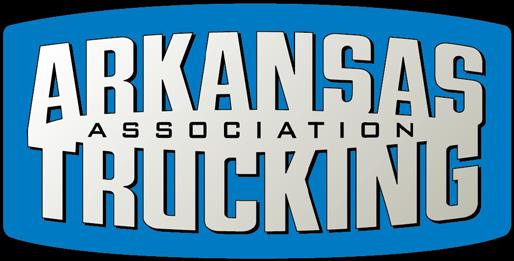
The Arkansas Trucking Association promotes the Arkansas trucking industry on issues that directly impact member companies and the state and national economies. The ATA is owned and governed by more than 300 trucking companies and important industry suppliers. Members range from firms with five or fewer trucks to some of the nation’s largest freight and logistics companies. The ATA’s mission is to advance the trucking industry’s image, efficiency, competitiveness and profitability. ATA’s comprehensive range of services, products and member benefits are designed to help members compete and succeed. The association was started in 1932 as the Shippers and Carriers Association of Arkansas.

Allative Technologies is not the typical information technology managed service provider. Started in 2016 and based in Conway, Allative serves clients throughout the US and abroad. It was founded with the idea of bridging the gap between technology and business operations with a primary focus on understanding the client’s business. Where some IT companies specialize in specific aspects of IT, such as desktop or network support, Allative takes it a step further to listen to the client’s business needs and then matches the technology that best fits the business to become more efficient and ultimately more profitable. Whether it be physical security, cybersecurity, cloud, networking, device management, internet of things or auditing, Allative’s clients are covered and supported. With a very broad skill set and experience with anything technology related, across any industry, Allative Technologies makes for the ideal IT partner.

Little Rock’s Rock City Digital has what may be the happiest, most creatively fulfilled team in the industry, and clients reap all the benefits — passionate work, emotionally engaged project management, and sincere, reliable communication. Rock City Digital is the leading qualified lead generation marketing provider in the region.

Murphy USA is one of the largest independent retailers of gasoline products and convenience store merchandise, boasting more than 1,700 stores in 27 states across the Southwest, Southeast, Midwest and Northeast. The stores are 100 percent companyowned and -operated. Most are adjacent to Walmart stores. Murphy USA serves about 2 million customers per day. The business includes a network of seven owned terminals, which support an advantaged fuel supply, allowing the company to source fuel at or below the industry benchmark prices.

A licensed attorney, Denver Peacock founded strategic communications firm the Peacock Group in 2014. Now celebrating its 10th anniversary, TPG is comprised of an award-winning team that combines more than 100 years of communications expertise with innovative thinking and creative storytelling to help partners achieve unmatched success. Proudly based in Arkansas, TPG’s experience includes the White House, U.S. Congress, presidential campaigns, global summits, regional coalitions and statewide outreach efforts. The firm has helped cor-
porations, foundations, nonprofits and government clients execute winning campaigns and comprehensive communications throughout Arkansas, across the U.S. and around the globe. TPG specializes in resultsdriven public relations, media relations, content marketing, thought leadership, event planning, crisis communications and more while remaining focused on building and nurturing authentic client partnerships and personalized experiences.

Headquartered in downtown Little Rock, Moses Tucker Partners is an industry-leading commercial real estate firm and one of Arkansas’ largest brokerage and management companies. Founded as a development firm in the 1980s by Jimmy Moses and Rett Tucker, MTP grew exponentially when Chris Moses assumed the role of president and CEO in 2011. Now a full-service real estate operation with offices in Little Rock and Bentonville, MTP’s data-based offerings include tenant and landlord representation, real estate and economic consulting services, investment sales and capital markets, and property and facilities management. Today, MTP manages 11.6 million square feet of commercial space and has a development portfolio worth more than $2 billion. Committed to thoughtful real estate development, historic preservation, and strategic investments that foster community growth and revitalization, MTP is innovatively shaping the commercial real estate landscape in Arkansas and beyond.

Lile Real Estate in Little Rock was founded in 1993 by Gar Lile. The firm is licensed in Arkansas, Louisiana, Mississippi and Tennessee and has more accredited land consultants than any other firm in the state. The Lile Real Estate team consists


of sportsmen, outdoorsmen and farmers with firsthand knowledge and experience needed to understand what Arkansans are looking for in a real estate investment broker. Over the past 10 years, the company has sold more than $1 billion worth of real estate. Lile Real Estate offers a full range of services for clients: sales and marketing, sealed bids, consulting, acquisitions, exchanges, property development and research, and market analysis. From social media to traditional advertising, the company uses every marketing avenue available to connect clients with the properties, buyers or investors they are looking for.

Coldwell Banker RPM Group is a fullservice real estate firm with strong ties in Arkansas, as well as national exposure. Bringing people and property together, the Little Rock firm is committed to helping its clients at every step of the homebuying and -selling process. With nine offices throughout central Arkansas and the River Valley, Coldwell Banker RPM is one of the state’s largest residential real estate companies and has more than 350 employees and associates.
Bill Parkinson established Little Rock’s Parkinson Building Group in 1999, when his home builder went bankrupt in the middle of Parkinson's new construction. He used his dedication and business expertise to complete his home to his high standards. As a result, he discovered a new passion for building custom homes, and Parkinson Building Group was born. Over the past 20 years, Parkinson Building Group has been dedicated to building the best custom homes in Little Rock. The group uses its expertise and passion to create uniquely personalized homes for each customer. PBG believes that each new project is a deeply personal experience for customers, and the group’s team of topnotch project managers and office staff help make the process detailed and seamless.

Before Doe’s Eat Place became a Little Rock landmark, it dwelled in Greenville, Mississippi. George Eldridge, east Arkansas restaurateur and hobby pilot, periodically flew friends and clients to Doe’s Eat Place in Greenville for the legendary food, but he soon decided to bring Doe’s to Arkansas. After acquiring the rights to the name and menu, Eldridge opened Little Rock’s location in 1988. The Little Rock Doe’s Eat Place gained national recognition during the 1992 presidential election campaign when Bill Clinton and staff made the restaurant a frequent hangout. Under the ownership of Eldridge’s daughter, Katherine Eldridge, Doe’s Eat Place has maintained the original Doe’s spirit.
RISK MANAGEMENT COMPANY

The Cashion Co. Insurance and Bonds in Little Rock is committed to honesty, integrity and excellence. Since its founding in 1975 by Knight Cashion, the company has strived to ensure clients receive the best possible insurance services. The company’s team of professionals offer personalized customer support and advice. The Cashion Co. Insurance and Bonds remains a service-oriented, energetic, growth-focused, independent insurance agency that builds long-lasting relationships with customers and carriers and maintains a work environment beneficial to employees. Staff members strive to provide customers with the insurance and surety products to protect their assets and meet or exceed their goals.

Founded in 2007, Entegrity is an energy services, sustainability and solar devel-
opment company that specializes in the implementation of energy conservation and renewable energy projects. In 2013, Entegrity joined forces with Nabholz, a construction and facility maintenance company with 75 years of experience, to bring a brand-new business model to the market and offer wide-ranging expertise in the fields of sustainability, building performance and energy efficiency. By combining consulting experience with construction expertise, Entegrity provides clients with a single point of contact to implement turnkey energy projects. The marketplace has rewarded that unique approach, allowing Entegrity to expand across five states and build a team of highly skilled professionals and innovators who work together to bring a central vision into reality: better buildings for a better world.

Arkansas Surgical Hospital was founded by surgeons seeking a more direct and rewarding experience for their patients. The hospital continues to be physician-owned, meaning surgeons are the decision-makers. That allows them to control their patients’ care at a greater level and have direct input over the best course of treatment. A leader in orthopedic and spine surgery, Arkansas Surgical Hospital is nationally recognized for its achievements. The North Little Rock hospital is one of the only five-star hospitals in the state, and patients consistently rate ASH highly for its overall care experience.

Forge Institute in Little Rock is focused on raising awareness of the growing cybersecurity threat, as well as helping to create new jobs in the industry and training Arkansans to fill them. Forge remains at the forefront of that growth through its Forge Academy boot camps and the Forge Fellowship, which works with the Department of Defense to train qualified individuals, as

well as the company’s work to help protect Arkansas schools from cyberattacks, its partnerships with the U.S. military and its general advocacy for cybersecurity awareness. Forge works partners that include the U.S. Army, the U.S. Air Force, the state of Arkansas, the city of Little Rock, and private corporations such as Acxiom, Riceland Foods, Arkansas Blue Cross and Blue Shield, and Oaklawn Racing Casino Resort in Hot Springs, as well as Arkansas colleges and universities.

First Orion, one of the fastest-growing telecommunications companies in the country, provides industry-leading branded communication and communication-protection solutions to mobile carriers and businesses. The company is headquartered in North Little Rock and has offices in Seattle, London and Dubai. First Orion’s branded communication solutions, INFORM and ENGAGE, empower consumers to connect over a branded and verified call and are used by hundreds of companies worldwide. First Orion’s Communication Protection suite offers scam, fraud and spoof protection solutions to hundreds of millions of consumers and processes through more than 100 billion calls annually for users on all major U.S. cellular networks. First Orion is a multiyear certified Great Place to Work.

Attorney’s Title Group was formed in 2013 by the attorneys of Wilson & Associates. It is a full-service title and closing company that offers statewide coverage, along with mobile closings. The Attorney’s Title difference is that dedicated, trained and experienced attorneys shepherd transaction to successful completion. In addition, the company focuses on providing over-thetop customer service, which staff refer to as “white-glove” service. That includes hightouch communication, personalized ser-
vice and going the extra mile to make each customer’s experience special. Because of its unique position — being managed by a team of attorneys — Attorney’s Title Group is also uniquely suited to handle those difficult transactions that need extra attention or care. The team members at Attorney’s Title use their extensive knowledge and experience to guide their customers through the settlement process with ease. Attorney’s Title’s main office is in Little Rock, and has expanded its locations to include Conway, Rogers and North Little Rock. The company is a woman-owned company and an affiliate of the Wilson Law Group.
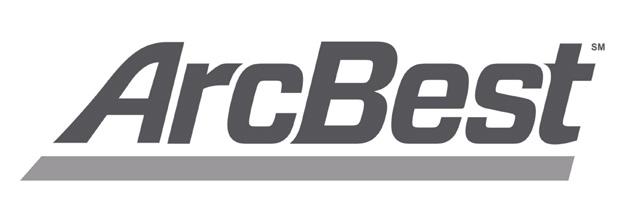
Based in Fort Smith, ArcBest is a multibillion-dollar integrated logistics company that leverages a full suite of shipping and logistics solutions to meet customers’ needs and help keep the global supply chain moving. Using technology, expertise and power of scale, ArcBest connects shippers with the solutions they need — from ground, air and ocean transportation to fully managed supply chains — and serves as a single logistics resource. Beginning in 1923 as a local Arkansas freight hauler, today, ArcBest is a logistics powerhouse with global reach — a result of organic growth, strategic acquisitions, visionary leadership and resilient people who are driven to always find a way to get the job done. Since its beginning, the heart of the company’s mission has remained: to connect and positively impact the world by solving logistics challenges.

For generations, the knowledgeable team at Simmons Bank Wealth Management has been a premier provider of trust, investment management and fiduciary services. For more than 117 years, Pine Bluff-based Simmons Bank has been trusted for what matters. Its wealth professionals have deep industry experience and are ready to provide personalized solutions to help clients build and manage their wealth, provide
for their families and protect their legacies. Simmons puts its clients at the center of everything it does. With a full array of resources backed by expert advisers and portfolio managers, staff members are here to help simplify clients’ financial decisionmaking so they can address their needs for today and realize their dreams for tomorrow. With a disciplined approach to asset allocation that carefully addresses clients’ goals for stability and growth, Simmons can help implement a personalized strategy to bring financial goals within reach and create a long-term plan to support loved ones’ financial security.

Entergy Arkansas provides electricity to approximately 730,000 customers in 63 counties. Entergy Arkansas is a subsidiary of Entergy Corp., a Fortune 500 electric company. Entergy powers life for 3 million customers through operating companies in Arkansas, Louisiana, Mississippi and Texas. Entergy invests in the reliability and resilience of the energy system while helping the region transition to cleaner, more efficient energy solutions. With roots in its communities for more than 110 years, Entergy is a nationally recognized leader in sustainability and corporate citizenship. Since 2018, it has delivered more than $100 million in economic benefits each year to local communities through philanthropy, volunteerism and advocacy. Entergy is headquartered in New Orleans and has about 12,000 employees.

Summit Utilities Arkansas’ mission is to support communities throughout the state. Summit provides safe and reliable natural gas services and is Arkansas’s largest natural gas company. Summit Utilities Arkansas operates under Summit Utilities. The company provides natural gas in six states through Arkansas Oklahoma Gas, Colorado Natural Gas, Summit Natural Gas of Maine, Summit Natural Gas of Missouri, Summit Utilities Arkansas, and Summit Utilities Oklahoma. In Arkansas, Summit serves more than 410,000 customers and operates nearly 14,000 miles of pipeline. Along with providing safe and







reliable natural gas, Summit believes in caring for the communities it serves. Each year, Summit partners with nonprofits in its service area to give back through donations, provide grant funding and employee volunteer hours.
Serving one in every six Arkansans, Central Arkansas Water and its more than 350 employees provide some of the best drinking water in America to almost 500,000 customers across eight counties. As the largest water utility in Arkansas, CAW’s direct service boundaries include the communities of Little Rock, North Little Rock, Alexander, Brushy Island Public Water Authority, Cammack Village, College Station, Maumelle, Paron, Sherwood, Wrightsville, 145th Street Water and Sewer Improvement District, and unincorporated Pulaski County. Central Arkansas Water also provides treated
water supply for the cities of Shannon Hills and Bryant in Saline Country, as well as the Ridgefield Estates Public Facilities Board. CAW also provides supplemental supply to Cabot, Salem, Sardis, the North Pulaski Water Works Association, Woodland Hills and Jacksonville, the service area which includes the Little Rock Air Force Base.

Gadberry Financial Group was founded more than 10 years ago by Jay Gadberry, who worked at major financial institutions for decades prior to launching his own firm. While learning a lot during those years of service, he also learned that there was a gap to be filled in the wealth advisory sector. He set out to build a full-service investment firm that was focused on the benefit and success of clients, rather than on sales and commissions. He wanted to build long-term relationships with real people in a way that supported the Little Rock community he loved so much. Three decades later, Gadberry, along with his
wife Pam, has expanded Gadberry Financial Group to include multiple locations — Little Rock, northwest Arkansas and Dallas — and a talented team. They look to serve these communities with the same passion and excitement for growth that helped them succeed in their beloved hometown.

Superior Senior Care was founded in Hot Springs in 1985 and built from the ground up. Over the past 39 years, Superior Senior Care has grown to include 27 locations and connects thousands of care seekers with professional caregivers every day. SSC is the first licensed and nationally accredited caregiver referral service in the state. SSC has blazed a path by not only providing better care, but also pushing for and attaining higher safety and performance standards in the industry. The company’s goal is to serve clients and their families the way they need it — safely, dependably, affordably and in the comfort of their own homes.
By Andrew Hutchinson
Despite the ever-changing landscape of college football recruiting, Arkansas offensive line coach Eric Mateos still observes one of the sport’s best quasi-holidays.
While fans are analyzing recruiting rankings and judging their team’s hauls on National Signing Day, many position coaches across the country mark the end of a recruiting cycle by purging their Twitter accounts of the prospects who signed elsewhere.
In an interview on The Coaches & the Mouth podcast, Mateos — who’s in his first season back with the Razorbacks since serving as a GA from 2013-15 — admitted it’s a moment that he “enjoys immensely,” even if the current state of the sport has given him some pause.
“It’s like I’m breaking up with 500 women at once,” Mateos said. “I used to love that, but now I hesitate sometimes, like, ‘Well, maybe I shouldn’t unfollow him because what if he goes in the portal in three months?’ I just ask for forgiveness now and say, ‘Sorry, I thought you went somewhere else,’ because I’m still going to celebrate National Unfollow Day.”
He might have said it in a joking manner, but there’s some truth to Mateos’ quirky view of the transfer portal.
Sure, a recruit may not hold it against coaches for unfollowing him on Twitter, but those prior relationships in the recruiting process certainly help the second time around. Two of the Razorbacks’ projected starters up front are a perfect example.
Right guard Josh Braun was committed to play for Sam Pittman at Georgia, but ultimately signed with Florida when Pittman became the head coach at Arkansas. When he entered the portal, that made the Razorbacks a natural landing spot for the eventual All-SEC lineman. Center Addison Nichols was offered by Pittman very early in the recruiting process before eventually signing with Tennessee. He hit the portal this offseason, and Arkansas was immediately a frontrunner.
That’s not the only way the transfer portal has impacted the sport, though. Of course there are the oft-rumored cases of teams trying to “steal” players — which have some truth to them — but there are other ripple effects, which Mateos revealed during his sitdown with the podcast’s three hosts, including former Arkansas offensive lineman Brey Cook.
When recruiting offensive linemen out of high school, Mateos noted a general two-tier hierarchy of prospects.
There are the no-doubters who are good enough on film to earn offers immediately with almost no questions asked. Then there are those who look like they may be worthy of an offer, but the coaching staff would like to see them in a camp setting before making the final decision.
Considering offensive linemen need more time to fill out their frame and build strength compared to skill positions, the best time for them to prove their worth is the summer leading up to their senior year. That’s traditionally when those borderline prospects have been offered.
Nowadays, though, Mateos said he’s noticed those kinds of kids will get offers from Group of Five or even non-SEC programs and
essentially settle, opting to take official visits to those schools over the summer instead of coming to camp for an opportunity to earn a scholarship at Arkansas or other bigger schools.
The reasoning behind that is simple in Mateos’ eyes.
“Well, that kid’s going to say, ‘You know what, Coach, I’ve got offers. I got OVs set up. I’m not coming to camp. Then if I am good, you’ll want me out of the portal anyways,’” Mateos said. “It’s changed so dramatically from what it was 10 years ago.”
Last season, no position took more heat during Arkansas’ disappointing 4-8 campaign than the offensive line. The unit struggled mightily when it came to opening up holes in the run game and protecting the quarterback.
That’s why one of Mateos’ first tasks after taking over upon Cody Kennedy’s seemingly mutual departure for Mississippi State was, as he described it, “repairing the room.”
“The spirit was broken; the confidence was down,” Mateos said. “There was a lot of guys in there that weren’t sure if we can really do this. That’s been the No. 1 thing, just building the room back up confidence-wise.”
Of course, the other key to “repairing” the offensive line was going into the transfer portal and getting players capable of coming in as immediate starters. Arkansas did just that with Fernando Carmona Jr. from San Jose State, Keyshawn Blackstock from Michigan State and Addison Nichols from Tennessee.
All three are projected starters coming out of spring ball, which brings us to the other way the transfer portal has changed things, particularly up front.
Bringing in three outsiders has the potential to create friction in a unit that requires cohesiveness, but that’s something Mateos and the players have tried to nip in the bud from the beginning.
Mateos said he got feedback from the offensive linemen that they wanted to be a tighter unit, so he started implementing “forced family fun” — something he said was more important than any scheme or technique. He admitted that there was no quick fix for bringing the unit together, but it’s been a point of emphasis that will continue throughout the summer.
“That’s part of the coach’s job. You can’t just tell them, ‘Hey, I need you guys to be close.’ You have to put them in positions to make them close. That could be a meal. That could be saying, ‘Hey, why don’t you three guys come hang out in my office today at 3 o’clock, and we’ll just watch NFL film of this scheme for 10 minutes.’ It’s just built over time. Trust is built in drops, and it’s lost in buckets.”
There was also an on-field component to that during the 15 spring practices that will presumably continue in preseason camp.
“One of the things I felt like we really needed to improve on from last season watching the film is there’d be guys getting tackled and nobody picked the guy up,” Mateos said. “If you don’t go help somebody off the ground, it doesn’t matter if it’s a back, a receiver or anybody, then that’s a ‘loaf,’ and we’re pointing those things out big time.”
This column first appeared on BestofArkansasSports.com.

In the world of precisionengineered luxury vehicles, Mercedes-Benz is a brand icon that needs no introduction. Generations of auto enthusiasts have been spellbound by the automaker’s melding of art, auto and technology to create a machine that is status symbol personified. Whether a person already occupies the corner office — or is well on their way there — Mercedes-Benz announces one’s presence like no other auto on earth. Arkansas Money & Politics visited with the experts at Mercedes-Benz of Little Rock to discover what those in the know are driving from this legendary brand.
Ranked the No. 1 full-size luxury car by Car and Driver in 2024, the S-class makes a bold statement wherever it goes.
“If you want to look into the future of automobiles, start with an S-class,” wrote Aaron Segal at The Drive. “Many new cars (especially these days) are full of gimmicks to entertain or impress, but the … Mercedes-Benz S580 4Matic isn’t supposed to get bogged down with any funny business. It just does it — all of it — without compromise, without complaint and without fanfare.”
The S-class is so thoughtfully equipped and crafted it is hard to imagine anything

the S580 does not deliver, from a silky-yet-brawny 4-liter V8 biturbo engine with mild turbo assist that churns out nearly 500 horsepower to generous head and legroom throughout the technology-laden cabin.
“On the road, the S-class is a haven of comfort and quietude. Its engines are smooth, refined and powerful, complemented by near-imperceptible gear changes,” Motor Trend raved. “Although the S-class’ exterior is elegantly understated, its interior is full of eyecatching details. Nearly every surface is covered in leather or metal accented by gorgeous trim panels and multicolor ambient lighting.”
In many areas of life, success is in the eye of the beholder, but as the S580 shows, there are rare exceptions in which success is easily and universally recognized.
MSRP: $128,150



One’s professional journey will sometimes run over rough spots. The E450 helps smooth the ride, taking in stride the many twisting turns to success. The beautiful auto performs as nicely as it looks with a turbo engine with mild hybrid assist that delivers a rush of smooth, pure power. Boasting the guts to travel zero to 60 in just 4.4 seconds, the vehicle remains tautly under control, thanks to four-wheel independent suspension and rack-and-pinion electromechanical power assist steering.
“The E-class sedan is executive transport with a distinctly Mercedes-Benz attitude, offering nearly as much class and substance as the S-class flagship with a slightly less imposing profile,” Drew Dorian wrote for Car and Driver. “E450s turn up the heat to 375 horsepower, courtesy of a turbocharged 3-liter inline-six. All-wheel drive is standard, and all models come luxuriously equipped and include a generous list of

driver-assistance and infotainment features.
“Other European rivals … offer similar space and equipment, but neither brand has quite the prestige that comes with a Mercedes-Benz badge.”
Loaded with the latest on-board safety and entertainment technology, the E450 cradles up to five passengers in luxurious appointments and looks great doing it. Whether at a country club, at a corporate retreat or enjoying a night on the town, the ride to the top never looked so good.
MSRP: $68,100
The AMG GT55 delivers everything discriminating drivers expect with a dash here and there of things they do not. Yes, the sleek rocket on wheels still hauls — zero to 60 in a scant 3.8 seconds, thanks to a 4-liter turbocharged V8 that delivers 469 horsepower and 516 pound-feet of torque — but the 2024 model is also surprisingly comfortable and even offers an available 2+2 seating concept.
Externally, the car is as smooth as a bullet having had every extraneous edge buffed out of its profile, right down to flush door handles and AMG alloy wheels. The aerodynamic masterpiece slices through the air, thanks to a frame melding aluminum, steel, magnesium and fiber composites that deliver maximum rigidity at the lowest possible weight.
“Mercedes didn’t stop there,” Wesley Wren wrote for Autoweek. “The next-gen AMG GT comes with the company’s active ride control system. This eschews the traditional stabilizer bar and uses interconnected dampers and hydraulics to control body roll. This also helps the AMG GT control brake dive when you’re loading up the brakes into a corner.”


The best way to travel on the road to success is in a vehicle that embodies the essence of success.


The auto press routinely mentions the AMG GT55 favorably among comparable Maserati, Aston Martin and Porsche rivals as a worthy contender in its class.
“This is supercar technology pioneered for the mass market,” Roger Biermann wrote for CarBuzz. “The GT is a better sports car, a technological tourde-force and a better [Porsche] 911 rival than ever.”
MSRP: N/A
“Performance” and “SUV” are words not often seen in close proximity to one another, but as the Mercedes-Benz AMG GLE53 proves, perhaps they should be. Leave it to the legendary German automaker to reimagine a ride created to tote the kiddies and a bag of sports equipment into a burly-yet-elegant beast that delivers the payload with a few kicks along the way.
Born of intelligent engineering and boundless imagination, the GLE53 growls through any commute, thanks to a 3-liter inline-six turbo engine with hybrid assist. The power plant pumps out 429 gnarly horses and 413 pound-feet of torque that render it capable of towing 7,700 pounds, but that is not all that is going on under the hood.
“The technology alchemists in Affalterbach can seemingly transmute any combination of electric machines and mechanical widgets



into pure speed,” Eric Tingwall wrote for Motor Trend. “With the 2024 Mercedes AMG GLE53, they’ve made gold from an inline-six engine, a turbocharger, an electric supercharger and a 48-volt electric motor.
“This GLE53 … has a personality all its own, a quieter form of AMG performance that delivers power and presence without shouting — literally and figuratively — in anyone’s face.”
Built to move people and their stuff, the GLE53 performs its role with unparalleled comfort and more than a little flair. The end-of-the-year soccer picnic will never be the same.
MSRP: $86,750
Solidly built, tech-rich and surprisingly fuel efficient, the GLE350 is the workhorse today’s busy families demand. Thanks to high marks in mileage, interior appointments and safety, the GLE class came in first in the luxury midsize SUV rankings by U.S. News & World Report, a not-insignificant value proposition given current fuel prices, even among well-heeled consumers.
“The 2024 Mercedes-Benz GLE350 is EPA-rated at up to 23 mpg combined (20 mpg in the city and 27 mpg on the highway),” wrote U.S. News & World Report’s Dan Frio. “Overall, these estimates are
exceptional for the luxury midsize SUV segment.”
On-board technology includes the Mercedes-Benz User Experience, which offers integrated digital displays that include a touchscreen, touch-sensitive controls and an intuitive, intelligent voice-control system that grows smarter over time. Other smart features include radar-based technology to alert drivers of their surroundings and automatically providing an appropriate level of braking to help prevent a collision.

to be. What it does, it does very well, offering sophistication, quality construction and value for the money — all things that never go out of style.
MSRP: $62,650
The GLE350 is not the flashiest model Mercedes-Benz makes, nor is it intended
Manufacturer’s suggested retail price information reflects starting price and is subject to change by model and options.
Source: mbusa.com



— Bill Sowell, Founder/CEO



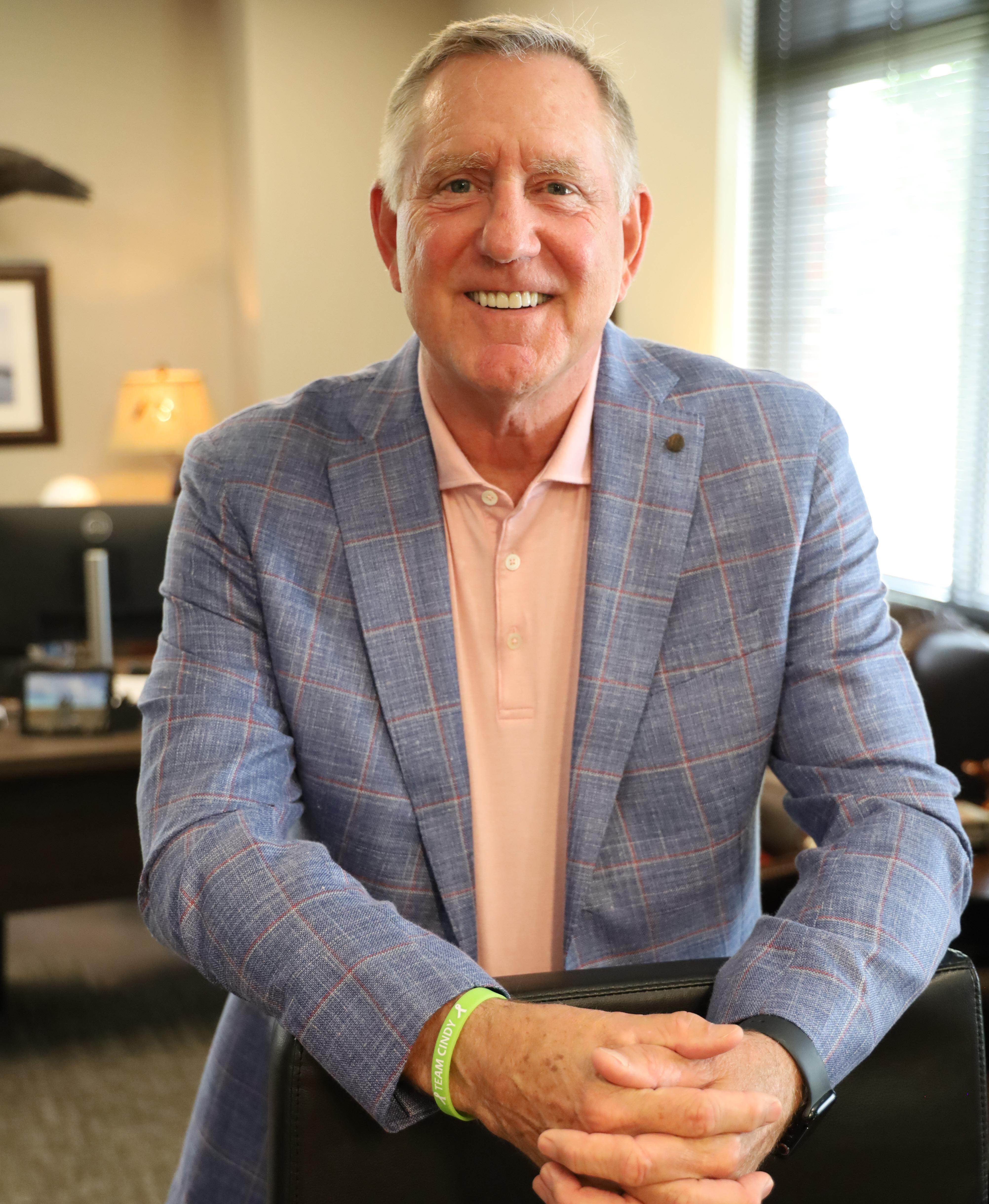
Fairness and honesty provided the twin North Stars for Bill Sowell’s professional journey
By Dwain Hebda
In 1990, freshly bought out of the travel agency that was his first entrepreneurial venture, Bill Sowell gravitated to the financial planning business. His natural way with people and a burning desire to succeed matched the job ideally save for one nagging thing: Sowell disliked the commission structure by which he was paid, not because he thought it did not provide enough earning potential, but because of how he felt it cast him in his clients’ eyes.
“I never liked the commission system. I always felt like there was an inherent conflict of interest in that,” he said. “The company I started with presented themselves as being independent, but like most of the larger broker-dealers in the business, they had a way of influencing how you did business.
conscience could have been such that he abandoned his career before it even got started. He chose neither, opting instead to adopt a fee-based system that did not incent purchase of one product over another, even if he had to go out on his own to do it. The audacious mission was noble but hardly assured.
“Arkansas gets a bad rap about certain things, and there’s jokes about us not wearing shoes and whatnot, but the bottom line is I love this state. Especially moving around in the airline industry all those years, it made me realize how lucky we are in Arkansas. From a business perspective, is there as much money as you’ll find in some of the other areas? No, but there’s so much business in our industry, I don’t care. If you do business the right way and you treat people the right way, the business is going to come.”
“They did that by saying we have all these products and services, and if you use ours, you get paid X, where if you used the others, you get paid Y. It put me in the position of even if I felt like this product was better, I’m gonna get paid more by selling that. That was something that, you know, you don’t really understand when you get in the business, but once I did and I started figuring that out, I just didn’t like it.”
Sowell could have been forgiven for shrugging the situation off as just the way the game was played, or his
“My first concern was I’m leaving a large, well-known brand to go out on my own,” he said. “All right, well — is anybody gonna follow me?”
If there is one thing Bill Sowell has never had to worry about in his life, it is the desire people have to follow where he led. His parents’ divorce instilled a mentality of greater responsibility and self-reliance than his peers and a fundamental confidence that he has carried ever since. That mentality expressed itself in several ways, most notably in athletics. Sowell was a playeverything kind of kid while attending the old Northeast High School in his native North Little Rock.
“I was always more of a leader type, and I didn’t really set out to be that way. I was a good athlete, and I always tended to end up being one of the team captains or just more of a leader in general,” he said. “Maybe it was just my personality; I certainly didn’t mind voicing my opinion about things, and it just seemed like it came relatively easy for people to want to follow me for whatever reason.”
“There’s never been more opportunity for people who have an entrepreneurial spirit, but people must first do a very good self-analysis of who they are. Do they have the confidence to go off and do something and, through thick and thin, stay on that path? There are people who can’t. They want to know that one way or another, at the end of two weeks, they’re gonna get paid versus someone like me who was always comfortable with not getting a steady paycheck. An honest self-assessment is critical for deciding if you have the personality to go off on your own.”
Sowell attended what is now the University of Arkansas at Little Rock but left short of earning a degree to accept a job with the airlines. During his decade in the industry, deregulation arrived and sent the competitive landscape into upheaval. Sowell moved 10 times in 10 years, and four different airlines were shot out from under him by bankruptcy along the way.
Looking to gain more control over his career, he stepped out of the maelstrom to form his own specialty travel agency, All Sports Travel, by which he arranged travel packages with, among others, the National Football League’s Dallas Cowboys and Major League Baseball’s St. Louis Cardinals. He sold the business in 1989 and started looking for his next challenge.
“Financial services was an industry I’d always been interested in,” he said. “I like helping people, and I thought this would be a great way to not only help myself but also help others plan for their futures.”
On one hand, Sowell had a ready roster of prospective clients from the customers he had served through the travel agency. On the other hand, he said, it was a tall order to convince them he was just as capable of managing their money as he was of getting them to the big game and back. Undaunted, he forged ahead and was soon a top producer.
that takes years to really learn.”
By 1995, however, when Sowell was ready to launch his grand experiment, there was precious little by way of backup or a safety net. By his own estimation, less than 1 percent of the industry at that time followed a fee system. However, he was determined to prove there was a path to great success that did not feel like compromising one’s principles or abandoning one’s fiduciary responsibility.
“I’d met the person that had the most influence of me over in this industry, Allan Mendel, who unfortunately passed away a few years ago. He and I got to be really good friends,” Sowell said. “He ran a large trust department, and it’s always been common for bank trust departments to do everything on a fee basis.
“The more I talked to him and the more I learned about it, the more it became apparent to me that, OK, well, there is another way to do this business.”
Sowell did not have long to wait for proof of concept — the marketplace responded resoundingly.
“My clients loved it,” he said. “Once I explained to them what I was doing, my clients really cared and appreciated what I was doing and how I was doing it. That’s when I realized the depth of the relationship I had developed with them. I was amazed.”
Sowell eventually bought out his partner and friend Mendel, and in 2001, he and his wife, Cindy, formally organized the company as Sowell Management. Over 23 years, they have grown the firm to 91 advisors, as well as registered independent advisor firms, offices in 35 states, and more than $4 billion in assets under management or
“I think the No. 1 lesson for anybody in any kind of sales is to learn to ask a question and then shut up. I think so many people in sales are so busy trying to impress who they’re selling something to, they ask a question, and before the people can respond, they keep selling and they keep talking. I ask people questions, and I shut up and I listen, and I take notes so they can answer and answer honestly. That’s something I learned a long time ago, and I would say that’s still one of the biggest things.”
“All the people that I called on knew I was new in the business, but I relied on the support of the office I was in and the people that I really connected well with,” he said. “In this business, that’s pretty common; you tend to do more things jointly when you’re new where you’d bring somebody else in and split the business, so early on, especially with my bigger clients, I was more of the lead as far the relationship, but I depended heavily on other people around me for the detail work
advisement. The firm serves clients in all 50 states, Washington, D.C., and Puerto Rico.
The company grew at such a breakneck pace that the industry had no choice but to sit up and take notice. As reported in Arkansas Money & Politics earlier this year, Sowell Management has been nationally recognized multiple

times as a top RIA by The Financial Times and Barron’s, and last year, SHOOK Research, in partnership with Forbes, ranked Sowell as one of the top 100 RIAs in the country. Most recently, Sowell Management was named a top-three SEC-registered RIA firm in the United States by the prestigious Wealth Solutions Report
BILL SOWELL ON INSTINCT
“Most of what I’ve done business-wise has been by gut. Over the last several years we’ve started seeing all this private equity money coming in, offering to buy up firms, and there’s aggregators out there gobbling up firms like ours, cobbling them together. We’ve certainly been approached by quite a few of these firms, and the money that’s been tossed around is great, but it just never felt right. To me, you know, if something just doesn’t feel right, that means it’s time to take a step back and either not do it or do a hell of a lot more analyzing.”
BILL SOWELL ON RISK
“Anybody who has a dream should follow that dream by taking chances. Sometimes they’re not going to work out. Well, you know what? Get up, dust yourself off, and just run at it again. I guess I wasn’t smart enough to realize I could possibly fail. All I ever thought about was here’s what I’m going to do, here’s why I think it will be successful, here’s my pathway, and I did it. I never stopped to think that it could possibly fail. If you’re passionate about something and it makes sense, then how can you not be successful?”
More than all that, Sowell is regarded nationally as a visionary whose pioneering belief in the fee-based system as a more ethical alternative to commission sales led to its adoption by thousands of other firms across the industry. Even so, he said, it is just the beginning.
“Concerning the fee-only side of the business, I don’t think we’re even at first base,” he said. “There’s so much more room for growth, it’s unbelievable.”
Opportunity or not, a person who has made his for-
tune on numbers the way Sowell has cannot escape the most fundamental element on an actuarial chart. At 67, he is in the later innings of his career and is putting considerable energy into planning what happens when he steps aside. He does so with trademark optimism, knowing that when the day comes, the firm will be carried by the capable leadership team he and Cindy have built, a team that includes their children, Abby and Evan, who, like their parents, are staking their claim in the family business.
Looking around the company’s North Little Rock offices, there is a lot to be proud of in house and even more so outside in living rooms and offices and across dinner tables of clients from one end of the country to the other.
“This business really hasn’t changed. It’s just grown a lot,” he said. “It’s the relationships that allow you to overcome hard times, you know, when the market’s going south and people are getting ready to make the worst decision they could make, that they just need to sell and get out.
“It’s the relationships and the trust that give you the ability to calm people down and get them to think rationally. After everything else we’ve done, that’s what’s still fun about this industry to me. I love helping people.”
By Mak Millard
Chad Bowie has always had an eye for sales. That interest led him to the University of Arkansas in Fayetteville, where he obtained a degree in agricultural business and marketing. He then leveraged those skills during stints with Ag-Pro South and Greenway Equipment, where he sold agricultural, turf and commercial worksite products and John Deere equipment. After 14 years spent honing his skills between those two posts, Bowie joined Acme Brick, Tile & Stone as district manager in 2018.
“What I most enjoy about my job is seeing the skills and knowledge of our staff come together to provide a great customer experience,” Bowie told Arkansas Money & Politics in 2023. “Our company is over a century old and built on a foundation of brick manufacturing, but we continue the pursuit to offer more than just the essentials to homebuyers, builders and architects.”
As a foremost name in stone, tile and outdoor living products, Acme Brick prides itself on making products that last for the long haul. That commitment is further demonstrated by the company’s 100-year guarantee. There is much more to the 133-yearold company than its namesake bricks, however, which makes education an essential component of any Acme team member’s job. Bowie relishes the opportunity to show new customers the depth and breadth of Acme’s inventory, as well as keeping returning clientele up to speed on the latest materials and styles.
in MAC Metal siding, and the Maumelle-based Bowie has helped usher in a bevy of Arkansas homeowners opting for the premium, environmentally friendly product.
“In Arkansas, we are setting the trend, even in places already known as trendsetters, such as Dallas,” Bowie told AY About You. “Ever since Arkansas kick-started the demand, the product has really taken on a life of its own in the South. We’ve got entire homes of this product. We’ve sold some jobs that were over $100,000 worth of product just for the exterior of million-dollar homes.”

“I think it’s good when people ask questions and that they get good feedback,” Bowie said. “I still believe that we should always be a partner with our customers. It’s a constant challenge to educate our clientele, which we strive to do every day. That’s why we’re investing in the training that’s necessary to help our customers understand the product, how to install it, and to suggest or recommend certain installers to help them.”
One of those developments has been the explosion of interest
Another area homeowners have zeroed in on in recent years, he said, is the importance of outdoor spaces. While not totally a product of the COVID-19 pandemic, the extended time indoors certainly accelerated the need for amenities such as outdoor pools, patios and pizza ovens for those willing to splurge. Bowie again found himself at the forefront of a wave of demand, and Acme was positioned to deliver above and beyond customer expectations.
“Our products offer a better warranty and give you a product that will last you for years to come, instead of having to replace it every single year, as can happen with cheaper models,” Bowie said. “There are less expensive options out there, but you quickly get wise to the fact after you’ve bought something three or four times that the savings over time are not that substantial. You also have to really factor that in when considering making a high-quality purchase.”
As an experienced salesman, Bowie knows a quality product when he sees it, and his time at Acme has helped the company become the “hometown option” for Arkansan customers.
“We appreciate the opportunity to serve people in Arkansas, many of whom have been doing business with us for multiple generations,” he said. “We’re proud to help so many people’s dreams for their home come true.”
By Sarah Coleman
An attorney by trade, T. Lindsey Castleberry serves as executive vice president and chief legal counsel at White River Health in Batesville, where he grew up and graduated from high school.
As a lifelong Arkansan, he is passionate about the Natural State and all that it offers in terms of the outdoors, neighborly friendships and scenic beauty. With Batesville being located along the White River, Castleberry can take advantage of living in the foothills of the Ozark Mountains, where there is a lot of nature and outdoor recreation to be enjoyed.
“I love the outdoors, and I grew up doing a lot of hunting and fishing,” Castleberry said.
Castleberry is a graduate of the University of Arkansas in Fayetteville, where he earned a bachelor’s in business administration from the Sam M. Walton College of Business before attending the UA School of Law. Earning his law degree in 2007, he was admitted to the Arkansas Bar the same year.
Castleberry immediately found himself surrounded by helpful lawyers who welcomed him into the profession with open arms. Following in his brother’s footsteps, he said he considers himself lucky to be able to look to his family for professional guidance.
“Both in personal and professional matters, I am very lucky to have my brother, Casey, to give me advice and to be a leader,” Castleberry said.
Throughout his days in private practice and in his previous role as a city attorney in Batesville, Castleberry said the best advice he has received is to prepare as much as humanly possible and learn to think on his feet.
“I know many future lawyers and future professionals are probably sick of hearing it, but I have never been overprepared for a hearing or negotiation,” Castleberry said. “Preparation is key when it comes to working your way through difficulties, and I’ve found that the harder you work, the luckier you get.”
Always willing to take on new and intimidating challenges, Castleberry said he values being teachable and having a willingness to learn. While transitioning from his role as city attorney, Castleberry joined White River Health in 2015 as the system’s inhouse legal counsel. In 2018, Castleberry was promoted to vice president of human resources, where he led legal services, human resources and physician recruiting efforts until assuming

his current role in 2021.
In his current position, Castleberry uses his legal and business expertise to lead a health system that is passionate about providing quality health care and improving the health of its communities.
“When I was transitioning to health care from my city attorney role, my dad was on the board here at White River. I knew how important this place was to him and to the community,” Castleberry said. “I really began to understand this as I saw the people employed here, the doctors, nurses and administrators, commit so much of their time on nights, weekends and holidays. I am constantly amazed by the dedication of the really talented people who work here.”
By Steve Wilcox
During a life full of accomplishment, there are always a few highlights that stand out. For attorney Julie DeWoody Greathouse, managing partner at PPGMR Law in Little Rock, seeing a case to the Supreme Court counts as high on the list.
Greathouse served as lead trial and appellate counsel in the Arkansas Game and Fish Commission versus the United States.
“I had the honor of representing AGFC in a decade-long case that took a trip from the Arkansas wildlife management areas to the U.S. Supreme Court and resulted in a unanimous opinion authored by Ruth Bader Ginsburg,” she said.
That is heady stuff, but not for an all-Arkansas legal mind who has received recognition ranging from The Best Lawyers in America for appellate practice, environmental law, litigation-environmental and commercial litigation to multiple selections as Lawyer of the Year by Best Lawyers in environmental law. Those are just some of the accolades; the list is long.
Among those many awards for the attorney, there is one that represents a culmination of a career spent in service to profession and community. The Golden Gavel Award for service in the legal community is recognition Greathouse particularly appreciates.
“Service and leadership performed in our local communities is critical to personal and community success,” she said of the award presented to her by the Arkansas Bar Association in 2020.
When you are a proven professional in the high-octane field of law, people come looking for your participation in their organization, and that visibility has brought Greathouse board involvement in groups ranging from the Arkansas Advisory Committee to the United States Commission on Civil Rights to Arkansas Advocates for Children and Families to the Pulaski Academy board of trustees in Little Rock. Her mantra for board service is straightforward: hard work, excellence and dependability.
“It’s a simple formula,” she said.
Greathouse knows where her roots are, and they are decidedly in the Natural State. She grew up in Hope, hometown of former President Bill Clinton, and started her professional journey through local universities. She earned a Bachelor of Science in political science from Harding University in Searcy, where she graduated magna cum laude, and her juris doctor at the University of Arkansas at Little Rock William H. Bowen School of Law.

“I’m proud to have received my undergraduate and graduate degrees from Arkansas schools,” she said. “They have served me well.”
Then there is day-to-day life in Little Rock. Although the city is not touted as a cultural and professional hub the likes of New York or Los Angeles, it does offer a hometown feel that bigger cities cannot match.
“Little Rock is large enough for business opportunities and small enough to be a close-knit community,” she said. “It’s perfect for me and my family.”
When she has an opportunity to share her experience with young lawyers, Greathouse offers clear-eyed advice on what it is going to take.
“Plan to work hard with purpose and bring excellence to every task,” she said. “A legal career is a marathon and worth every mile.”
With practice areas that extend from anti-trust to naturalresource law and trial practice, the work days are full for an attorney who grew up in a small town and now manages a law firm. That would seem like an improbable step for many people but not for someone who seems to generate drive from the deep orange clay of the Arkansas soil. It is just another day for Greathouse — another day of accomplishment.
By Dwain Hebda
There are a lot of ingredients that go into the batter of Stacy Hamilton’s life, including being a mother, a community volunteer and a market-leading real estate professional, all of which she juggles with what looks to others as ease. “A multifaceted life is a complete life” might be her motto.
Therefore, it should come as no surprise that as president of the Little Rock Realtors Association, her guiding light is to bring as many local real estate professionals into the fold as possible. That she has steadily done, transforming the organization into the most diverse and representative version of itself in its history.
“In the 1960s and 1970s, you would have seen mostly older, white male [Realtors],” she said. “In the 1980s and 1990s, you saw the shift to include a prevalence of women Realtors. Today, we’re seeing that shift to incredible diversity, and it’s because of everything we’ve done to reach out to our various communities, our Black community and our Hispanic community.
“Those communities are keyed in now because people there are purchasing homes, and that’s leading members of those communities to dive into this industry. If I look at my membership, it’s significantly more diverse today than it’s ever been, and that’s beautiful.”
They’re going to be speaking the audience’s language — literally.”
A native Texan, Hamilton arrived in Little Rock in 2005 and worked in then-Gov. Mike Huckabee’s administration. What was supposed to be a short-term assignment turned into a love affair with the city, and after her career in politics ended, she entered the local real estate industry that would eventually lead to membership in and leadership of the LRRA.
Today, she and her staff provide myriad programs and resources for a membership that is growing steadily and getting younger by the day.
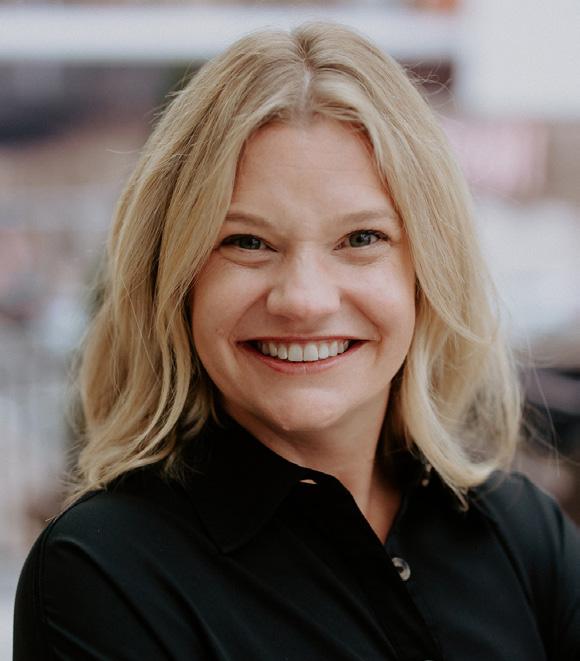
This diversification has not happened passively under Hamilton’s watch but has been a priority of her leadership ever since she took office in 2017.
“The National Association of Realtors, when it originally began and for a very long time after, would not allow Black Realtors to be a part of the association, so our Black community started the Realtist Association,” she said. “It’s still in operation today, and they have regular meetings, and they do really well. The first thing I did was call them and say, ‘Hey, please come to my meetings, and I’m going to come to your meetings. Let’s do events together, and let’s bring our communities together.’
“The other thing we’re doing is we have a Realtor who I have identified as a great leader. She’s Hispanic, and she’s helping me build a first-time homebuyer program that’s all in Spanish. We’re going to host this and feature a home inspector who speaks Spanish and a lender who speaks Spanish and the title company.
“We are doing phenomenal in the area of attracting young people to our industry, and it’s because of the introduction of technology and different marketing strategies such as social media,” she said. “Those two things allow young people, once they get out of college or, even for some, once they get out of high school, to go ahead and dive into this industry because they know social media marketing. They know technology. They can start using those tools that they’ve grown up with immediately and get their careers going.
“It’s been phenomenal to see. I think our stats used to be that the average age of a Realtor was, like, 55 years old, and I think the next time that they pull those stats, I believe we’re going see that number come down significantly because so many young people are getting into this business.”
Hamilton said the usual industry attractors of a flexible schedule and the ability to be one’s own boss are as strong as ever, but the complexities of real estate today make the association’s job more critical to members’ success than ever.
“This, I think, is probably our most important responsibility,” she said. “The real estate industry can provide an opportunity for anyone and our job is to make sure that everybody, whether they’re a part-timer or a self-investor or a full-time agent, receives the same level of education and professional development. Whether they sell 50 houses a year or only sell two houses a year, we ensure they’re adequately trained to do those transactions very well. As an association, we make sure the ethics and professional bar is set, and everybody’s meeting that bar.”
By Mark Carter
To know Kenneth “Muskie” Harris is to see him on the go. The Little Rock entrepreneur and community activist never got the memo about working hard and then slowing down to reap the rewards of one’s labor.
In Harris’ case, at least, the second part of the memo was cut off, not that the trailblazing former Razorback football player and co-founder of Muskie Harris Rehabilitation Services in Little Rock doesn’t love what he does. Passion comes with the territory for Harris, and that means slowing down is not part of the plan.
Harris’ latest passion is a hall of fame for his prep alma mater, Little Rock Central High School.
“The school has never had a working hall-of-fame organization,” he said. “This fall, I will have my sixth-generation nephews attending Central High.”
Harris was a big deal when he played football for the Tigers in the late 1960s and early 1970s, when Central High was still considered a national high-school football power. A leader in the school’s Tiger Foundation, Harris was a primary advocate of recent much-needed renovations to the school’s historic Quigley Stadium and other athletic facilities.
The all-state back was among the first wave of Black athletes recruited to play scholarship football at the University of Arkansas. Harris said when he arrived in Fayetteville in 1972, there were five Black players on the roster. Harris played during an era when players stayed on campus for four years. Before he exhausted his eligibility, Harris saw the number of Black players increase each year he played.
“The only color that mattered to us was Razorback red,” he said.
Harris wasn’t done trailblazing when he left the Hill. In 1990, he became the first Black person in Arkansas to run for lieutenant governor on the Republican ticket. He was the first Black person named to the Little Rock Regional Chamber’s ambassador program and was the longtime face of the greater Little Rock chapter of the national civic service club, 100 Black Men of America.
For more than 20 years, he has given back to the community through his business, which works as a liaison between local courts and local rehab facilities. As someone who struggled with and overcame addiction himself, Harris calls his rehab work a labor of love. His partnership with the Little Rock and North

Little Rock district courts through the Alternative Substance Abuse Program allows addicts to serve time in a rehab facility instead of jail.
“Our goal is to help clients maintain their sobriety, employment and family relationships,” he said.
Harris said the rehab world is in a full-scale war with fentanyl and credited Pulaski County Judge Barry Hyde and district court judges Melanie Martin and Paula Juels Jones for implementing the program.
“I specialized my service to serve the criminal courts, working with prosecutors,” he said. “I am a strong advocate for judges having a service they can trust and that can get results.”
By Todd Traub
Joel Hicks said he likes to advise young people to never stop learning and continue their education if they are able. An education, Hicks said, cannot be taken away.
As the newest president of Baptist Health College Little Rock, Hicks is in a position to directly influence the medical education of some 600 students.
“I would say it’s always a great time to get into health care,” said Hicks, who came to Baptist Health from Northwestern State University in Louisiana. “Throughout my career, what I’ve found, when someone has that calling to get into health care and help someone else, it’s always the right time to act upon that, but specifically, right now is the right time to do that. The need for nurses and health care providers has never been greater.”
A 2023 survey commissioned by Arkansas Hospital Association Services revealed that in 2021, Arkansas had only 76 percent of the registered nurses required to provide the national average level of care demand. Hicks hopes to turn out professionals in numbers great enough to fill the void.
“The clinical experiences, I would dare say, are second to none [at Baptist Health],” he said during a television interview. “Part of that is being part of the largest health care system in the state of Arkansas, being part of the Baptist Health system and all of the great clinical experiences that that affords for students.
“That makes it wonderful. I would say also, students, from the very beginning of their clinical program, are going to be able to go into that clinical experience. Not only are they learning it in the classroom, but they’re applying it in a clinical environment.”
Hicks was named Baptist Health president in February. At Northwestern State, he was dean of the college of nursing and school of allied health, where he was responsible for certificate, undergraduate and graduate health programs at four campuses.
At Baptist Health, Hicks oversees a variety of programs, including traditional nursing, practical nursing, patient care technician, nuclear medicine technology, radiography, surgical technology, medical laboratory science, occupational therapy assistant and sleep technology.
“Some of these are very new disciplines, so it’s kind of cutting-edge type technology,” Hicks said. “Of course, nursing has been around a long time, but some of these are newer technologies, as well.”

Hicks is a living example of the value of continuing education.
In 1994, he earned a certificate in radiologic technology from the Louisiana State University Health Sciences Center. More than a decade later, he earned a Bachelor of Science in radiologic sciences at Northwestern State and, in 2009, a Master of Science in radiologic technology at Midwestern State University in Texas.
In 2016, Hicks completed a Doctor of Education in developmental education at Grambling State University in Louisiana.
Before becoming dean of the college of nursing and school of allied health at Northwestern State, he was associate dean in 2020 and the school of allied health director from 2017 to 2020. He also taught and was a tenured associate professor at the school of allied health.
“Working with multiple health care disciplines in a high-stress situation has greatly influenced my ability to build strong working relationships in higher education,” Hicks said when he was announced as Baptist Health College president. “I look forward to furthering the mission of Baptist Health College Little Rock and building upon the high-quality education offered to students.”
By Sarah DeClerk
Ducks are a passion for many Arkansans, as well as those who visit Arkansas to hunt the birds, and Douglas Osborne is working to ensure waterfowl populations remain plentiful for generations to come.
A professor at the University of Arkansas at Monticello and the University of Arkansas System Division of Agriculture and university coordinator at Five Oaks Ag Research & Education Center in DeWitt, he and his students research the migration of waterfowl and their population dynamics.
“We study waterfowl movement and ecology,” he said. “What sort of things are impacting their movements, their distributions? Why do we have less ducks here now than we did 20 years ago?”
The answers to those questions help inform policy and management decisions made by organizations such as the Arkansas Game and Fish Commission.
Over the past seven years, he has monitored duck migration by equipping them with backpacks that track their positions. Data from that research has shown that duck populations are shifting north, partly because of warming climates and partly because of changes in agricultural land use.
He added that duck populations have fluctuated over the decades, so he is hopeful the numbers represent a temporary low.
“I think a lot of that is driven by the conditions of the breeding grounds and the wetlands,” he said. “As long as we can stop destroying wetlands and grasslands and the prairies, populations should and likely will rebound.”
The reduction in duck numbers affects both the culture and economy of Arkansas, he added.
“Waterfowl hunting is built into our heritage in Arkansas,” he said. “There’s lots of people who have huge investments in hunting lands, and the state has huge investments in wildlife management areas, where they focus a lot of their energy and efforts and management objectives on managing that land for ducks.”

Fields are cleaner these days, he said, and crops such as rice are harvested earlier than ever. Reflooding rice fields in the winter and subsidizing farmers for doing so or even growing a second crop of rice each year could help bring more birds, he said.
“We really need, I think, to get to a point where we can grow two crops of rice in Arkansas,” he said. “I think that would be super helpful for waterfowl, and it wouldn’t have the negative impact on farmers because we absolutely care about our farmers. It’s not one or the other; it’s how do we work together to solve this challenge?”
Farm Bill funding is essential to creating economic incentives for farmers to tend to their land in a way that creates more waterfowl habitat, he said.
A native of Illinois, Osborne grew up duck hunting and decided to study wildlife because of his love of the birds. After moving to Arkansas in 2012 to teach at the university, he built the waterfowl program from scratch.
“I came into a state that had a vacancy, really, and a niche for waterfowl research in one of the most important states in the union for waterfowl hunting,” he said. “We weren’t doing anything here for waterfowl research, so it was a really good fit.”
He added that he enjoys teaching the next generation of ecologists.
“I may only work a little bit longer, and somebody’s got to fill my shoes,” he said. “I’m just so passionate about it that I love to see the kids that come in that love waterfowl as much as me, and I just pour everything I’ve got into them.”
He said he is working to establish an endowed research program for waterfowl and wetland ecology so that the university will fill his position with another waterfowl ecologist when he retires.
“I’m not leaving until that’s done,” he said. “The waterfowl resource in this state is way too important not to have somebody in my shoes when I leave.”
By Mak Millard
In many college majors, it is not so much about the specific content of the courses as it is about the abilities one is able to refine and develop during their time at college. Nick Polk, human capital management advisor at the Payroll Co. in Little Rock, left the University of Central Arkansas in Conway with a degree in public relations and marketing.
The communication skills and sales acumen he gained during his stint there only enhanced a natural knack for networking. After an interlude in insurance, Polk happened upon a central Arkansas opening at TPC.
“I interviewed, not really knowing what I was getting myself into,” Polk said. “The sales position that I accepted opened the door to the [human resources] community.”
That was in September 2013. Now, after more than a decade with TPC and becoming partner in 2020, Polk has gotten a taste for the ever-changing world of human resources, where constant updates to laws and regulations keep both professionals and clients on their toes.
Like many others, he found himself stretched to adapt even further during the COVID-19 pandemic. Not being able to meet face to face when building rapport with new and potential clients was a serious adjustment, but it was one that made Polk and TPC stronger.
“I have learned that things can change in a big way in a blink of an eye,” he said, “and when they do, you have to have grit and a positive attitude and make the most out of the situation.”
Nowadays, Polk’s work schedule is full of networking events, meetups with potential customers, crafting proposals for potential employees and other work to make the Payroll Co. a known presence in central Arkansas.
The Missouri-based human resources company makes it a point to become an integral piece of the communities it serves. While Polk has had to learn the ins and outs of TPC’s suite of software tools to effectively make his case to different markets — and he is still learning new things every day, he added — his favorite thing about the job has not changed: helping people from clients to coworkers.
“I am sure I have changed over the years with my knowledge of the business, but I have always had a servant leadership style,” Polk said. “I love to help and be there for my teammates
whenever they need me, whether that be in the office or out in the field.”
Other fundamentals that have kept Polk at the forefront of the industry come from both his insurance background and his undergrad years. From the former, Polk learned the importance of persistence and consistency. From UCA professor David DePoyster, he picked up a piece of advice that applies well outside the bounds of the medical sales course in which it originated.

“David DePoyster has been a great mentor to me throughout my career. One thing he told us in class was to always stay in touch with the people that you meet,” Polk said. “Doesn’t matter if it’s once a month, quarterly or once a year. Stay in touch because you never know when that next opportunity will come knocking at your door.”
Polk passes on that and other wisdom he has gained over his career by mentoring and encouraging young professionals, always stressing the necessity of networking. Another key tip for those early on in their careers is to have confidence.
“Don’t be afraid to ask for what you want,” Polk said. “If you don’t ask, you will never know.”
In addition to TPC’s support of local nonprofit organizations, Polk makes an impact through his involvement with the Central Arkansas Human Resources Association and the city of Lonoke’s economic development committee, as well as his past service with the Lonoke Planning Commission and on the board of directors for the Lonoke Area Chamber of Commerce.
“These organizations all make a difference in our communities, and if I and TPC can help in any way, we will continue to do so,” Polk said. “The legacy that I would like to leave is that I helped as many people as I could and that I did my job with honesty and integrity.”
By Sarah Coleman
Lee Watson grew up in Heber Springs, where he was raised on Scouts’ honor and learned to follow Scout Oath and Law through experience as an Eagle Scout. With the foundations of leadership and an appreciation for hard work, Watson built an illustrious background in entrepreneurship.
An attendee of the Walton College of Business at the University of Arkansas in Fayetteville and a graduate of the University of Central Arkansas in Conway, Watson has been a serial entrepreneur throughout his professional life. After graduating with his bachelor’s in business administration, Watson launched Clarovista, a regional mobile application-development, marketing and data analytics consulting company.
Currently, Watson is the CEO of Forge Institute, an organization he founded in 2018 to design and enable innovative privatepublic collaborations to support economic and national security initiatives.
Based in Little Rock, Forge Institute has been a catalyst within its industry. During its first year, Forge Institute developed the American Cyber Alliance as a private-public partnership to reduce cyber risks through programs in innovation, intel-led cyber operations and workforce development.
Watson then led the effort to pass the Arkansas Cyber Initiative, which was created to develop cybersecurity capabilities and partnerships across the state. Act 1085 was passed unanimously and signed into law by then-Gov. Asa Hutchinson in 2019.
Watson said he is passionate about the Forge Institute vision of leading the world in leveraging new capabilities to eliminate cyber threats because of the widespread impact cyber attacks have on businesses and government entities.
“In many ways, Forge Institute is leading the charge in fostering a secure, innovative environment for growth and collaboration. Our work is crucial in building a safer and more prosperous future,” Watson said. “I also spend time with incredible partners and leaders across the country who all share a vision of creative growth and collective defense.”
On that foundation, Watson said he enjoys being on the Forge Institute team because his job consists of leadership, product and service innovation, team support, coaching, and challenging team members to reach their full potential.
“We live in an interesting time. Our lives are built on technology, but we didn’t do a good enough job of engineering

cybersecurity from the beginning,” Watson said. “Our adversaries are taking advantage of that. Now more than ever, it’s important to build robust defenses to counter nationstate-level adversaries trying to degrade, disrupt and destroy our critical infrastructure or steal intellectual property.”
Watson looks up to several industry professionals and said he is supported and encouraged by the Forge advisory board.
“I think members of the Forge advisory board are incredible individuals, both within Arkansas and across the country. I strive to emulate their character and talent,” he said.
Forge deals with executing big ideas, and Watson’s background lends itself to doing just that. He said 90 percent of new net jobs come from companies younger than 5 years old, and Watson applauds startups. They are not only job creators but the basis for economic growth, he said.
“Arkansas’ entrepreneurial ecosystem continues to grow, but now is the time to double and triple down to be the state that supports and welcomes innovators, creators and startup leaders,” Watson said.
Prior to founding Forge Institute, Watson was the founding CEO and board member of the Venture Center, an entrepreneurial support organization that establishes successful innovation programming for startups and companies in central Arkansas.
In addition to his startup work, Watson has worked to support state legislation that accelerates STEM education, drives innovation and creates high-paying jobs for Arkansans. With an interest in financial technology, cybersecurity, and quantum computing and physics, Watson said his ultimate goal is building a strong innovation-driven company.
Over the years, Watson has accomplished a great deal within entrepreneurship and innovation, and during that time, he has also learned a lot about how to lead. He said the most important thing he has learned throughout his career is to slow down and communicate effectively.
“You have to translate big ideas into something simple that can be achieved incrementally,” Watson said. “Ideas are great, but execution is everything.”
By Sarah DeClerk
Amindset of service has been the foundation for Darrin Williams throughout his career and now as CEO of Southern Bancorp, a community development financial institution formed 30 years ago by then-Gov. Bill Clinton, businessmen Rob Walton and Mack McLarty, the Winthrop Rockefeller Foundation, and others that now has 56 branches throughout the mid-South.
“It was truly Southern’s mission that got me into banking,” he said. “Our work really focuses on serving the people that have been underserved, the communities that have been underserved from a financial standpoint, and it was the mission of Southern that led me to Southern.”
Raised in Little Rock, Williams was adopted as an infant by his father, a minister, and his mother, a teacher, who instilled in him the value of service. When his father died, his mother, who had never written a check, was left in a vulnerable position. Williams said he realized during law school that she became a victim of predatory financial institutions.
That realization led him to form a financial wellness discussion group at his church.
“I was just blown away by how easy it was to help people, and at some point in time, I told my wife, ‘If I could do what I wanted to do, this is what I would do,’” he said. “‘I wouldn’t practice law. I would help people who just don’t understand money and who just need a little bit of help.’”
Southern Bancorp primarily focuses on homeownership, supporting entrepreneurship that creates jobs, and empowering people to save and accumulate assets.
Although Williams had never worked in banking before joining Southern Bancorp as CEO in 2013, he said his law career prepared him for the role. He earned a juris doctor from Vanderbilt University in Nashville and a Master of Law in securities and financial regulation from Georgetown Law School in Washington, D.C.
There, he got his first taste of politics while working at the Democratic National Committee. He also served as chief of staff for then-attorney general Mark Pryor before going into private practice as an attorney specializing in class-action litigation for consumers who had been defrauded.

After he initially turned down a job offer at Southern Bancorp, his wife reminded him of that conversation, and he decided to give the CDFI a second look.
Based on Chicago’s ShoreBank, Southern Bancorp was formed to assist people in underserved areas that were often redlined, a discriminatory practice in which financial services are withheld from minorities. Williams said the bank’s early work took place in primarily African American communities in the Delta.
“The Delta, like a lot of parts of the country that used and benefited from slave labor, it just never got out of the business of slavery, and so Southern Bancorp was really put there to give people a chance,” he said. “We believe that someone’s ZIP code shouldn’t determine their ability to have access to the American Dream.”
He served three terms in the Arkansas House of Representatives, where his proudest accomplishment, he said, was helping ensure Arkansas passed Medicaid expansion. However, he added, his favorite public office was as student body president at Little Rock Central High School.
He said he views his work at Southern Bancorp as a service role, just as he did his work as an attorney and a legislator.
“The transition was not hard because, at least in my mind, it was still a service occupation,” he said. “Whether I was practicing law, helping plaintiffs, or whether I was in the legislature, helping folks, being their advocate, that didn’t always get an advocate, it was always about service.”
He said he has high hopes for Southern Bancorp. The CDFI recently received a $250 million equity injection and is expected to double in assets from $2.6 billion to $5 billion in the next four or five years, he said. He added that he looks forward to helping those in underserved communities become job-creators in burgeoning eco-conscious industries.
“The future for Southern Bancorp is bright, and I’m just excited,” he said. “I tell the team, ‘Hang on because it’s going to be a fun ride.’ We’re going to do a lot to improve the lives of people that we serve and folks that we don’t even know.”

By Dwain Hebda
When asked “What is a nice guy like you doing in politics?” Rep. Brian Evans, R-Cabot, gave a polite chortle but in a key that disclosed his discomfort with the joke. For Evans, a longtime businessman who grew up in the state’s generally poorer northeastern reaches, the opportunity to serve others is no laughing matter.
“I come from a family of people who have always been conservative in their values and faith-based in their decisions with the spirit of service to other people,” he said. “I guess that longing, that desire to do great work, has always been in me.”
Evans, who in May was elected overwhelmingly to the post of speaker of the Arkansas House of Representatives during the recently completed fiscal session, got his first real exposure to the workings of government in the lives of ordinary people when he served as a legislative page in high school. That gave him a front-row seat to the lawmaking process, which he remembers held him in awe.
“During a legislative session in 1983, and I could take you to the exact spot, I sat there, and I watched those old pioneers of state government, great orators, go to the well and very passionately debate an issue,” he said. “It just instilled something in me that there was a way to publicly be outspoken and advocate on behalf of people that you
were trying to help, people who otherwise couldn’t help themselves.”
When Evans speaks of selfless service, it is not mere campaign sloganeering. The former farm kid was pursuing a dream at the University of Central Arkansas in Conway, after which he planned to attend law school. However, after a couple of years, the family farm needed his attention, and he went home, transferring to Arkansas State University in Jonesboro, where he majored in business management and set his sights on a career managing the family’s agricultural interests after college.
“At that time, you know, farming was changing,” he said. “There was just a whole lot more emphasis put on conservation and business management and technology and really understanding the farm markets and futures trading. That kind of led me into putting more emphasis on business classes and finance and accounting.”
Evans’ family repaid his sacrifice upon graduation by encouraging him to pursue other interests, saying the farm would be waiting for him if he chose it later on. Leveraging some relationships he made in college among his fraternity brothers, Evans found his way into the trucking business and stayed there for the next three decades. Today, he is president and CEO of L&L Freight Services in Cabot.
His first taste of public service was on the Cabot School Board, where he served for 10 years. Then he was encouraged to run for state office. He finally did, winning his House seat in 2018. His freshman term was severely tested by the COVID-19 pandemic but proved a master class in leadership.
“One of the key aspects of navigating state government through the pandemic was a greater calling to put the needs of others before the needs of yourself,” he said. “We had generations of foundational blocks of how state government was supposed to operate, most especially during the legislative session, and it’s very easy to get complacent in those cycles of what had been tried and true through the procedures and processes that were given to us through our forefathers.
“The pandemic showed us that sometimes you have to be innovative and think outside the box to operate as efficiently as you can for the people that you represent. We had to pivot on a lot of things, which made for an unprecedented way of conducting the financial business of the state. It wasn’t easy. It wasn’t comfortable. It wasn’t routine, but we did it.”
In his role as speaker, Evans said he hopes to find the same can-do spirit among his colleagues, but he harbors no illusions. He said he is realistic about the environment in which he takes the gavel.
“We are currently existing in one of the most toxic and vile political arenas that I have seen in my lifetime,” he said. “Former Gov. Mike Huckabee recently made a comment to some young, aspiring leaders that if you don’t like the sight of your own blood, don’t get into politics. It’s tough.
“I have made it my life practice to be a bridge builder and not a bridge burner. I believe, maybe to a fault, that I can take two people on complete opposite sides of an issue, and if they will just commit to me that they will come to the table with an open mind, an open ear, an

open heart, that I can work with them, and we’ll find some common ground for the greater good. We may all leave the room feeling like we lost a little, but if Arkansas wins, then we have done our job.”
Evans described the state of the body politic and his role in it directly but without bitterness. Somewhere within, the drive to serve tells him that the motives of the majority of lawmakers are still pure, no matter how rank the rhetoric or the timbre of the times may seem.
“When I came in as a freshman, it was noted that the Arkansas House of Representatives had been voted the most civil house of delegates in the nation. We took great pride in that,” he said. “I feel very fortunate that when I look across my 99 other colleagues in the House, I serve with a great body of people, good people grounded in their Christian faith, who honestly come to work every day to do the work for the greater good.
“Now that view comes with a cost because sometimes that may be viewed as too humble or too meek, but the reality is there’s something inside of those 99 members that drives them to want to put themselves out there. They do it, I firmly believe, because they generally want to serve the people. In my job as speaker, I have a responsibility to lead that body and to help navigate the ship. In that, I believe I have shown a personality and a leadership style of being firm, fair and consistent, and that’s how I intend to serve over the body of the House of Representatives.”
“In my job as speaker, I have a responsibility to lead that body and to help navigate the ship.”
— Rep. Brian Evans
By Mark Carter
It stands to reason that a city as unique as Hot Springs would be home to the park that essentially launched the legend of Babe Ruth. Major League Baseball’s spring training got its start in 1886 in Hot Springs with the old Chicago White Stockings, but the city’s Majestic Park traces its roots to 1908 and the creation of a new practice field scratched out of the old Whittington Park dirt by the Detroit Tigers. The field eventually was dubbed Majestic Park in honor of the famed hotel on the Central Avenue strip downtown, where teams stayed while training in Hot Springs.
MLB teams continued to train in Hot Springs through the 1930s, and some of baseball’s most iconic players, such as Babe Ruth, became locals each spring. It was in Hot Springs that Ruth began his climb to status as the game’s greatest slugger.
The majors held spring training in Hot Springs through the 1930s, and in subsequent decades, local teams still used the park, but by 2017, it had fallen into disrepair.
A new Majestic Park was born in 2022, thanks to a $7.8 million bond issue approved by city voters. Though the impressive reboot did not include a classic, traditional grandstand like the one that can be seen in old photos of the park, it did two things much more significant: The new park delivered new life to the state’s most historic baseball site and gave the Spa City a sorely missed youth baseball program.
The five-field complex hosts everything from youth ball to college ball, the latter on its 400-feet-to-straight-center Babe Ruth Field, and could potentially even host pro ball. The community, indeed, was ready for the return of baseball to Majestic Park.
Since reopening, Majestic’s youth program, which covers T-ball to 12-yearolds, has steadily grown its roster of players. The first year, roughly 500 kids signed up. That number grew to 640 in year 2, and this year, the program has more than 800 kids, who participate on 72 teams.
“The community has been so receptive and supportive,” said Derek Phillips, general manager of Majestic Park. “We’ve had sponsors for every team.”

In addition to the return of youth baseball, Majestic has hosted high school and college games, including state tournaments, the Division II Great American Conference postseason tournament and the in-season D-II Dugan Invitational Tournament named for the late Hot Springs baseball historian, Mike Dugan. The park also hosts camps and clinics led by local college and pro players and special events with former MLB players that celebrate the city’s baseball heritage.
That heritage is rich. Beginning in the late 1880s, pro baseball teams were drawn to the Ouachita Mountains by the Spa City’s renowned hot mineral baths, which were expected to shake off players’ “winters of sedentary indulgence” and “boil out alcoholic microbes,” according to Larry Foley, renowned University of Arkansas filmmaker. His 2015 award-winning documentary, The First Boys of Spring, chronicles the history of spring training in Hot Springs and was made a permanent addition to the library of the Baseball Hall of Fame in Cooperstown, New York.
Foley said pitchers and catchers arrived in town up to three weeks before the start of spring training to soak up the baths. The therapeutic properties of the springs created many true believers who fully expected the waters to cleanse players of off-season sins and help restore soakers back to playing shape, he added.
“They believed it,” Foley said. “Spring training in the South really caught on in Hot Springs because of it.”
Baseball icons who trained or played in the Spa City include hall-of-famers Ruth, Jackie Robinson, Cy Young, Smoky Joe Wood, Honus Wagner, Satchel Paige and Hank Aaron. The MLB estimates that roughly half of the players enshrined in the hall of fame took part in spring training in Hot Springs.
Other teams that trained in Hot Springs include the Boston Red Sox, the Cincinnati Reds, the then-Brooklyn Dodgers, the Philadelphia Phillies, the St. Louis Browns (later the Baltimore Orioles) and the Chicago Cubs.
Majestic Park now includes an impressive bronze statue of Ruth, who remains the sports’ most iconic player almost a century after his playing career ended. It could be argued the legend of “the Babe” got its start in Hot Springs. After he, then a pitcher, belted a ball 573 feet out of old (and preMajestic) Whittington Park into the adjacent alligator farm — the distance was confirmed in 2011 using old photos, markers and tracking technology — Ruth’s days on the mound were numbered. The alligator farm still sits in the same spot, and a marker, part of the acclaimed Hot Springs

Arkansas Historic Baseball Trail, notes the spot where the ball went to rest with the gators.
The rest, as they say, is history.
Ruth is widely considered the greatest baseball player of all time, and his name, now synonymous with excellence, still resonates as strongly as any in the Western world. Phillips said it is not uncommon for him to open the park at 8 a.m. and find a line of people waiting to get in and see the statue.
“That statue’s been a really cool piece,” he said. “The players love it. Every night, kids take pictures. We have tourists from across the country and even other countries to get pictures with it.”
The 8-foot-tall structure is just the third bronze statue of Ruth ever created. Funded through private donations, it was created by noted sculptor Chad Fisher.
The park’s connections to pro baseball extend beyond spring training. It hosted the 1952 Negro League World Series (in which Aaron played) and a 1953 exhibition game pitting MLB and Negro League all-stars that included Robinson, by then the trailblazing, world-famous Brooklyn Dodger who broke the MLB color barrier in 1947.

The site also served as home of the Hot Springs Bathers, a minor league team founded in 1887 that played on and off through 1955 with stints in the old Cotton States League and Arkansas State League.
If the Bathers ever make a comeback, the city will be ready. For now, Majestic Park is serving a more important purpose as the home of youth baseball and a major stop on the baseball trail. The trail includes 33 stops throughout town with information about the people and places involved in the development of Hot Springs as a spring training stop and the city’s connection to such notable names as Ruth, Aaron and Robinson.
Phillips said Foley’s film and the baseball trail are bucket list activities for all baseball fans and for Arkansans especially, regardless of whether they are fans of the sport.
“There’s a lot of really cool history here,” he said.
Park, above, now serves as a true community resource. The Babe Ruth statue in the park’s entrance draws visitors from across the country and beyond.
(Photos provided)
By Kenneth Heard
When Alice Stewart left Little Rock’s KARK-TV in 2005, I told her the collective IQ of television journalism in the state would drop by at least 25 points.
People who know me recognize those words don’t come easy. I’ve never really been fond of television reporters who are more on the air for looks than for substance and intelligence.
I was the northeast Arkansas bureau reporter with the Arkansas Democrat-Gazette for nearly 20 years and came across a lot of those vapid reporters during my career there. I’ve seen some of them not get out of their news cars because it was too hot and they didn’t want their makeup to run or to muss up their hair for their 20-second standup in front of the camera.
Of course, my attitude may come with bias. I was one of those guys who, they say, had a face for radio and a voice for newspaper. So I may have been jealous of the beautiful people on television.
That said, I respected Alice Stewart more than any reporter I dealt with during my two decades in news. And now she’s gone. Alice, 58, passed away last month. Police found her outdoors in her northern Virginia neighborhood. They don’t expect foul play.
friend. She lived her life every day to the fullest, and she will be deeply missed.”
Former Arkansas Gov. Asa Hutchinson also posted a tribute on X: “… I am proud that she focused on making friends in politics and not making enemies,” he wrote. Her sudden death, he wrote, “is such a loss to all who valued her friendship, as well as her political passion.”
Regardless of which side of the political fence you may stand on now, those of you who remember Alice knew she was pure and fair.

She had a good career. She was born in Atlanta and worked as a reporter at a Georgia television station before moving to Little Rock to become KARK’s anchor in 1998.
She later worked as then-Gov. Mike Huckabee’s communication director and went on to become his campaign coordinator for his unsuccessful 2008 bid for U.S. president. She also worked on the presidential campaigns of Michele Bachmann of Minnesota and Rick Santorum of Pennsylvania.
Alice returned to Little Rock to host a radio talk show on KHTE, but joined Huckabee’s second presidential run in 2016. She also worked with Texas’ Ted Cruz for his unsuccessful presidential attempt later that year.
She gained national attention when she went to work at the cable television station CNN as a political commentator. Her last television appearance, the network noted, was on The Situation Room with Wolf Blitzer.
In a written statement about her passing, Huckabee wrote that Alice’s death came as a “shock” and has “been deeply sobering to me personally and to my family.”
Cruz posted on X, the social media site formerly known as Twitter, that “Alice was wonderful and talented and a dear
Sure, she was blond and beautiful — things necessary to be on television, I guess — but she was also so intelligent. And she had an honored position in what I called the “Dog Pound,” the group of reporters who would always show up at press conferences and spot news events.
Two things I remember most about her being “one of the guys” came from a long, drawn-out news story we were covering. Years ago, a little girl was reported missing in the Crittenden County town of Gilmore. Reporters from Little Rock and Memphis flocked to the small town to wait for word of her discovery. (Later, the girl was found dead in a soybean field a few miles north of the town. She had been strangled and her aunt was charged with the slaying.)
The first memory: Reporters all waited around Gilmore City Hall for any developments. It was tedious, but then Alice, who was there covering it with the rest of us, pulled out a football from her vehicle and began tossing it around with the rest of us. I’d never seen another television anchor do that. We ran “scrimmages,” and it passed the time well.
The second: Much of the time there involved waiting for any police spokesman to give us news. Reporters would talk with colleagues just to see if anything new had occurred in the search. One day, while we all sat in front of City Hall waiting for any tidbit of information, a Memphis television reporter began running. The rest of the reporters, thinking he had a story, gave chase.
One person yelled at him if he had heard something.
“No,” he said, still scurrying toward a portable toilet set up nearby. “I ate something bad and am headed to the bathroom.”
Alice laughed just as hard, if not harder, than the rest of us that day.
She definitely will be missed.







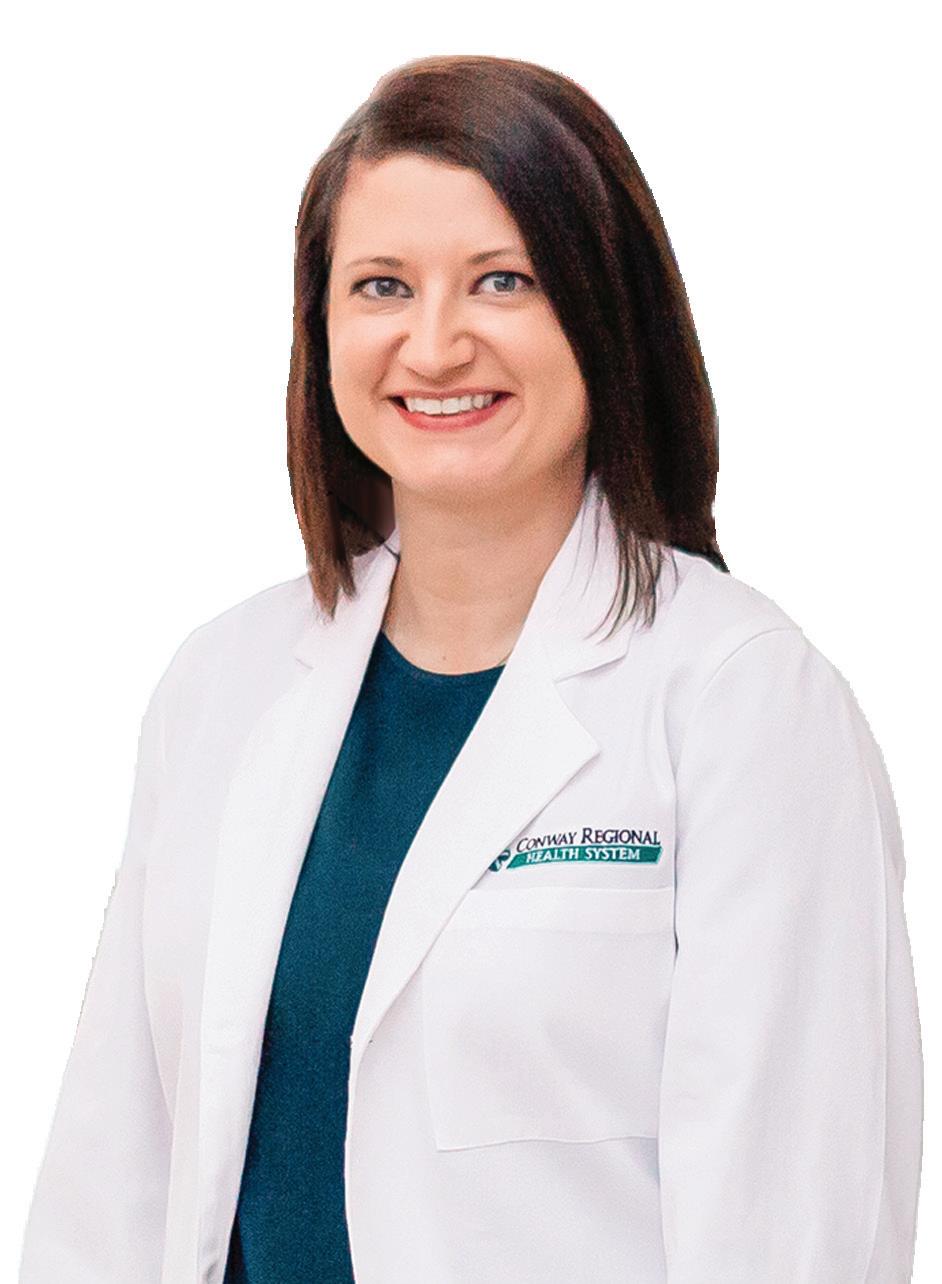
Led by Dawn Hughes, MD, and Stacey Johnson, APRN, our center offers care for women with complications found before conception, during pregnancy, and after birth. Each pregnant woman's journey is special, which is why our highly-skilled specialists collaborate with ob-gyns, neonatologists, and pediatricians to provide each patient with a unique, individualized care plan. Visit ConwayRegional.org




